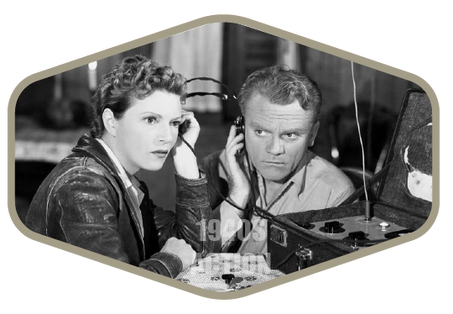“Yesterday, December 7, 1941—a date which will live in infamy—the United States of America was suddenly and deliberately attacked by naval and air forces of the Empire of Japan.” This famous line was delivered by President Franklin D. Roosevelt on December 8, the day after the devastating attack on Pearl Harbor. Just as any other era of Hollywood filmmaking, art imitates life – and no more so than the tumultuous years leading up to and including the duration of WWII.
With the world in warfare, Hollywood regained some lost footing in the years between 1943 and 1946. Filmmakers coordinated their efforts with Office of War Information (OWI), formed in 1942. This coordination produced patriotic, morale-boosting films, newsreels, and of course, the promotion of war bonds.
The “American Way of Life”, a central theme of Hollywood filmmakers in this era, drew a bold line between good and evil – with Germany and Japan portrayed as the proponents of evil. Several films of this era promoted this morality and became popular with moviegoers.
Toward the latter half of the decade, Hollywood was embroiled in an anticommunist hysteria. Originally established in 1938, the House Un-American Activities Committee (HUAC) purpose was to investigate alleged disloyalty and subversive activities and organizations with suspected fascist or communist ties.
The timing of HUAC’s rejuvenated focus coincided with the close of WWII and our growing fear and distrust of the Soviet Union. This had a profound effect on filmmaking with many directors and actors getting caught up in these “witch-hunts” and finding themselves either blackballed – or fear of being labeled a Communist. The seeds of fear were sown. Anticommunism, Cold War espionage, and fear of nuclear annihilation would become filmmaking fodder in the years to follow.
Noteworthy action-orientated actors in this genre: Errol Flynn, Humphrey Bogart, John Wayne, Conrad Veidt, Clark Gable, Randolph Scott, Van Johnson
With the world in warfare, Hollywood regained some lost footing in the years between 1943 and 1946. Filmmakers coordinated their efforts with Office of War Information (OWI), formed in 1942. This coordination produced patriotic, morale-boosting films, newsreels, and of course, the promotion of war bonds.
The “American Way of Life”, a central theme of Hollywood filmmakers in this era, drew a bold line between good and evil – with Germany and Japan portrayed as the proponents of evil. Several films of this era promoted this morality and became popular with moviegoers.
Toward the latter half of the decade, Hollywood was embroiled in an anticommunist hysteria. Originally established in 1938, the House Un-American Activities Committee (HUAC) purpose was to investigate alleged disloyalty and subversive activities and organizations with suspected fascist or communist ties.
The timing of HUAC’s rejuvenated focus coincided with the close of WWII and our growing fear and distrust of the Soviet Union. This had a profound effect on filmmaking with many directors and actors getting caught up in these “witch-hunts” and finding themselves either blackballed – or fear of being labeled a Communist. The seeds of fear were sown. Anticommunism, Cold War espionage, and fear of nuclear annihilation would become filmmaking fodder in the years to follow.
Noteworthy action-orientated actors in this genre: Errol Flynn, Humphrey Bogart, John Wayne, Conrad Veidt, Clark Gable, Randolph Scott, Van Johnson
ACTION & ADVENTURE FILMS OF THE 1940s
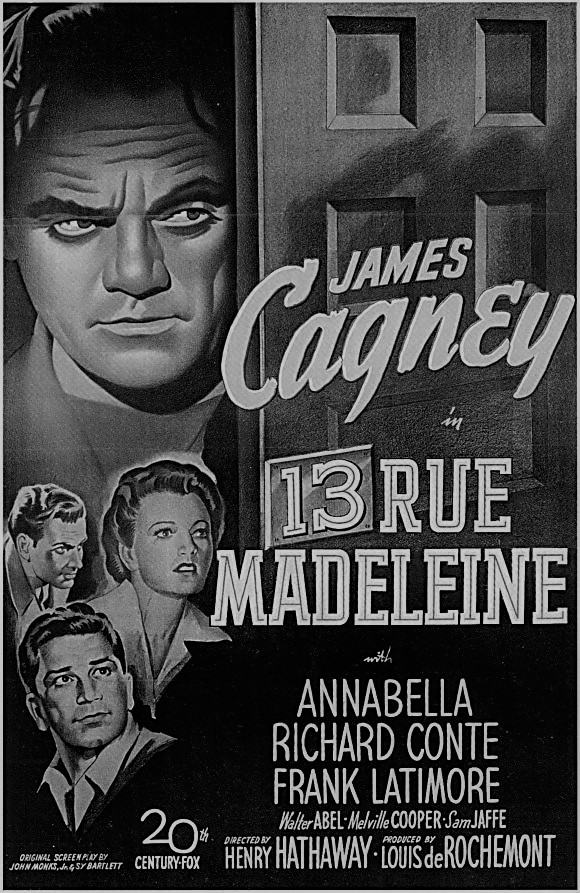 13 RUE MADELEINE (1946)
13 RUE MADELEINE (1946) (95 Min.) Genre: 1940 ACTION, Transfer Quality: A
This film is not only a revealing glimpse into the workings of the O.S.S. (Office of Strategic Services) during WW II, but it is also a full-fledged spy thriller. An excellent cast includes James Cagney, Karl Malden, E.G. Marshall, and Red Buttons. Cagney stars as an O.S.S. training officer, bent upon discovering a German traitor within his ranks while at the same time completing highly dangerous espionage assignments. The risks increase when one of his men is murdered from within, and Cagney, convinced he knows who the murdering infiltrator is, vows revenge. Authentic O.S.S. film footage make this film historically significant as well as entertaining. — All Movie Guide
Starring: James Cagney, Annabella, Richard Conte, Roland Belanger | Directed by: Henry Hathaway
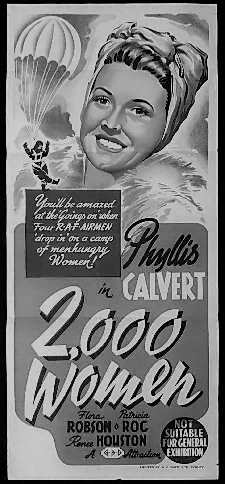 2000 WOMEN (1944)
2000 WOMEN (1944) (97 Min.) Genre: 1940 ACTION, Transfer Quality: A
The "2000 Women" of the film's title are the female inmates in a WW II German concentration camp in France. Though many of the women don't get along, they are united in their hatred for their Nazi captors. The story takes a truly melodramatic turn when three English airmen parachute into the camp, offering a ray of hope for those inmates planning an escape. Some of the humor is "black" indeed, involving a card-playing corpse and other questionable sources of laughter, but this was the sort of material that wartime audiences wanted. Heading the cast of 2000 Women are Phyllis Calvert, Flora Robson and Patricia Roc, fine British actresses all who overcome an abundance of script deficiencies. The film was the first production of Individual Pictures, formed by the producer-director-writer team of Frank Launder and Sidney Gilliat. — Hal Erickson
Starring: Phyllis Calvert, Flora Robson, Patricia Roc, Renee Houston | Directed by: Frank Launder
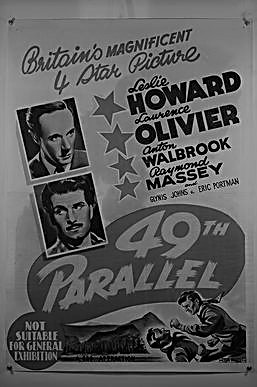 49TH PARALLEL, THE (1941)
49TH PARALLEL, THE (1941) (122 Min.) Genre: 1940 ACTION, Transfer Quality: A
49th Parallel is a British wartime entreaty for Empire solidarity, concentrating on rousing the patriotic fervor of the citizens of Canada. A group of Nazi naval officers and crewmen are stranded on Canadian soil (we have no sympathy for the castaways, inasmuch as we have just seen them refusing food and water to a group of torpedoed British seamen). Led by lieutenant Eric Portman, the Nazis try to stir up sympathy amongst the Canadians, beginning with apolitical Quebeckian trapper Laurence Olivier. Failing to convert Olivier—even by force—the Germans move on to a Hutterite farming community, where again they are unsuccessful in winning adherents (though, conversely, German seaman Niall Mac Ginnis defects to the other side). They then cross the path of professorial author Leslie Howard, who is living amongst the Indians to soak up "local color". Even Howard proves too formidable for the Nazis, and by film's end the surviving invaders are hiding out in a train, where they are discovered and captured by AWOL Canadian soldier Raymond Massey. Most TV viewers know 49th Parallel under its alternate title, The Invaders. — Hal Erickson
Starring: Leslie Howard, Raymond Massey, Laurence Olivier, Anton Walbrook, Glynis Johns | Directed by: Michael Powell
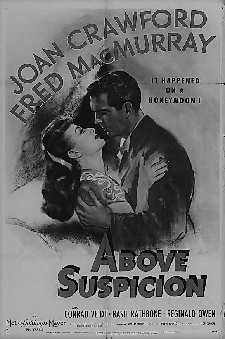 ABOVE SUSPICION (1943)
ABOVE SUSPICION (1943) (90 Min.) Genre: 1940 ACTION, Transfer Quality: A
If you believe all-American Fred MacMurray as an Oxford don, you'll probably swallow the rest of Above Suspicion. Newly married to Joan Crawford, MacMurray goes on a honeymoon in prewar Germany. Actually it's more business than pleasure: they are secret agents for the British, attempting to smuggle back information about a new superweapon being developed by the Nazis. Evil, mean, cruel and also wicked German officer Basil Rathbone imprisons and tortures Crawford (though she still looks like a million bucks), but McMurray comes to the rescue, paving the way for a suspenseful race-to-the-border climax. The tenor of Above Suspicion can be summed up in a scene in which, after being confronted by a monolingual stormtrooper, Fred MacMurray says in English "Nuts to you, dope!," whereupon the Nazi scratches his head and wonders aloud, "Vass iss das 'dope'?" — Hal Erickson
Starring: Joan Crawford, Fred MacMurray, Conrad Veidt, Basil Rathbone | Directed by: Richard Thorpe
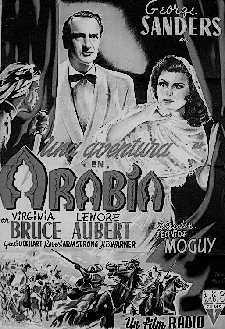 ACTION IN ARABIA (1944)
ACTION IN ARABIA (1944) (75 Min.) Genre: 1940 ACTION, Transfer Quality: A
Exiled from his own country during WW2, French filmmaker Leonide Moguy worked briefly in Hollywood, where he directed the patriotic thriller Action in Arabia. George Sanders stars as Gordon, an American newspaperman at large in Damascus. When a colleague is murdered, Sanders wants to find out why. He is helped along by glamourous secret agent Yvonne (Virginia Bruce), who is on the trail of a group of Nazi saboteurs. It turns out that the murder is tied in with a plan to destroy the Suez Canal in the name of Der Fuehrer. Though economically produced, Action in Arabia benefits from several rather spectacular-looking scenes of desert combat-most of these lifted from a never-finished 1933 filmed biography of Lawrence of Arabia. — Hal Erickson
Starring: George Sanders, Virginia Bruce, Lenore Aubert, Gene Lockhart | Directed by: Léonide Moguy
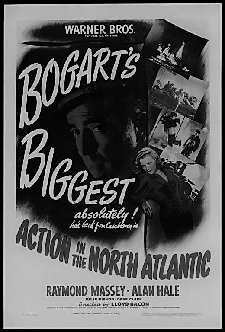 ACTION IN THE NORTH ATLANTIC (1943)
ACTION IN THE NORTH ATLANTIC (1943) (126 Min.) Genre: 1940 ACTION, Transfer Quality: A
Action in the North Atlantic is solid wartime propaganda with a rather endearing inner lining of left-wing politics, courtesy (no doubt) of scenarist John Howard Lawson, who based his screenplay on a novel by maritime specialist Guy Gilpatric. While running war goods to America's Russian allies, a merchant marine ship captained by Raymond Massey is torpedoed. The courage of Massey and his first mate Humphrey Bogart serves as an inspiration to the survivors, who manage to navigate their tiny lifeboat to America, where they are lauded as heroes. After only the briefest of compassionate leaves (Massey is reunited with wife Ruth Gordon, while Bogart strikes up a relationship with Julie Bishop), the crew is assigned a new Liberty Ship. Despite fears of being torpedoed again, Massey, Bogart, and the other men successfully bring their cargo to Russia, shooting down several German planes in the process. As the Americans are cheered on by the smiling, well-fed Russian seamen and peasants, Action in the North Atlantic fades out, with the voice of Franklin D. Roosevelt (actually radio announcer Art Gilmore) heard on the soundtrack encouraging a "United Nations" allegiance against the axis. The supporting cast of Action in the North Atlantic includes a young newcomer by the name of Bernard Zanville, whose billing was changed to "Dane Clark" upon the film's release. — Hal Erickson
Starring: Humphrey Bogart, Raymond Massey, Ruth Gordon, Alan Hale, Dane Clark | Directed by: Lloyd Bacon
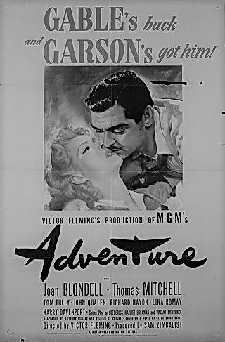 ADVENTURE (1945)
ADVENTURE (1945) (126 Min.) Genre: 1940 ACTION, Transfer Quality: A
A middle-aged Clark Gable returned from active duty in World War II to star in this MGM release that was heavily advertised as his big comeback. Gable is Harry Patterson, the bosun mate on a merchant marine vessel, a tough sailor and fighter with the proverbial girl in every port. But while in a San Francisco library, looking up a book on the human soul for his sidekick Mudgin (Thomas Mitchell), who thinks his soul has departed his body, Harry meets librarian Emily Sears (Greer Garson), whom he woos, marries, and leaves to sail off on another freighter. When he returns, Emily has retreated to an old farm to await the birth of their child. Harry continues to resent staying in one place, but he ultimately changes his tune when his baby's life hangs in the balance. Garson and Joan Blondell, playing her outspoken best friend, are both terrific, and Gable gives a less heroic performance that's a thoughtful change for him, although critics at the time were less than charitable. — Don Kaye
Starring: Clark Gable, Greer Garson, Joan Blondell, Thomas Mitchell, Audrey Totter | Directed by: Victor Fleming
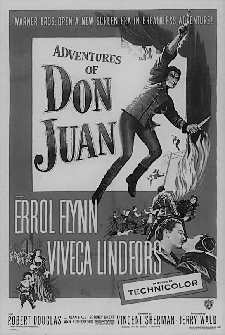 ADVENTURES OF DON JUAN (1948)
ADVENTURES OF DON JUAN (1948) (110 Min.) Genre: 1940 ACTION, Transfer Quality: A
Though Errol Flynn was well past his prime (and obviously well lubricated in certain scenes), he rises to the occasion of The Adventures of Don Juan with a spirited, athletic performance. As fabled Spanish swashbuckler/lover Don Juan, Flynn spends the early portions of the film romancing willing young ladies and dueling with jealous husbands. Spain's Queen Margaret (Viveca Lindfors) assigns Don Juan to head the royal fencing academy to keep him out of trouble. When scheming Duke de Lorca (Robert Douglas) plots to topple the monarchy, it is Don Juan's eager young fencing pupils who come to the rescue. Though a troubled production (filming was habitually halted due to Flynn's precarious physical condition and by constant changes and replacements in production personnel),The Adventures of Don Juan moves swiftly and enjoyably from start to finish, abetted by a rousing, semi-satirical Max Steiner musical score, which has since been heard in such 1980s films as Zorro, the Gay Blade and Goonies. Incidentally, Errol Flynn is doubled in the famous leap from the head of a long staircase by stunt expert Jock Mahoney. — Hal Erickson
Starring: Errol Flynn, Viveca Lindfors, Robert Douglas, Alan Hale, Ann Rutherford, Raymond Burr | Directed by: Vincent Sherman
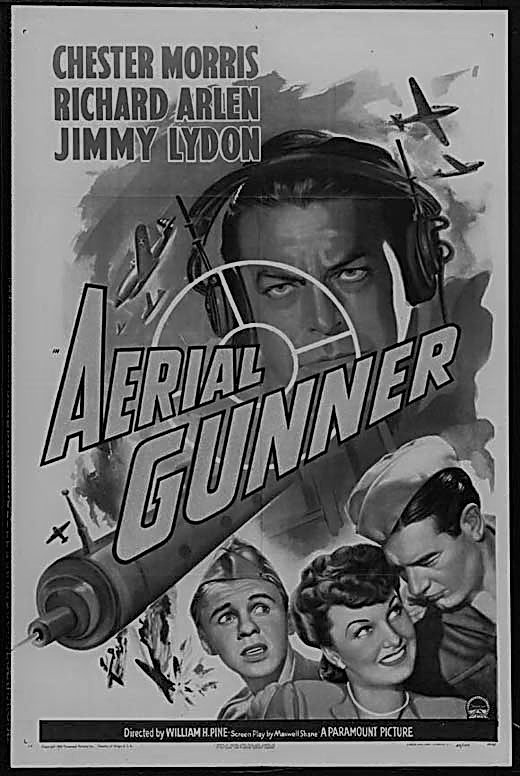 AERIAL GUNNER (1943)
AERIAL GUNNER (1943) (78 Min.) Genre: 1940 ACTION, Transfer Quality: B
A wounded aerial gunner tells his story in this wartime propaganda film. He begins with his recruitment and basic training before the war. There he discovers that his sergeant is one of his foes, and that both of them are fighting for the affection of the lovely sister of a fellow recruit who becomes terrified of flying and suffers a plane crash during training. Eventually all is overcome and the new squadron prepares to fly for the South Pacific. The two rivals end up landing on an island overrun by Japanese troops. They frantically try to repair their downed plane. Later the brave sergeant sacrifices his life to save his rival who takes off and somehow makes it back to safety.
Starring: Chester Morris, Richard Arlen, Lita Ward, Dick Purcell | Directed by: William Pine
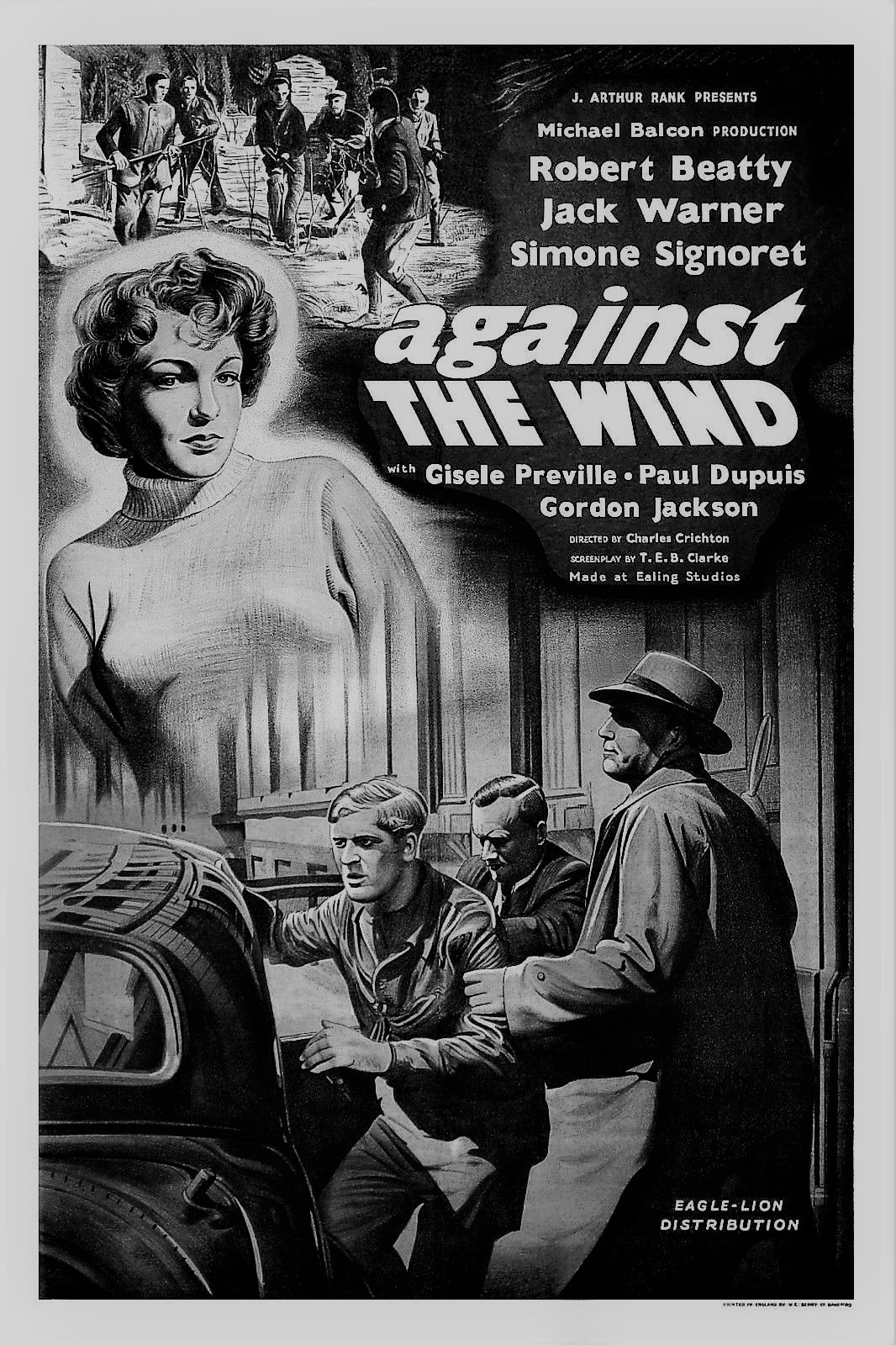 AGAINST THE WIND (1948)
AGAINST THE WIND (1948) (96 Min.) Genre: 1940 ACTION, Transfer Quality: A
Set in World War II times, this drama involves a highly trained bunch of British soldiers who must parachute into Nazi-held Belgium on a rescue and destroy mission. Documentary film footage is included in the early parts of the film as the trainees get prepared for the task ahead. Robert Beatty plays the priest, Father Phillip, and Simone Signoret appears as an insurgent who falls in love with another of the trained resistors.
Starring: Robert Beatty, Simone Signoret, Jack Warner, Gordon Jackson, James Robertson Justice | Directed by: Charles Crichton
 AIR FORCE (1943)
AIR FORCE (1943) (124 Min.) Genre: 1940 ACTION, Transfer Quality: A
On December 6, 1941, a squadron of nine B-17 bombers takes off for Hickam Field, HI. The crew of the Mary Ann, including two new men, assistant radio man Private Chester (Ray Montgomery) and gunner Sergeant Joe Winocki (John Garfield), assembles for the flight, and in the first 20 minutes, the movie reveals certain things about the crew: the shadowy past of one, the mother of another, and the wife of a third; two of them are good friends with the sister of McMartin (Arthur Kennedy), the bombardier, who lives in Honolulu; the son of the senior member of the crew, Sgt. White (Harry Carey Sr.), is a pilot stationed at Clark Field in the Philippines. Then more characters make entrances: the aircraft commander Quincannon (John Ridgely); Weinberg (George Tobias), a Jewish mechanic from New York; and a man from a farm in the upper Midwest — they all represent a broad cross-section of America as it saw itself, and the "regular guys" in the Army Air Force as it existed in 1941. The flight proceeds without incident. Winocki, an embittered, washed-out flight school candidate who accidentally killed another pilot, is about to leave the service when the weather report from Hickam Field is interrupted, and the radio man begins picking up transmissions in Japanese. The Mary Ann and the rest of the squadron fly right into the middle of the Japanese attack on Pearl Harbor unarmed and out of gas, and nearly crack up landing on an emergency field; no sooner do they make repairs than the crew comes under attack, and the plane takes off and makes for Hickam Field, which they find a flaming shambles. They fly on to the Philippines, stopping at Wake Island just long enough to meet a few members of the doomed Marine garrison, taking their company mascot, a dog, with them. At Clark Field, the Mary Ann and her crew finally go into action against the enemy, flying in alone against a Japanese invasion force; Quincannon is mortally wounded in the brief action, which leaves the plane damaged seemingly beyond repair. The remaining crew won't give up the plane, however, even when ordered to abandon and destroy her; they get the bomber off just ahead of the advancing Japanese, and survive to help bring retribution to the invading fleet and the Japanese empire. — Bruce Eder
Starring: John Garfield, John Ridgely, Gig Young, Arthur Kennedy, Faye Emerson | Directed by: Howard Hawks
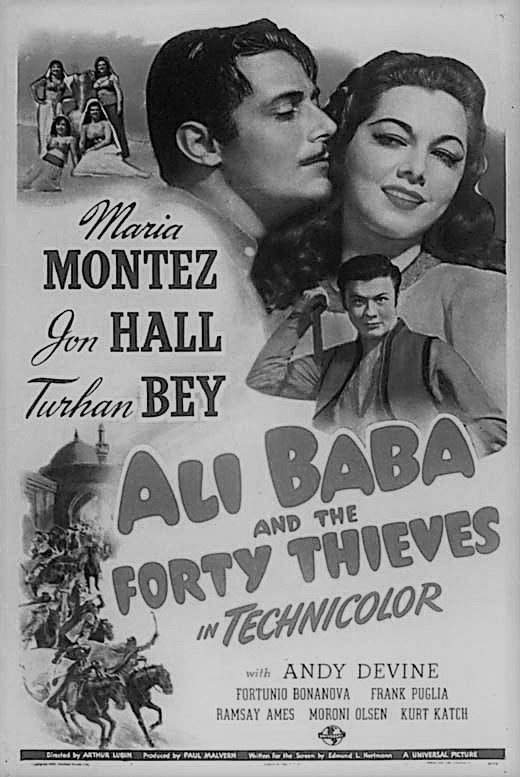 ALI BABA AND THE FORTY THIEVES (1943)
ALI BABA AND THE FORTY THIEVES (1943) (87 Min.) Genre: 1940 ACTION, Transfer Quality: B
The general perception of the Technicolor costume adventure movies that Maria Montez and Jon Hall made for Universal in the early 1940's is that they were pure escapist entertainment, intended to make people forget for an hour or so about the Second World War and the general world situation. And generally that is true about them — they were mostly no "about" much more than having fun for 90 minutes or so amid pretty sets with lots of action and some pretty women in exotic outfits. But watching Ali Baba and the Forty Thieves, one has to wonder if even here the screenwriter, Edmund L. Hartmann, was able to totally get away from the day-to-day reality around him. The opening Mongol invasion of Bagdad and the murder of the old Caliph (Moroni Olsen) while trying to set up a government-in-exile without thinking of the German and Japanese conquests and occupations of various nations that would have been going on at the time; additionally, the fact that the old Caliph is murdered with the help of a traitor in his own noble ranks — a "quisling" in the term coined during World War II — wouldn't have been missed by audiences at the time. Further, the screenplay very specifically paints the forty thieves as heroes who have gone from being criminals to an active resistance force against the occupying Mongols — indeed, at the denouement, their invasion of the palace is greeted as a day of liberation by the people of Bagdad. The movie walks a strange tightrope, casting about veiled topical references of that sort, even as is otherwise sufficiently tongue-in-cheek to cast Andy Devine as a desert bandit. Obviously, Ali Baba And The Forty Thieves was sold as — and mostly intended as — light entertainment, but just below that glitzy Technicolor surface were some fascinating allusions to the real world. None of this stops Ali Baba And The Forty Thieves from being immense fun — it is, even if the "fun" isn't totally escapist in nature — and it's great to look at as well, even 60 years on; Universal has apparently kept preservation-quality source materials on this and Hall and Montez's other Technicolor costume romps. And this particular entry in that group of movies also contains one very instructive clue to the morays and censorship of the time in one scene, in which the hero meets the heroine bathing at an oasis — the makers seem to have been forced to insert a particular shot that is there for no other reason then to make it clear that she is not totally naked when he sees her.
Starring: Jon Hall, Maria Montez, Turhan Bey, Andy Devine | Directed by: Arthur Lubin
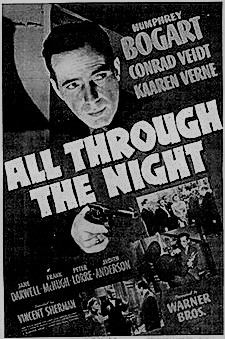 ALL THROUGH THE NIGHT (1942)
ALL THROUGH THE NIGHT (1942) (107 Min.) Genre: 1940 ACTION, Transfer Quality: A
Humphrey Bogart plays Gloves Donahue, a rough-hewn but essentially decent New York gambler. The Runyonesque plot gets moving when Gloves tries to find out what's holding up his favorite restaurant's daily shipment of cheesecake. Paying a call on the bakery, Gloves stumbles into a Nazi spy ring, masterminded by Conrad Veidt. Mixed up in all this is nightclub singer Kaaren Verne, whose loyalties are in question in her early scenes but who turns out to be as true-blue as the patriotic Gloves. Combining a quick wit with quicker fists, Gloves and his "mob" thwart the Nazis before they're able to skip the country. The cast is a movie buff's dream, ranging from Jane Darwell as Bogart's mom to Peter Lorre as a cynical Nazi flunkey to William Demarest, Frank McHugh, Phil Silvers and Jackie Gleason as Bogie's favorite cohorts. The film's best scene would have us believe that Bogart could confound a gang of erudite Nazis with a steady stream of Manhattan slang. One shudders to think how leaden All Through the Night would have been had George Raft accepted the role of Gloves Donahue. — Hal Erickson
Starring: Humphrey Bogart, Conrad Veidt, Kaaren Verne, Peter Lorre, Jackie Gleason, Frank McHugh | Directed by: Vincent Sherman
(66 Min.) Genre: 1940 ACTION, Transfer Quality: A
When MGM made a program western, it generally looked more expensive than an entire years' sagebrusher output at Monogram or PRC. MGM's Apache Trail stars Lloyd Nolan and William Lundigan as two gun-slinging brothers endeavoring to save a group of stagecoach passengers from surly Indians. The Apaches demand that the brothers turn over a crooked Indian agent who has been breaking treaties and selling whiskey with impunity, but Nolan and Lundigan won't do it, insisting that the miscreant be dealt with by the White Man's law. American-as-Cherry-Pie Donna Reed is herein cast as "Rosalia Martinez"! Based on a story by Ernest (Stagecoach) Haycox, Apache Trail was remade in Technicolor as Apache War Smoke. — Hal Erickson
Starring: Lloyd Nolan, Donna Reed, William Lundigan, Ann Ayars | Directed by: Richard Thorpe
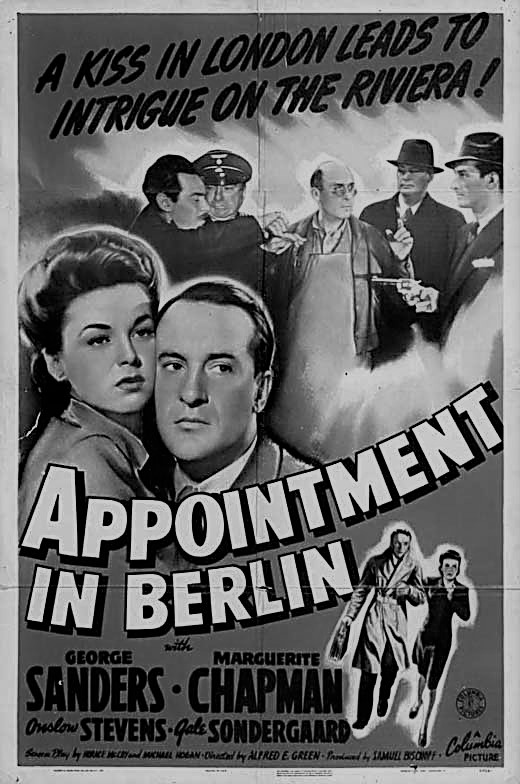 APPOINTMENT IN BERLIN (1943)
APPOINTMENT IN BERLIN (1943) (77 Min.) Genre: 1940 ACTION, Transfer Quality: C
This wartime melodrama stars George Sanders as Keith Wilson, a disillusioned Britisher who becomes a "Lord Haw Haw"type at a Nazi radio station. All the time he's dispensing anti-British propaganda over the airwaves, however, Wilson is actually a secret agent in the employ of the His Majesty's government. It is Wilson's intention to use his intimate relationship with the Germans to expose a worldwide Nazi spy ring. Romance enter the picture in the form of Ilse Preissing (Marguerite Chapman), the sister of a Nazi agent whose decision to join Wilson's side results in her death. Veteran movie villainess Gale Sondergaard also appears in the film, cast against type as a courageous British intelligence agent.
Starring: George Sanders, Marguerite Chapman, Onslow Stevens, Gale Sondergaard | Directed by: Alfred E. Green
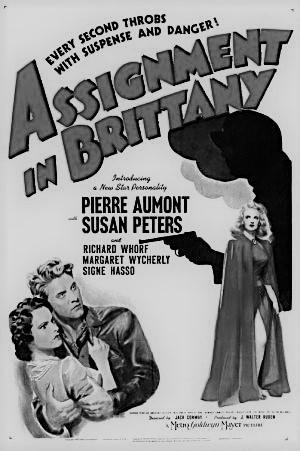 ASSIGNMENT IN BRITTANY (1943)
ASSIGNMENT IN BRITTANY (1943) (94 Min.) Genre: 1940 ACTION, Transfer Quality: A
Jean-Pierre Aumont (billed simply as Pierre Aumont) makes his American film debut in Assignment in Brittany. Set during WW2, the film casts Aumont as Free French captain Metard, who bears a remarkable resemblance to Bertrand Conlay, a prisoner of the Allies whom is suspected of being a fifth columnist. Posing as Conlay, Metard gains the confidence of the Nazi occupiers of Brittany. He plays his part to the hilt, even unto romancing Conlay's patriotic girlfriend Anne Pinot (Susan Peters). This being a standard-issue "underground" melodrama, the film ends with a life-and-death contretemps with the Nazis, excitingly staged by director Jack Conway. Assignment in Brittany is based on the best-selling novel by Helen Macinnes. — Hal Erickson
Starring: Jean-Pierre Aumont, Susan Peters, Richard Whorf, Margaret Wycherly, George Coulouris | Directed by: Jack Conway
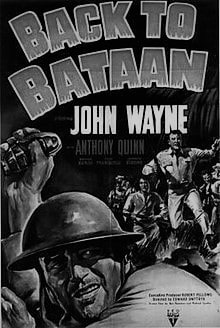 BACK TO BATAAN (1945)
BACK TO BATAAN (1945) (95 Min.) Genre: 1940 ACTION, Transfer Quality: A
Edward Dmytryk's Back to Bataan stars John Wayne as Colonel Joe Madden. After General MacArthur decides to leave the Philippians, Madden agrees to stay behind and organize an underground resistance movement. Anthony Quinn plays Andres Bonifacio, a captain who falls in love with a local woman (Fely Franquelli) who helps the army keep their rag-tag forces as organized as possible. Bonifacio must also deal with the pressure of being the grandson of a beloved Filipino leader. — Perry Seibert
Starring: John Wayne, Anthony Quinn, Beulah Bondi, Fely Franquelli | Directed by: Edward Dmytryk
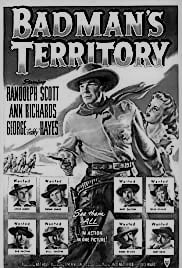 BADMAN'S TERRITORY (1946)
BADMAN'S TERRITORY (1946) (94 Min.) Genre: 1940 ACTION, Transfer Quality: A
In this is '40s western a U.S. marshal chases a band of big-name bandits into no-man's territory (land outside of U.S. government jurisdiction) as he's trying to locate his little brother. He ends up facing off with none other than the James Boys, the Daltons and other notorious fellows. Badman's Territory proved so successful that the formula was repeated several times by RKO and other studios. — All Movie Guide
Starring: Randolph Scott, Ann Richards, George "Gabby" Hayes, Ray Collins | Directed by: Tim Whelan
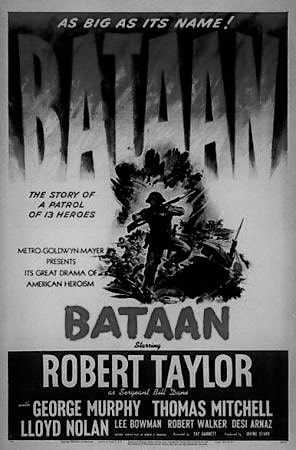 BATAAN (1943)
BATAAN (1943) (114 Min.) Genre: 1940 ACTION, Transfer Quality: A
In 1942, Metro-Goldwyn-Meyer and the United States Office of War Information collaborated on Bataan with the official goal to increase public understanding of World War II. The first war film to take place entirely on the battlefield — with no scenes of the soldiers on leave, depictions of the home front, or flashbacks to pre-war civilian life — Bataan prepared its wartime audience for American casualties. Its Alamo-esque storyline emphasized the value of such sacrifice and its diverse group of soldiers —compiled of all ranks, races, classes, ages, and creeds — portrayed this effort as the duty of all men. It is a depiction of altruism and national unity that both inspired public support of the War and served as the template for World War II films throughout the forties and into the present. — Aubry Anne D'Arminio
Starring: Robert Taylor, Thomas Mitchell, George Murphy, Lloyd Nolan | Directed by: Tay Garnett
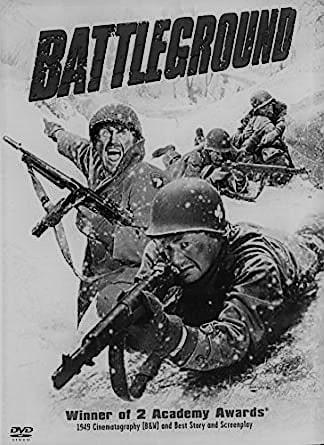 BATTLEGROUND (1949)
BATTLEGROUND (1949) (119 Min.) Genre: 1940 ACTION, Transfer Quality: A
Incoming MGM production head Dore Schary ramrodded Battleground into the studio's schedule over the virulent protests of MGM boss Louis Mayer. The result was an award-winning box-office hit, as well as the beginning of the end of Mayer's power. This dramatization of the battles of Bastogne and the Bulge in the waning days of World War 2 concentrates on a single infantry unit. Van Johnson and John Hodiak are the ostensible stars, but the film is stolen by James Whitmore as the cigar-chomping, battle-stained sergeant. Also appearing is Ian MacDonald as General McAuliffe, whose legendary response to the Nazi's suggestion that the Americans surrender consisted of a single four-letter expletive: "Nuts". Whitmore's final scenes of near-delirium before the relief troops arrive are unforgettable. Battleground tries within MGM limits to be wholly realistic, though it is slightly compromised by the scripters' inability to use Army profanity, and by pointless subplot involving actress Denise Darcel. The film doesn't hold up as well as such wartime efforts as The Story of GI Joe or Walk in the Sun, but in 1949 Battleground was regarded as an important milestone in the field of truthful, de-glamorized combat flicks. Please avoid the colorized version: this is a black-and-white subject if ever there was one. — Hal Erickson
Starring: Van Johnson, John Hodiak, Ricardo Montalban, George Murphy | Directed by: William Wellman
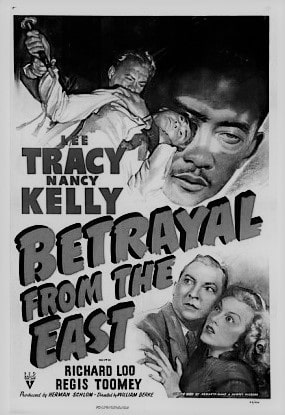 BETRAYAL FROM THE EAST (1945)
BETRAYAL FROM THE EAST (1945) (82 Min.) Genre: 1940 ACTION, Transfer Quality: A
With famed journalist Drew Pearson appearing in the film's prologue and epilogue, it was easy in 1945 to confuse Betrayal from the East with Real Life. Lee Tracy is once again cast as a seemingly disreputable type with a heart of gold, in this case an expatriate ex-GI named Eddie. Believing that he'd be willing to sell out his country, a Japanese spy ring approach Eddie and ask him to get his hands on secret American war plans. But Eddie is still a true-blue Son of Uncle Sam; at the behest of Army Intelligence, Eddie agrees to play counterspy, using dictaphones, phony messages and other such devices to pull the wool over the enemy's eyes. The results aren't very pretty for either Eddie or his fellow counterspy Peggy (Nancy Kelly), though the audience can take some comfort in the fact that their sacrifice was for the good of Democracy. Fairly slow going during most of its 82 minutes, Betrayal From the East comes to a startling conclusion as Peggy suffers mightily at the hands of her Japanese captors. — Hal Erickson
Starring: Lee Tracy, Nancy Kelly, Richard Loo, Abner Biberman | Directed by: William A. Berke
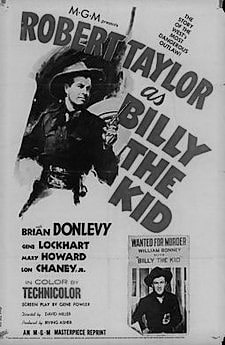 BILLY THE KID (1941)
BILLY THE KID (1941) (94 Min.) Genre: 1940 ACTION, Transfer Quality: A
The famous outlaw rides again in this fictionalized western that chronicles Billy's turn from criminal to fine upstanding citizen. The film received an Oscar nomination for its color cinematography. — Sandra Brennan
Starring: Robert Taylor, Brian Donlevy, Ian Hunter, Gene Lockhart | Directed by: David Miller
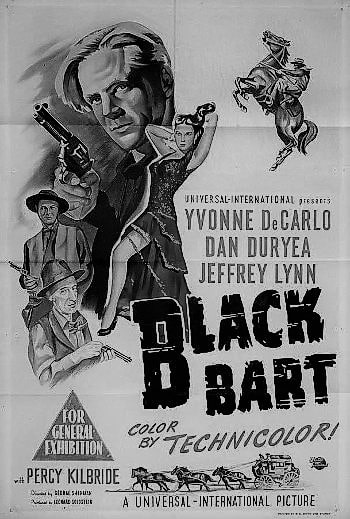 BLACK BART (1948)
BLACK BART (1948) (80 Min.) Genre: 1940 ACTION, Transfer Quality: B
Worthless as history, Black Bart is nonetheless an enjoyable fabrication about the fabled western outlaw. Rescued from a "necktie party", outlaws Charles E. Boles (Dan Duryea) and Lance Hardeen (Jeffrey Lynn) decide that it would be best to part friends and go their separate ways. When next seen, Boles is a prosperous rancher who supplements his income by robbing the Well Fargo gold shipments under the alias of Black Bart. Upon learning this, Hardeen rides back into Boles' life demanding a piece of the action. Both of the hero-villains are foiled when they succumb to the charms of the bewitching international courtesan Lola Montez (Yvonne DeCarlo). The story is related in flashback-from a jail cell-by the outlaws' erstwhile partner Jersey Brady (Percy Kilbride). Obviously forgotten or ignored by the screenwriters was the fact that the actual Black Bart was really black, an ex-slave who "made bad" in the wild west . Black Bart was remade in 1967 as Ride to Hangman's Tree.
Starring: Yvonne De Carlo, Dan Duryea, Jeffrey Lynn, Percy Kilbride, Frank Lovejoy | Directed by: George Sherman
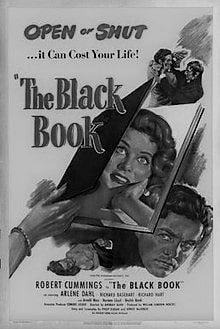 BLACK BOOK, THE (1949)
BLACK BOOK, THE (1949) (89 Min.) Genre: 1940 ACTION, Transfer Quality: A
Also known as Reign of Terror, The Black Book is a bold effort by director Anthony Mann to film a French Revolution epic on a "B" detective picture budget. Robert Cummings stars as Charles D'Aubigny, who has been engaged by a group of political moderates to retrieve a little black book from Revolutionary leader Robespierre (Richard Basehart). The book allegedly contains evidence that Robespierre has been acting in his own interest rather than on behalf of the new government. D'Aubigny is compelled to deal with the tangible threat of Robespierre's chief henchman (Charles McGraw) as well as his uncertainty concerning the loyalties of those working with him. The Black Book is retrieved, but not before Robespierre has self-destructed on his own. The cheapness of The Black Book works in its favor, especially its overuse of shadows; while this photographic device was intended to disguise the seediness of the sets, it accurately conveys a "dark" period in French history that here is literally as well as figuratively dark. — Hal Erickson
Starring: Robert Cummings, Arlene Dahl, Arnold Moss, Richard Basehart, Charles McGraw | Directed by: Anthony Mann
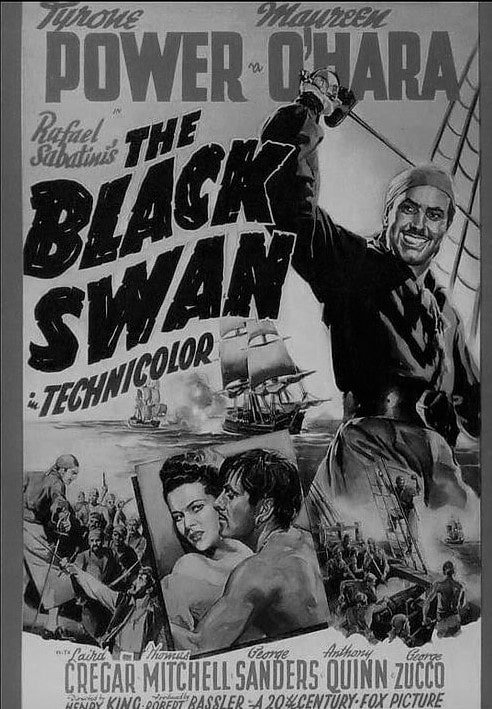 BLACK SWAN, THE (1942)
BLACK SWAN, THE (1942) (85 Min.) Genre: 1940 ACTION, Transfer Quality: A
Perhaps unintentionally, the 1942 Technicolor swashbuckler The Black Swan is a bondage fetishist's dream, with hero and heroine Tyrone Power and Maureen O'Hara taking turns being tied up and imprisoned throughout the film's brisk 85-minute running time. Very loosely adapted by Ben Hecht and Seton I. Miller from a novel by Rafael Sabatini, the film casts Power as rogueish, hot-tempered buccaneer Jamie Waring, who considers the day wasted when he hasn't sacked a Spanish galleon or plundered a rich coastal town. Jamie's partner in crime is pirate king Henry Morgan Laird Cregar, an alliance that comes to an end when Morgan is appointed governor of Jamaica. Disgusted by this defection, Jamie considers joining the scurrilous Redbeard George Sanders, but eventually decides to reform his ways when he falls in love with Margaret Denby Maureen O'Hara, the gorgeous daughter of the former Jamaican governor Lord Denby George Zucco. Before the final obligatory sail into the sunset, however, Margaret is kidnapped and manhandled on a seemingly hourly basis, while Jamie is subjected to even more abuse at the hands of pirates and officials alike. Henry King handles the derring-do in Black Swan with commendable sobriety, leaving the story's tongue-in-cheek elements in the capable hands of the cast and the screenwriters. — Hal Erickson
Starring: Tyrone Power, Maureen O'Hara, Laird Cregar, Thomas Mitchell, George Sanders | Directed by: Henry King
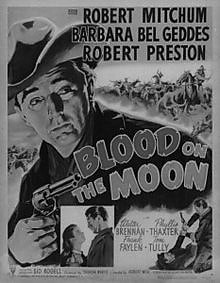 BLOOD ON THE MOON (1949)
BLOOD ON THE MOON (1949) (88 Min.) Genre: 1940 ACTION, Transfer Quality: A
One of the best "psychological" westerns of the 1940s, RKO Radio's Blood on the Moon stars Robert Mitchum as itinerant cowboy Jim Garry. Riding into a Texas Indian reservation, Garry finds himself embroiled in a deadly feud between cattle ranchers and homesteaders. He befriends both Amy Lufton (Barbara Bel Geddes), daughter of wealthy cattle man John Lufton (Tom Tully), and smooth-talking mercenary Tate Rilling (Robert Preston). What neither Garry nor Amy realize is that Rilling is a snake, conspiring with crooked Indian agent Jake Pindalest (Frank Faylen) to make off with Lufton's cattle. At first aligning himself with Rilling, Garry finally figures out that his so-called friend is up to no good and casts his lot with Lufton, leading to a bloody showdown. Based on the novel by Luke Short, Blood on the Moon was given top-grade treatment by director Robert Wise, an alumnus of RKO Radio's editing department. — Hal Erickson
Starring: Robert Mitchum, Barbara Bel Geddes, Walter Brennan, Robert Preston, Charles McGraw | Directed by: Robert Wise
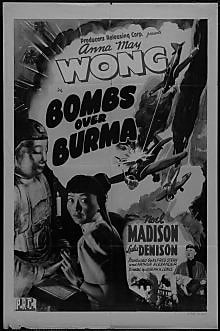 BOMBS OVER BURMA (1942)
BOMBS OVER BURMA (1942) (67 Min.) Genre: 1940 ACTION, Transfer Quality: B
Of the two PRC Anna May Wong vehicles filmed during the 1942-43 season, Bombs Over Burma is marginally the best, thanks to the cinematic savvy of writer-director Joseph H. Lewis. Relying more on strong visuals than clever dialogue, the film details the contributions of the courageous Chinese guerilla fighters in keeping the Burma Road safe for Allied transport vehicles during WW2. During the arduous construction of the serpentine thoroughfare, a number of Chinese workers are killed by a mysterious saboteur. It turns out that the assailant is English nobleman Sir Roger Howe (Leslie Denison), who is actually a Nazi agent. Chinese schoolteacher Lin Yung (Anna May Wong) is the freedom fighter responsible for the unmasking and ultimate destruction of the duplicitous Sir Roger (the villain's death scene is the film's hands-down highlight).
Starring: Anna May Wong, Noel Madison, Leslie Denison, Ned Young | Directed by: Joseph H. Lewis
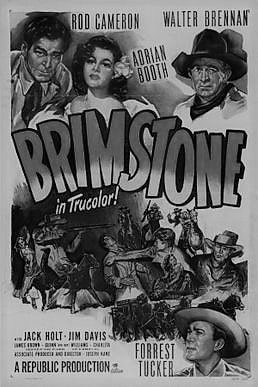 BRIMSTONE (1949)
BRIMSTONE (1949) (90 Min.) Genre: 1940 ACTION, Transfer Quality: A
The age-old enmity between cattle ranchers and settlers once again takes center stage in this slightly above-average Western filmed in Republic Pictures' Trucolor system. Walter Brennan plays Pop "Brimstone" Courteen, an ornery rancher who avenges the loss of the free range by robbing stagecoaches and banks. The Courteen gang, which also includes Pop's three sons, Nick (Jim Davis), Luke (Jack Lambert), and the reluctant Bud (James Brown), gets a bit of competition from The Ghost, a mystery outlaw who really is Marshal Johnny Tremaine (Rod Cameron). Tremaine's undercover investigation leads to McIntyre (Forrest Tucker), the sheriff of Gunsight, who is in the employ of the Courteens. In love with Molly Bannister (Adrian Booth), a settler, Bud turns against his ruthless family, but will Tremaine be able to save the boy from his father's wrath?
Starring: Rod Cameron, Adrian Booth, Walter Brennan, Forrest Tucker | Directed by: Joseph Kane
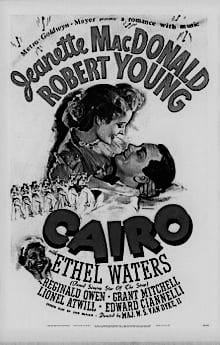 CAIRO (1942)
CAIRO (1942) (101 Min.) Genre: 1940 ACTION, Transfer Quality: A
Written by real-life intelligence agent Ladislas Fodor, Cairo is both a spoof of espionage thrillers and a good-natured refutation of Jeanette MacDonald's established screen image (it was her last film on her MGM contract). MacDonald plays wisecracking movie star Marcia Warren, who while "between pictures" in London hires fellow American Homer Smith (Robert Young) as her butler. What Marcia doesn't know is that Smith is an American newspaperman, who strongly suspects that our heroine is a Nazi spy (the real enemy agent is played by Mona Barrie, who looks not at all like dear Marcia). All such misunderstandings are forgotten once the principal characters end up in Cairo, with Marcia and her maidservant Cleona (Ethel Waters) pitching in to help Smith break up an Axis espionage ring. There are "in jokes" aplenty in Cairo, ranging from Jeanette MacDonald's flippant reference to her 1936 film hit San Francisco to the "it's only a movie, folks" closing shot. The music isn't bad, either
Starring: Jeanette MacDonald, Robert Young, | Directed by: W.S. Van Dyke
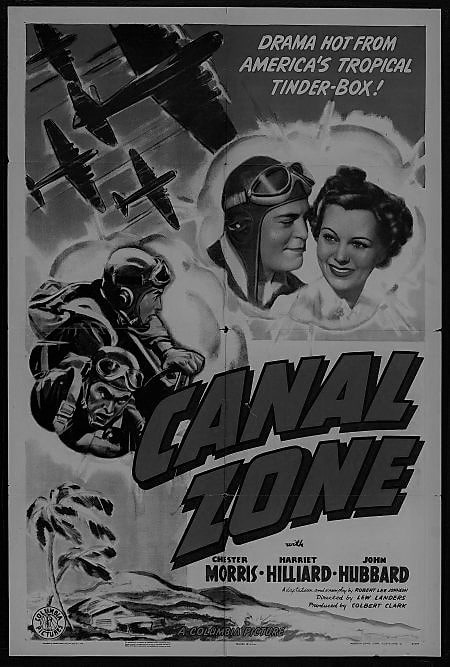 CANAL ZONE (1942)
CANAL ZONE (1942) (79 Min.) Genre: 1940 ACTION, Transfer Quality: B
Another timely entry from the Columbia assembly line, Canal Zone stars Chester Morris as flight instructor "Hardtack" Hamilton (his nickname sums up his personality with sublime perfection). Our hero's students will eventually help ferry bombing planes across the Atlantic-with the possible exception of stuck-up civilian pilot Harley Ames (John Hubbard), who shows no signs of acquiring discipline and responsibility. When the chips are down, however, Ames proves he's got the Right Stuff, rescuing Hardtack after a particularly nasty plane crash. The heroine is Harriet Hilliard, later beloved by millions as one-half of TV's "Ozzie and Harriet", while one of the pilots is portrayed by future Jolson Story star Larry Parks.
Starring: Chester Morris, Larry Parks, Forrest Tucker, Lloyd Bridges | Directed by: Lew Landers
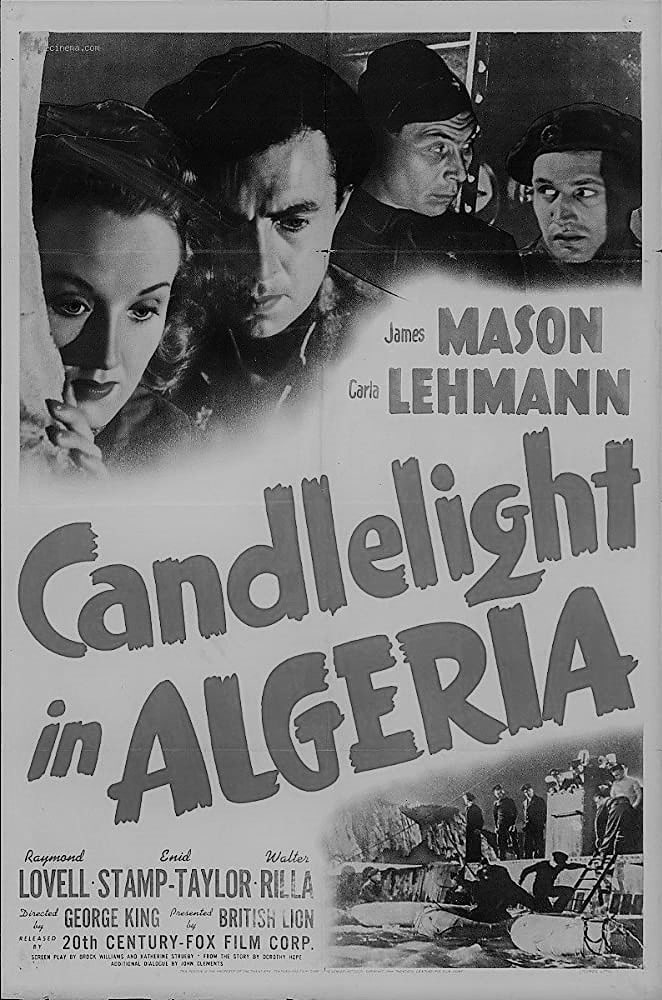 CANDLELIGHT IN ALGERIA (1944)
CANDLELIGHT IN ALGERIA (1944) (85 Min.) Genre: 1940 ACTION, Transfer Quality: B
Fact, fiction and espionage are combined in this drama that follows the exploits of Eisenhower's top aide, Mark Clark, and other important Allies as they journey to an important meeting held on Algeria's coast. The precise location of this vital secret gathering is upon a piece of film which must not fall into enemy hands, lest the Allied honchos get captured. The film is hidden in a German colony in Algiers. It is up to one of Britains top spies to bring it to safety. He is hindered by a Nazi spy who follows him. He is assisted by an American woman and a French woman. They are successful and gun-play ensues as they try to flee the country.
Starring: James Mason, Carla Lehmann, Raymond Lovell, Enid Stamp Taylor | Directed by: George King
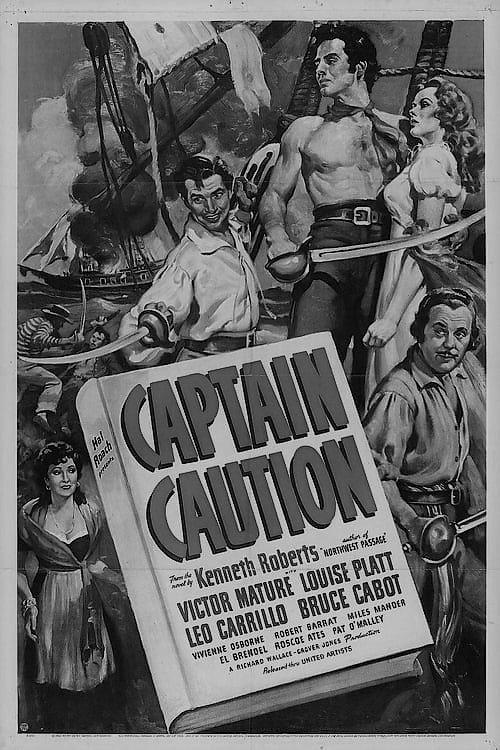 CAPTAIN CAUTION (1940)
CAPTAIN CAUTION (1940) (84 Min.) Genre: 1940 ACTION, Transfer Quality: A
Set during the war of 1812, Hal Roach's Captain Caution is an unusual swashbuckler in that the "hero" is actually the heroine. Louise Platt plays Corunna, the daughter of Captain Dorman (Robert Barrat), skipper of the American vessel The Olive Branch. When Dorman is killed in battle, Corunna courageously assumes command of the ship, with the help of muscular first mate Dan Marvin (Victor Mature). While trying to bring a valuable cargo to America, the Olive Branch is captured a number of times by the British, but on each occasion Corunna and Marvin manage to wriggle free and carry on their mission. Making life tougher for Corunna is the presence of the lacivious Slade (Bruce Cabot), who'd like to claim both the girl and the ship as his own personal property. Based on a novel by Kenneth Roberts (Northwest Passage), Captain Caution is currently available on video in a computer-colorized version; the reader is advised to hold out for the black-and-white original.
Starring: Victor Mature, Louise Platt, Leo Carrillo, Bruce Cabot, Alan Ladd | Directed by: Richard Wallace
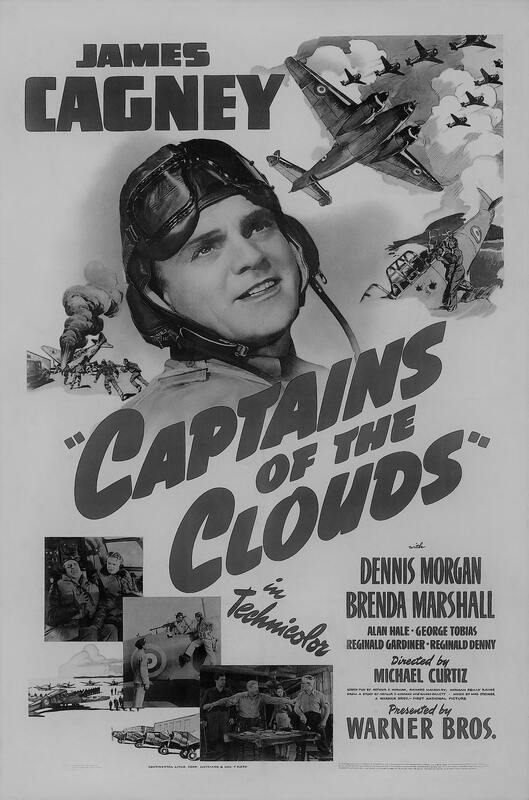 CAPTAINS OF THE CLOUDS (1942)
CAPTAINS OF THE CLOUDS (1942) (118 Min.) Genre: 1940 ACTION, Transfer Quality: A
James Cagney made his first Technicolor appearance in the morale-boosting aviation flick Captains of the Clouds. Cagney plays Brian MacLean, a hotshot Canadian bush pilot who delights in stealing jobs-and women-away from his competitors. Brian is forced to shape up in a hurry when he's assigned to train other pilots for the Royal Canadian Air Force. At the ending of the training period, he is given his first real RCAF assignment: The seemingly unimportant task of shepherding American bomber planes across the Atlantic to England. With startling suddenness, Brian comes to realize the true importance of his job when he is forced into a deadly confrontation with a fleet of Nazi raider planes. Real-life Canadian WW1 flying ace Billy Bishop plays a small but pivotal role in Captains of the Clouds, while the leading-lady duties were handled by Warner Bros. stock actress Brenda Marshall (aka Mrs. William Holden). Cinematographer Sol Polito earned an Oscar nomination for his vivid color photography, though aerial photographers Elmer Dyer, Charles Marshall and Winston Hoch were certainly just as deserving. — Hal Erickson
Starring: James Cagney, Dennis Morgan, Brenda Marshall, Alan Hale | Directed by: Michael Curtiz
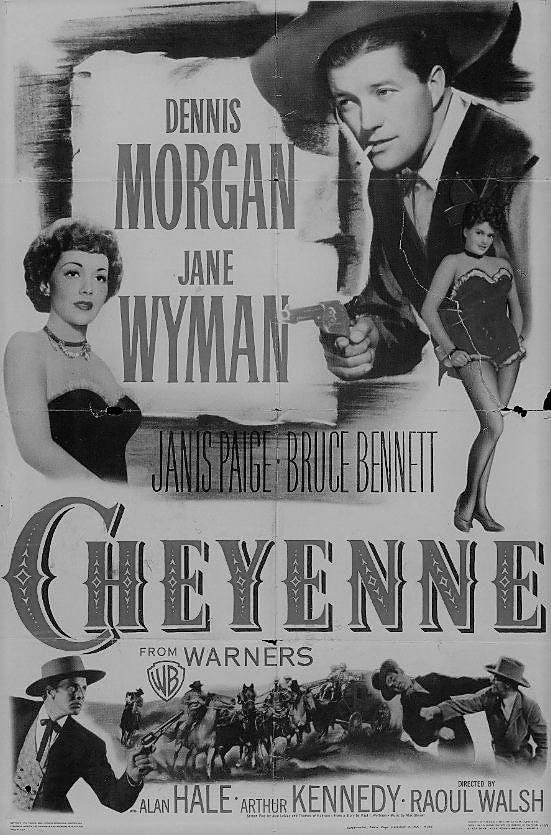 CHEYENNE (1947)
CHEYENNE (1947) (99 Min.) Genre: 1940 ACTION, Transfer Quality: A
A mysterious crook by the name of "The Poet" is robbing Wells Fargo stages and creating havoc in the Old West. The sheriff is having no luck discovering the desperado's identity; when he comes across James Wylie (Dennis Morgan), a gambler who is running from the law in Carson City, he blackmails him into going undercover and tracking the outlaw down. Wylie takes the next coach out, joined by two tantalizing women, Ann (Jane Wyman) and Emily (Janis Paige). Emily is just a saloon singer (which affords her the chance to croon "I'm So in Love" and "Going Back to Old Cheyenne"), but it turns out that Ann is more unusual — she's the wife of The Poet. The two team up to track him down (encountering The Sundance Kid and his gang along the way) — and discover that they make a pretty good team. A popular TV series of the same name was loosely based upon the movie; starring Clint Walker, it ran for 7 years starting in 1955. — Craig Butler
Starring: John Alvin, Bruce Bennett, Monte Blue,John Compton, | Directed by: Raoul Walsh
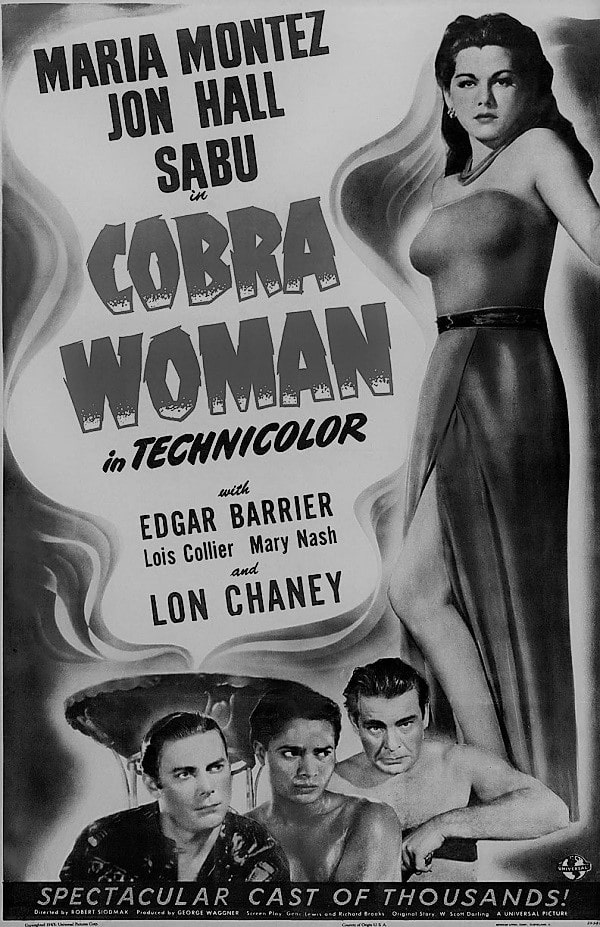 COBRA WOMAN (1944)
COBRA WOMAN (1944) (70 Min.) Genre: 1940 ACTION, Transfer Quality: B
On the eve of her wedding to Ramu (Jon Hall), the beautiful Tollea (Maria Montez) is spirited away from her tranquil South Sea island to the mysterious, forbidden place of her birth, Cobra Island. Ramu follows and, with help from his young-but-not-too-bright friend Kado (Sabu) and their chimp Coco, manages to land on the island and avoid capture, which would mean death. It turns out that Tollea is the rightful high priestess of Cobra Island, the first born of two twin daughters of the earlier priestess. Tollea was not immune to the venom of the king cobra, however, so she was spirited away from the island as an infant to avoid her unnecessary death. Now her grandmother, the Queen (Mary Nash), has secured her return. Tollea's twin sister, Naja (also played by Montez), has turned cruel, greedy, and ambitious, and is killing, torturing, and tormenting her people and perverting their religion; Naja must be deposed, hopefully before the volcano on the far side of the island registers too loud an objection to her blasphemies. But Naja — who is wanton enough to want Ramu for her own pleasure — and her confederate, the evil, ambitious Martok (Edgar Barrier), don't plan on leaving quietly. Meanwhile, Ramu has to keep himself and Kado alive and decide if he's willing to give up the woman that he loves so that she can save her people; Tollea must choose between love and duty, fate and her birthright. One of the most ridiculously and unselfconsciously campy costume adventure movies of its era, Cobra Woman was apparently a lot of fun to work on and a relief from the reality of the Second World War for audiences in 1944. The script, co-authored by Richard Brooks a long time before he wrote The Brick Foxhole, much less directed Blackboard Jungle or made In Cold Blood or Lord Jim, is incredibly sloppy, the mix of harem dancers and ridiculous prop snakes is bizarre, and some of the worst choreography of its era doesn't help — and yet it all hangs together, somehow, as entertainment. Director Robert Siodmak reportedly liked it, and as a refugee from the Nazis, working on it still beat the fate he'd fled in Germany. The movie is also alleged to be the primary inspiration for Jack Smith's Flaming Creatures — which starred female impersonator Mario Montez — and looking at it in the 21st century, one wonders if it was ever seen by Edward D. Wood Jr.; not only does the production sort of anticipate (albeit on a much higher level and budget) his work in the adventure genre, but the script seems to contain the essence of inept moments that he would elevate to an art of sorts. And one can just imagine Wood, as a young marine recruit, watching Cobra Woman eagerly and "learning" all the wrong lessons from its writing and production. But, like the best of Wood's movies — only more so — Cobra Woman is still great fun of the "guilty pleasure" sort.
Starring: Maria Montez, Jon Hall, Sabu, Lon Chaney, Jr. | Directed by: Robert Siodmak
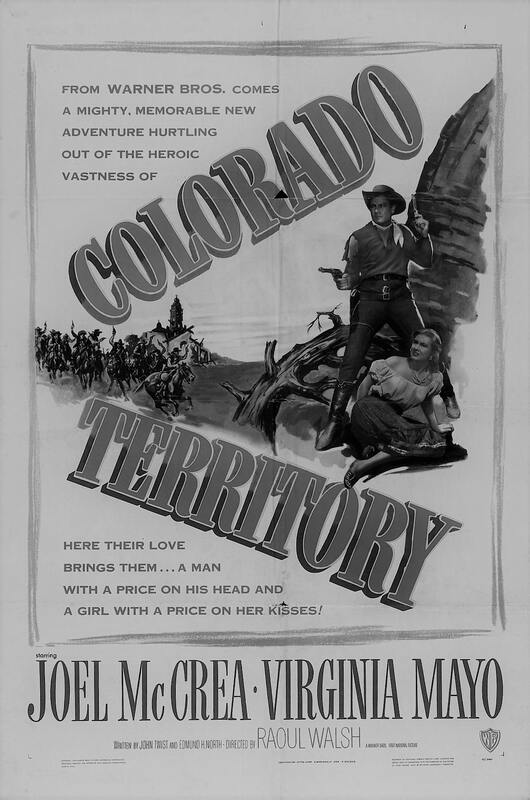 COLORADO TERRITORY (1949)
COLORADO TERRITORY (1949) (94 Min.) Genre: 1940 ACTION, Transfer Quality: A
Though not acknowledged by contemporary reviewers, Colorado Territory is a westernized remake of the 1941 crime drama High Sierra. Raoul Walsh, director of the earlier film, returns to helm the remake, doing a grand job on both occasions. Joel McCrea stars in the Humphrey Bogart role, playing a veteran outlaw who hopes to pull off one last, spectacular heist. Virginia Mayo portrays the Ida Lupino counterpart, a "bad" dance-hall girl who proves to be the only person who genuinely cares about McCrea's well-being. As in the earlier film, the climax finds McCrea making a futile bid for escape in the mountains, with tragic consequences. High Sierra was good for at least one more remake, the 1955 Jack Palance-Shelley Winters starrer I Died a Thousand Times. — Hal Erickson
Starring: Joel McCrea, Virginia Mayo, Dorothy Malone, Henry Hull | Directed by: Raoul Walsh
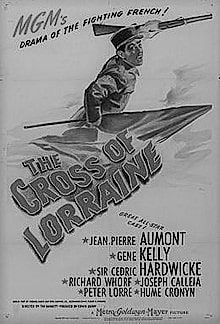 CROSS OF LORRAINE, THE (1943)
CROSS OF LORRAINE, THE (1943) (90 Min.) Genre: 1940 ACTION, Transfer Quality: A
The time is World War II. A group of disillusioned French soldiers are approached by Nazi troops and promised safe passage to their homeland. The Frenchmen willingly surrender, only to discover that their next destination is a German concentration camp located near a Gallic village. The anticipated escape attempt results in an uprising from the French villagers—hence the film's title, which refers to the emblem of the Free-French underground. Cross of Lorraine compensates for its Hollywood's-eye view of France (no more realistic than the Paris of the Ernst Lubitsch musicals) with some remarkably graphic sequences showing the extent of German brutality. The melting-pot cast includes Frenchman Jean-Pierre Aumont as a patriot, Hungarian Peter Lorre as a hateful Nazi, American Gene Kelly as a cynical victim of German torture, and Canadian Hume Cronyn as the traditionally rodent-like informer. — Hal Erickson
Starring: Jean-Pierre Aumont, Gene Kelly, Cedric Hardwicke, Richard Whorf | Directed by: Tay Garnett
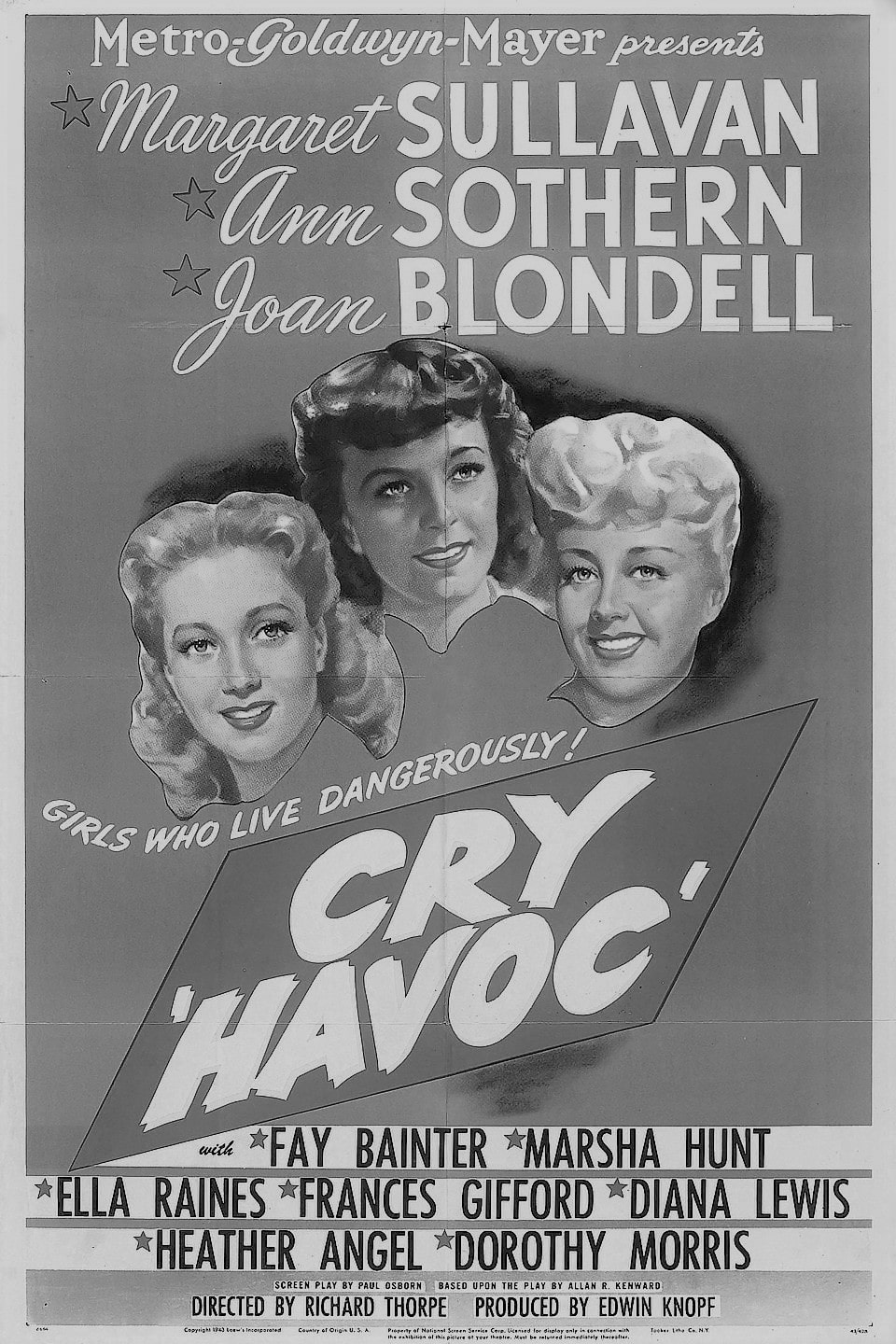 CRY HAVOC (1943)
CRY HAVOC (1943) (97 Min.) Genre: 1940 ACTION, Transfer Quality: A
Allen R. Kerward's flagwaving stage play Proof thro' the Night was vastly improved in its screen adaptation, which was retitled Cry Havoc. Margaret Sullavan (making her first screen appearance in two years), Joan Blondell and Ann Southern are among the appropriately deglamorized actresses playing Red Cross nurses caught up in the Pacific War. As the Japanese army forces most of the American troops to retreat from Bataan, the nurses remain, tending to the miserable wretches left behind to defend a defenseless post. This atypical MGM production is far more successful in depicting the plight of courageous women trapped behind enemy lines than was Paramount's over-touted So Proudly We Hail (and the acting was better to boot). Among the very few male characters in Cry Havoc is young bit player Robert Mitchum, appearing briefly as a mortally wounded soldier. — Hal Erickson
Starring: Margaret Sullavan, Ann Sothern, Joan Blondell, Fay Bainter | Directed by: Richard Thorpe
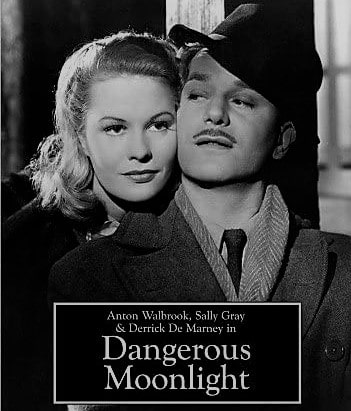 DANGEROUS MOONLIGHT (1941)
DANGEROUS MOONLIGHT (1941) (97 Min.) Genre: 1940 ACTION, Transfer Quality: A
Dangerous Moonlight was the original British title for the wartime drama Suicide Squadron. Anton Walbrook plays a famed Polish composer who refuses to leave his homeland when the Nazis march in. His friends literally have to hoodwink him into leaving so that he will avoid extermination. Still anxious to avenge his countrymen, Walbrook joins a Polish air squadron headquartered in England. The film's romantic angle is personified by Sally Gray, an American newswoman whom Walbrook marries after a whirlwind courtship. The film itself is no better or worse than most others of its kind, but has remained etched in the collective memory of wartime filmgoers thanks to its omnipresent utilization of The Warsaw Concerto on the soundtrack. Financed by RKO Radio pictures, Dangerous Moonlight was distributed by Republic Pictures during the war years, though rights reverted to RKO in 1947. — Hal Erickson
Starring: Anton Walbrook, Sally Gray, Derrick de Marney, Cecil Parker | Directed by: Brian Desmond Hurst
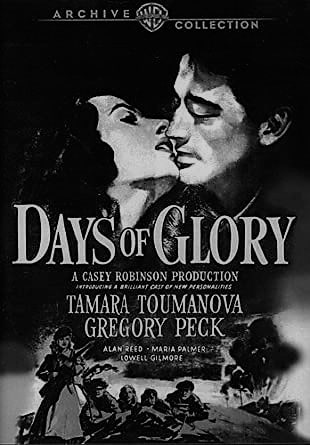 DAYS OF GLORY (1944)
DAYS OF GLORY (1944) (86 Min.) Genre: 1940 ACTION, Transfer Quality: A
Like Song of Russia and Mission to Moscow before it, Days of Glory is a paean to the courage and resourcefulness of the Soviet Union during WW2 (this was long before the Russians became the stock villains in Hollywood films!) Producer Casey Robinson took a gamble with the project, casting the leading roles with movie newcomers. Heading the cast is Broadway actor Gregory Peck as Vladimir, the leader of a band of Soviet guerilla fighters. Tamara Toumanova, former premier ballerina of the Ballet Russe de Monte Carlo, costars as Nina, whose love for Vladimir is surpassed by her love for Mother Russia (Toumanova was at the time the wife of producer Robinson). The actors speak in long, lyrical monologues about freedom, sacrifice and the indomitability of the human spirit: fascinating at first, the excess verbiage begins to wear on the viewer after three or four reels. In traditional underground-movie fashion, hero and heroine are obliged to give up their own lives for the sake of their countrymen, in a reasonably spectacular climactic battle sequence. Budgeted at nearly a million dollars, Days of Glory lost heavily at the box-office, though critics and audiences alike were in agreement that Gregory Peck had some potential as a screen presence. — Hal Erickson
Starring: Tamara Toumanova, Gregory Peck, Alan Reed, Maria Palmer | Directed by: Jacques Tourneur
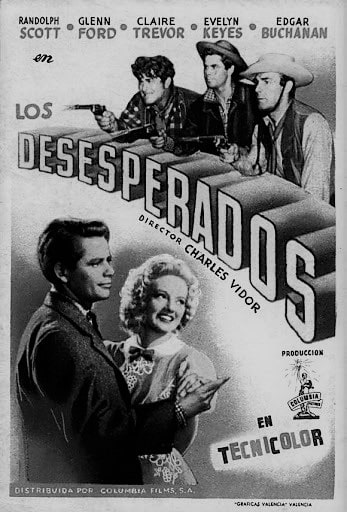 DESPERADOES, THE (1943)
DESPERADOES, THE (1943) (85 Min.) Genre: 1940 ACTION, Transfer Quality: A
In this Western drama, Steve Upton (Randolph Scott) is the sheriff of a Utah community in 1860. Upton's best friend, Cheyenne Rogers (Glenn Ford), was once an outlaw, but under Steve's guidance, he's gone straight and tries to earn an honest living. However, while Cheyenne is in town to pay Upton a visit, the local bank is robbed and Cheyenne is the prime suspect. Through Cheyenne is quickly convicted, Upton is convinced his friend is innocent, and the sheriff helps the former outlaw break out of jail; together, they hit the trail trying to find the real culprits and clean up the town. The Desperadoes had the distinction of being the first Technicolor feature released by Columbia Pictures.
Starring: Randolph Scott, Glenn Ford, Claire Trevor, Evelyn Keyes | Directed by: Charles Vidor
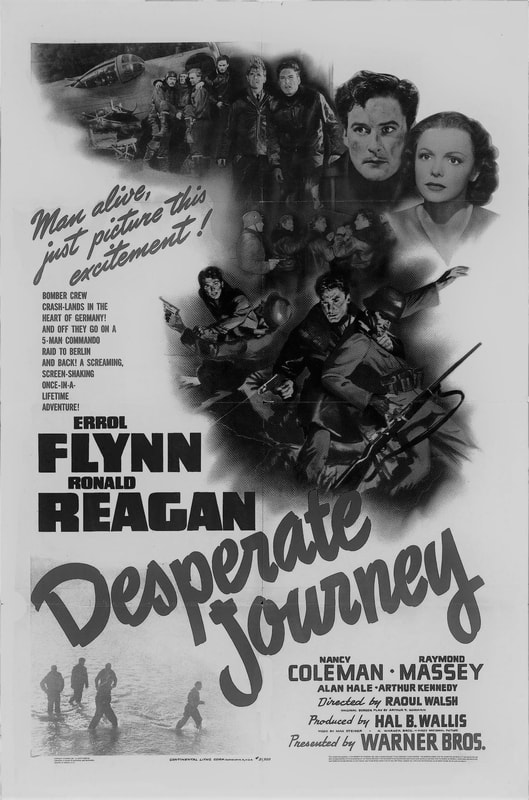 DESPERATE JOURNEY (1942)
DESPERATE JOURNEY (1942) (108 Min.) Genre: 1940 ACTION, Transfer Quality: A
It is said that Desperate Journey was intended as a spoof of ballsy wartime adventure films. If so, the humor was lost on audiences of the early 1940s, who accepted this slam-bang Errol Flynn vehicle on face value. Flynn is one of five RAF pilots to survive a crash-landing in occupied Poland. They are relentlessly pursued by Nazi officer Raymond Massey, who despite his erudition and poise comes across as one of the densest men on earth—not that his Nazi underlings are any brighter. After repeatedly humiliating Massey and laying waste to most of the Third Reich installations in Poland, Flynn and cohort Ronald Reagan steal a German bomber and head back to England. "Now for Australia and a crack at those Japs!" declares Flynn at the end, admirably maintaining a straight face. Desperate Journey gained some negative fame in the 1980s because of its brief scenes in which Ronald Reagan dons a Nazi uniform. — Hal Erickson
Starring: Errol Flynn, Ronald Reagan, Raymond Massey, Arthur Kennedy | Directed by: Raoul Walsh
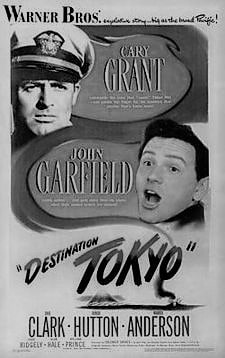 DESTINATION TOKYO (1943)
DESTINATION TOKYO (1943) (135 Min.) Genre: 1940 ACTION, Transfer Quality: A
Though its purely propagandastic aspects are never far from surface, Destination Tokyo must rank as one of the most intelligent and objective of wartime thrillers. Cary Grant is a tower of strength as Captain Cassidy, skipper of an American submarine bound for Tokyo harbor. Its mission: to allow a Navy meterologist to survey Japanese weather conditions, in preparation for a major Allied assault. Many of the individual incidents in Delmar Daves' script are based on fact, notably an episode in which a pharmacist's mate is called upon to perform an emergency appendectomy. Admittedly, some of the secondary characters are WWII stereotypes, but they're never played that way. Particularly good isDane Clark, in his first important screen role; also registering well as a radio man is John Forsythe, in his first screen role ever. From the sub's embarkation in San Francisco to its climactic retreat from Japan, there's not a single solitary dull moment in the 135 minutes of Destination Tokyo. — Hal Erickson
Starring: Cary Grant, John Garfield, Alan Hale, Dane Clark, Faye Emerson | Directed by: Delmer Daves
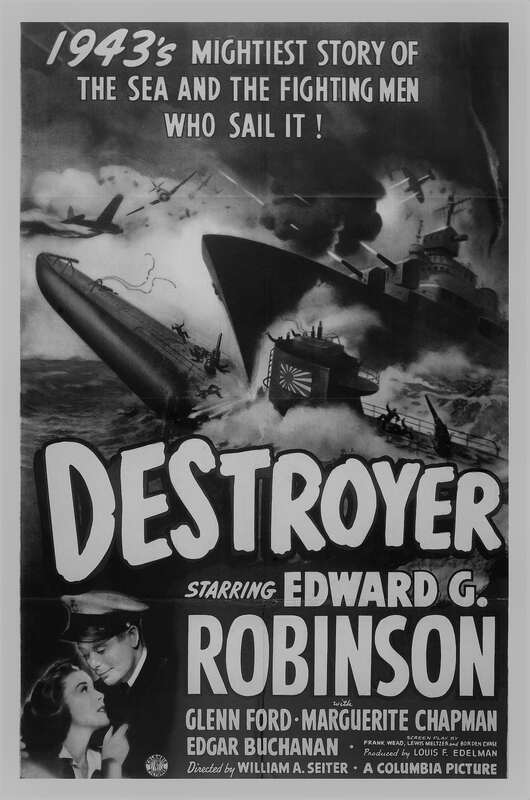 DESTROYER (1943)
DESTROYER (1943) (99 Min.) Genre: 1940 ACTION, Transfer Quality: A
Edward G. Robinson portrays a hard-driving, hard-nosed perfectionist who causes dissension aboard the WWII destroyer he helped build before re-enlisting in the Navy. Coming aboard as a senior crewman and trying to emulate the perfection of his hero John Paul Jones, he drives himself as hard as he drives the younger generation of sailors he commands, even going so far as recounting the last battle of the Bon Homme Richard to the increasingly disgruntled crew. But it is not his words that earn him their respect. During a major battle Robinson proves himself a true hero. The harsh training also pays off and the young sailors successfully defeat the enemy. Afterward they realize that Robinson was right to be tough on them and never question him again. Meanwhile, the captain who stood by Robinson through the thick of it even winds up involved with the old salt's daughter.
Starring: Edward G. Robinson, Glenn Ford, Marguerite Chapman, Edgar Buchanan, Charles McGraw | Directed by: William Seiter
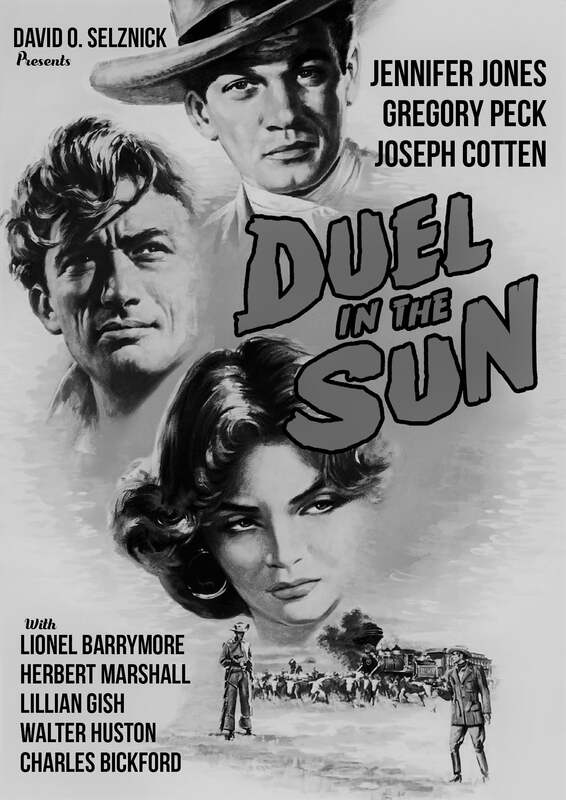 DUEL IN THE SUN (1946)
DUEL IN THE SUN (1946) (144 Min.) Genre: 1940 ACTION, Transfer Quality: A
Appropriately nicknamed "Lust in the Dust," Duel in the Sun is a wacky, grandiose melodrama, famous for its sexual innuendo. Producer David O. Selznick was attempting to top his success with Gone With the Wind, and though it did make quite a lot of money, Duel never matched the level of public and critical adulation of his previous film. It's still good fun to watch, especially the riotous ending. Despite starring the producer's second wife, Jennifer Jones, and a host of other big names (Gregory Peck, Lillian Gish, Joseph Cotten, Lionel Barrymore), the film relegates the performers mostly to the background — as they are in the final shot. Selznick was so keen on producing the "biggest movie ever" that, in 1946, Duel was the most expensive film ever made. The producer's meddling in the filmmaking process drove director King Vidor from the picture, and five other uncredited directors would work on the film after him, including Josef von Sternberg and William Dieterle. — Brendon Hanley
Starring: Jennifer Jones, Griff Barnett, Gregory Peck, Joseph Cotton, Charles Bickford, Lionel Barrymore | Directed by: King Vidor
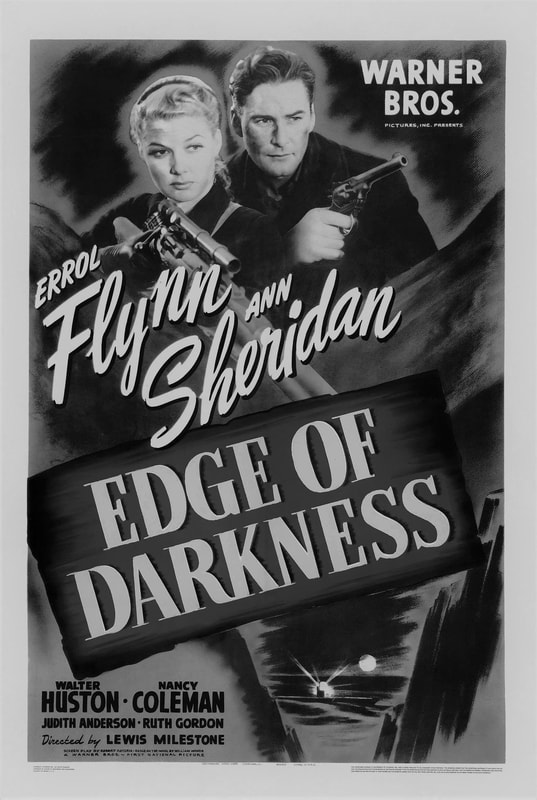 EDGE OF DARKNESS (1943)
EDGE OF DARKNESS (1943) (120 Min.) Genre: 1940 ACTION, Transfer Quality: A
The Norwegian resistance to the Nazi occupation of their country inspired several wartime films from Hollywood, including this Warner Bros. production, filmed in and around Monterey, California. In October 1942, a German observation airplane discovers a seaside village named Trollness where the Norwegian flag is flying over the town square. A ground patrol discovers an empty town littered with corpses, including a number of Nazi officials. The story of the massacre is told in flashback. Errol Flynn plays Gunnar Brogge, a fisherman engaged to Karen Stensgard (Ann Sheridan), whose father, Martin (alter Huston), is the village physician. Gunnar and Karen are working to undermine the Nazis. The town is divided, with the minister leading a contingent which believes that violence, even against the sadistic Germans, is morally wrong. Karen is concerned about the imminent arrival of her brother, who is known to be friendly to the German occupiers; she fears he may learn of plans by the British to deliver a supply of guns to the resistance. The Nazi commandant, Captain Konig (Helmut Dantine), keeps up the pressure to learn of any opposition to his administration, eventually deciding to execute a selected number of the villagers to force someone to reveal the extent of the resistance's schemes. — Tom Wiener
Starring: Errol Flynn, Ann Sheridan, Walter Huston, Tom Fadden | Directed by: Lewis Milestone
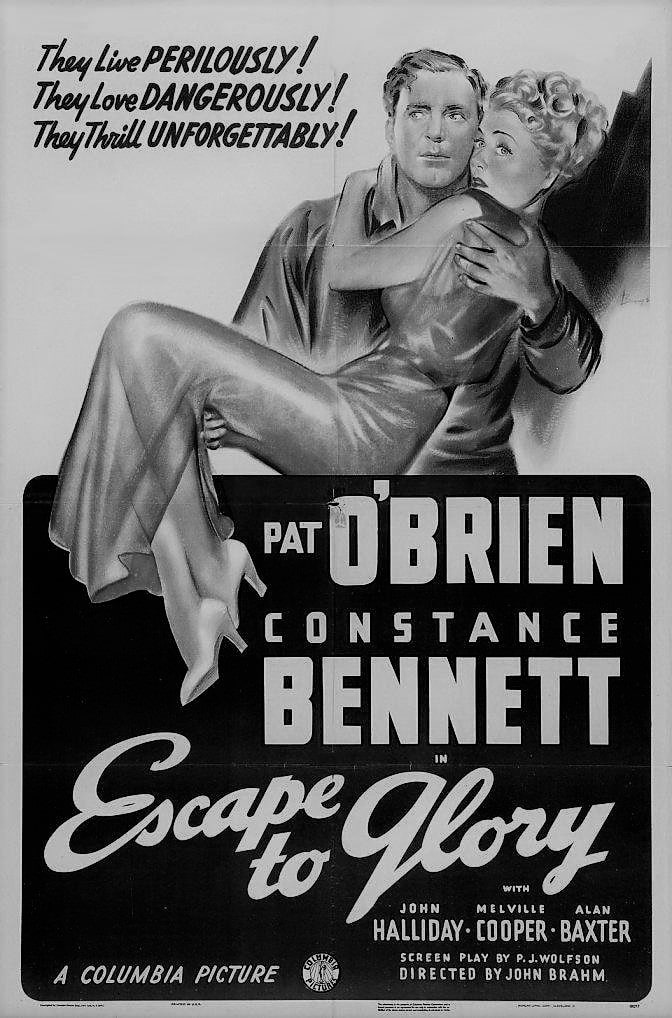 ESCAPE TO GLORY (1940)
ESCAPE TO GLORY (1940) (74 Min.) Genre: 1940 ACTION, Transfer Quality: B
The Grand Hotel formula that was so overworked in the 1930s made an encore appearance in 1940's Escape to Glory. The story is given timeliness by placing the characters on a British merchant ship on the very day that World War II is declared. The ship is attacked by a Nazi U-Boat, resulting in a variety of reactions from the diverse passengers—one of whom (Erwin Kalser) is a German doctor. Constance Bennett is glamorous, Pat O'Brien is boozy, John Halliday is pensive, and everybody else (except for the German medico) is plain fearful. Twenty years later, director John Brahm would masterfully recreate the shipboard tensions he sustained so well in Escape to Glory for his classic Twilight Zone TV playlet "Judgment Night."
Starring: Pat O'Brien, Constance Bennett, John Halliday, Melville Cooper | Directed by: John Brahm
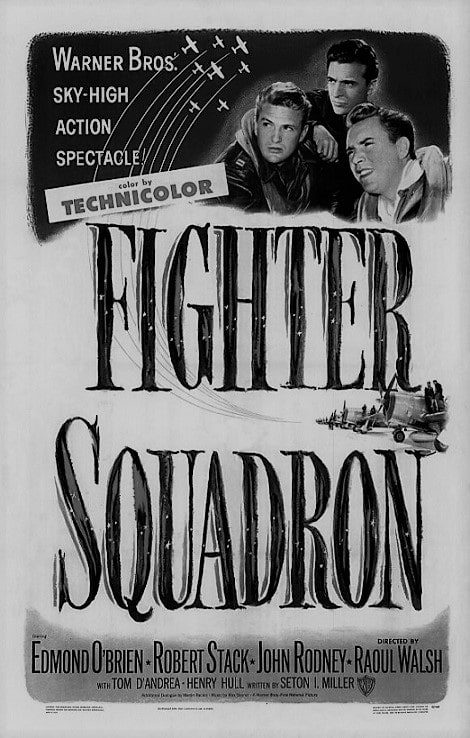 FIGHTER SQUADRON (1948)
FIGHTER SQUADRON (1948) (95 Min.) Genre: 1940 ACTION, Transfer Quality: A
Excellent Technicolor photography, principally in the aerial scenes, is the main asset of the cliché-ridden Fighter Squadron. Set in the months just prior to D-Day, the plot zeroes in on Marjor Ed Hardin (Edmond O'Brien) leader of a squadron of fearless combat pilots. In keeping with the conventions of the era, the training and flying sequences are counterbalanced with comic byplay involving wheeler-dealer Sergeant Dolan (Tom D'Andrea), whose flippant attitudes towards the opposite sex are a bit hard to take today. Far more effective is the performance of 15-year-old Jack Larson, making his screen debut in the role of a rookie pilot who grows up in a hurry after scoring his first kill (Larson later gained TV immortality as Jimmy Olsen on Superman). Also making his first screen appearance, in a role so small it isn't even billed, is a former truck driver named Rock Hudson. — Hal Erickson
Starring: Edmond O'Brien, Robert Stack, John Rodney, Tom D'Andrea | Directed by: Raoul Walsh
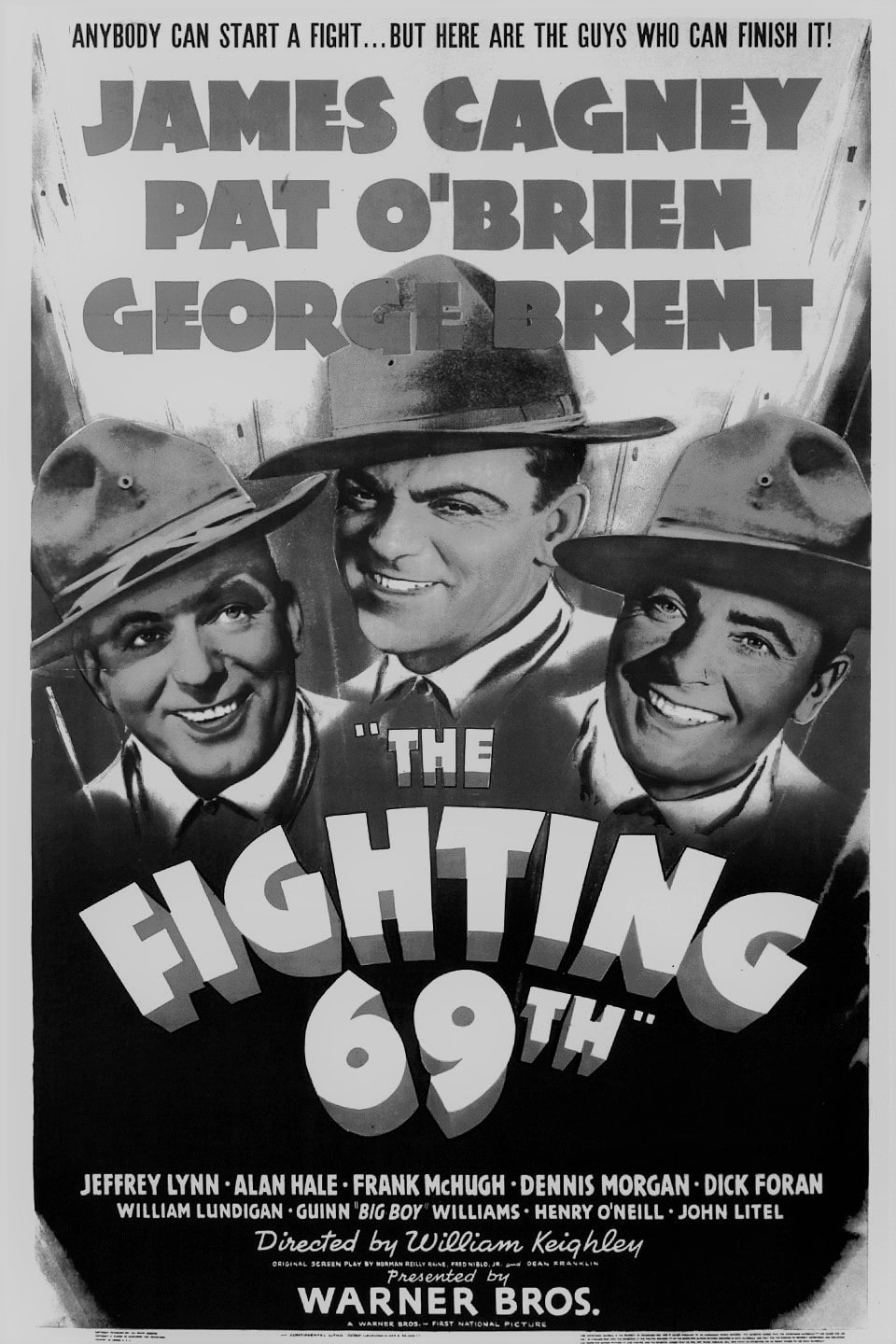 FIGHTING 69TH, THE (1940)
FIGHTING 69TH, THE (1940) (90 Min.) Genre: 1940 ACTION, Transfer Quality: A
Officially, America had no intention of entering the Second World War in 1940: Why, then, were there so many "preparedness" pictures like The Fighting 69th? This film, based on the experiences of military priest Father Duffy (Pat O'Brien), is set during World War I. The US 69th division was a national guard contingent comprised of Irish Americans, who fought with the Rainbow Division in the years 1917-1918. Into this Hibernian stronghold comes cocky Jerry Plunkett (Jimmy Cagney), a streetwise tough who is certain that he can lick the Germans single-handedly. But during his first taste of real combat, Plunkett turns coward and inadvertently reveals the 69th's position. Held responsible for the deaths of his companions, Plunkett is sentenced to a firing squad. Thanks to a conveniently dropped bomb that levels the stockade in which he is held, Plunkett redeems himself on the battlefield by sacrificing his life to save his fellow soldiers. The beauty of James Cagney's star performance is that he is as thoroughly convincing as a "yellow belly" as he is a hero. In addition to father Duffy, the real-life personages depicted in The Fighting 69th include future OSS leader Wild Bill Donovan (George Brent) and poet Joyce Kilmer (Jeffrey Lynn). Other Irish "regulars" include Alan Hale, Frank McHugh, Dennis Morgan, and Sammy Cohen. — Hal Erickson
Starring: James Cagney, Pat O'Brien, George Brent, Jeffrey Lynn, Frank McHugh | Directed by: William Keighley
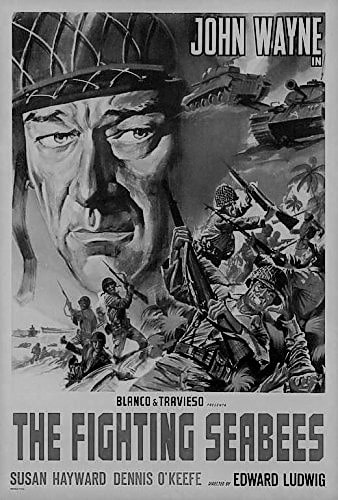 FIGHTING SEABEES, THE (1944)
FIGHTING SEABEES, THE (1944) (100 Min.) Genre: 1940 ACTION, Transfer Quality: A
The Fighting Seabees is Republic Pictures' rip-roaring tribute to the US Navy's Construction Batallions (C.B.), without whom no plane would ever have gotten off the ground during WW2. John Wayne stars as Wedge Donovan, head of civilian construction company stationed in a pre-Pearl Harbor South Pacific war area. Despite Donovan's pleas to the Navy brass, he is denied permission to train his men for combat, the better to stave off imminent Japanese attack. Only after incurring heavy losses is Donovan given a commission and his men officially enlisted in the Navy. The self-sacrifical climax, as Donovan destroys a Japanese tank batallion at the cost of his own life, is one of the best-staged action highlights of its kind. As Constance Chesley, Susan Hayward finds herself in the unenviable position of being the apex in a romantic triangle involving herself, Wedge Donovan and Lt. Cmdr. Robert Yarrow (Dennis O'Keefe); her climactic speech, explaining how it's possible to love two men equally, is so well delivered that it transcends its essential corniness. Of the supporting cast, William Frawley stands out as Irish seabee Eddie Powers, who virtually signs his own death warrant when he begins singing happily just before an enemy sneak attack. — Hal Erickson
Starring: John Wayne, Susan Hayward, Dennis O'Keefe, William Frawley | Directed by: Edward Ludwig, Howard Lydecker
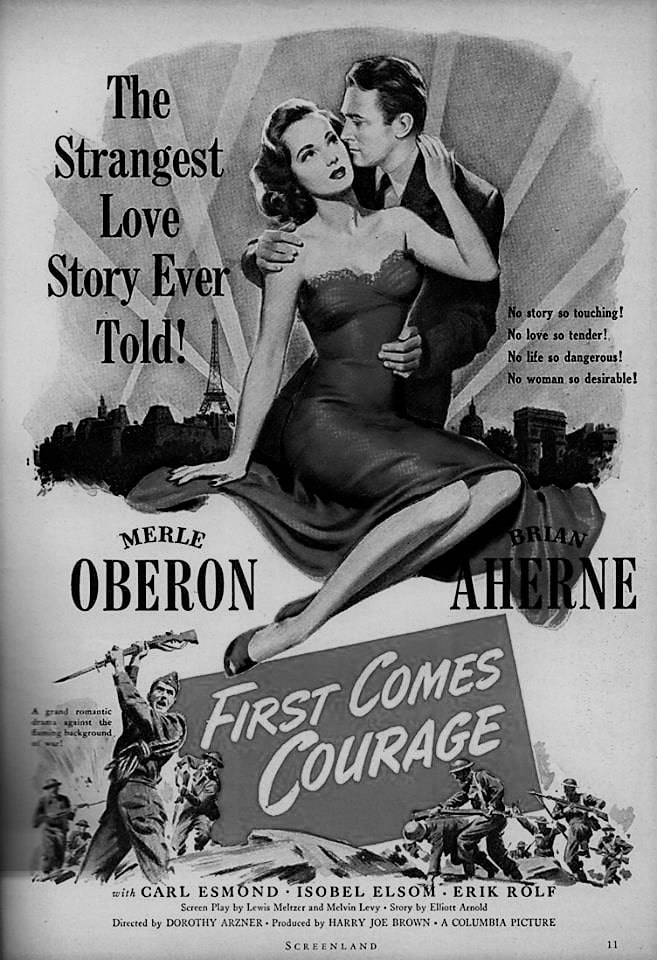 FIRST COMES COURAGE (1943)
FIRST COMES COURAGE (1943) (88 Min.) Genre: 1940 ACTION, Transfer Quality: B
With Dorothy Arzner in the director's chair, it's no wonder that First Comes Courage has a more feminist slant than most WWII "underground" films. Merle Oberon plays Nicole Larsen, a member of the Norwegian resistance. To obtain important war information, Nicole romances Nazi major Paul Dichter Carl Esmond, enduring the slings and arrows of those villagers unaware of her motives. Her mission is further complicated when she is reunited with British commando Allan Lowell Brian Aherne, with whom she'd had a prewar affair. Forced to choose between love and duty, Nicole makes the only decision possible under the circumstances. First Comes Courage was based on The Commados, a novel by Elliot Arnold.
Starring: Merle Oberon, Brian Aherne, Carl Esmond, Fritz Leiber | Directed by: Dorothy Arzner
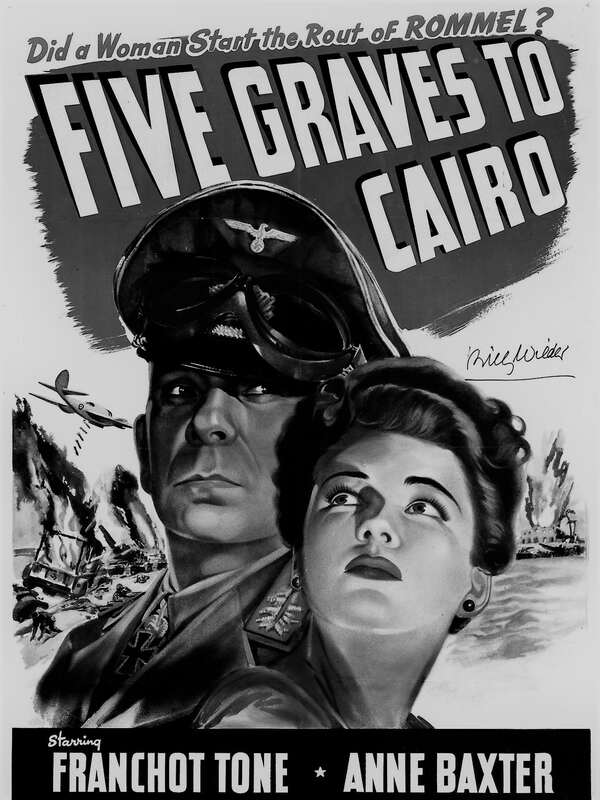 FIVE GRAVES TO CAIRO (1943)
FIVE GRAVES TO CAIRO (1943) (96 Min.) Genre: 1940 ACTION, Transfer Quality: A
Cameron Crowe describes Five Graves to Cairo as a masterful predecessor to the Indiana Jones action phenomenon. Over 40 years before Lucas and Spielberg, Billy Wilder created a captivating adventure film that deftly weaves its way in and out of actual history. The fictitious John J. Bramble (Franchot Tone) must uncover vital Nazi secrets and, if successful, incite the genuine routing of the German Afrika Corps during World War II. The stakes are high (the fate of the world is in the balance), but the stage is small (the setting is an Egyptian hotel) -- historical fact is expertly whittled down to the personal arena. This allows for romance, as well as individual heroics. Moreover, it permits creative and spontaneous portrayals of even the most documented figures -- as evident in Erich von Stroheim's blustering and comic take on General Erwin Rommel. However, it is important to note that Wilder and co-screenwriter Charles Brackett do not simply capitalize on the harrowing world war as a setting for melodrama or wit. Filming in 1943, they understood that contemporary war films were a powerful form of propaganda. The movie's politics and beliefs are clear -- it exalts patriotism, sacrifice, and action -- but the film is not heavy-handed. Billy Wilder's Five Graves to Cairo is a skillfully executed adventure and a thoughtful film, which accounts, as Crowe points out, for its timelessness and its reflection in popular films today.
Starring: Franchot Tone, Anne Baxter, Erich Von Stroheim, Peter Van Eyck, Akim Tamiroff | Directed by: Billy Wilder
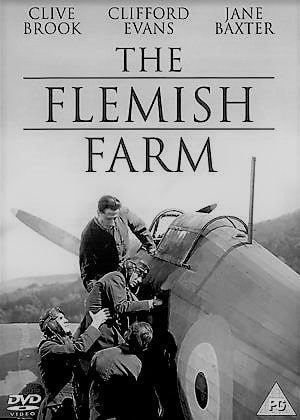 FLEMISH FARM, THE (1943)
FLEMISH FARM, THE (1943) (82 Min.) Genre: 1940 ACTION, Transfer Quality: B
The Flemish Farm is based on a true story. Clifford Evnas plays Duclos, a Belgian airman who joins the British air corps at the outbreak of WW2. Feeling the need to do something more for his country than merely dropping bombs on Nazi installations, Duclos flies back to his German-occupied homeland to symbolically retrieve a Belgian Air Force flag he'd buried just before evacuating. He hides out in the farm of the title, where he is given aid and support by the Belgian underground. Ultimately, however, his presence becomes known to the Nazis, leading to a tension-filled denouement. Jane Baxter costars as Trescha, who in true WW2-propaganda fashion gives her life for her cause.
Starring: Clive Brook, Clifford Evans, Jane Baxter, Phillip Friend | Directed by: Jeffrey Dell
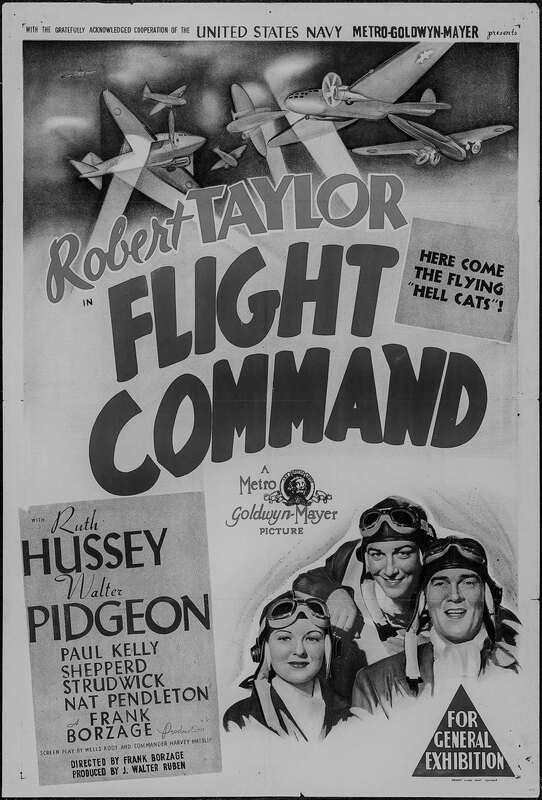 FLIGHT COMMAND (1940)
FLIGHT COMMAND (1940) (112 Min.) Genre: 1940 ACTION, Transfer Quality: A
MGM had a tendency to overglamorize the sort of rough-hewn film fare that Warner Bros. offered to its public without adornments. Such was the case of Flight Command. Instead of Warners' streetwise James Cagney, the MGM film stars pretty-boy Robert Taylor as the obligatory hotshot cadet who chafes at the authority and discipline of a naval flight squadron. While Warners might have done without a romantic subplot, MGM contrives to have Taylor fall for the wife (Ruth Hussey) of squad commander Walter Pidgeon. And whereas Warners would have told this story compactly in 90 minutes, MGM lolls around for nearly two hours before Taylor's anticipated redemption and "make good" scene. MGM newcomer Red Skelton shows up in Flight Command for comedy relief, which turns out to be neither. — Hal Erickson
Starring: Robert Taylor, Ruth Hussey, Walter Pidgeon, Paul Kelly | Directed by: Frank Borzage
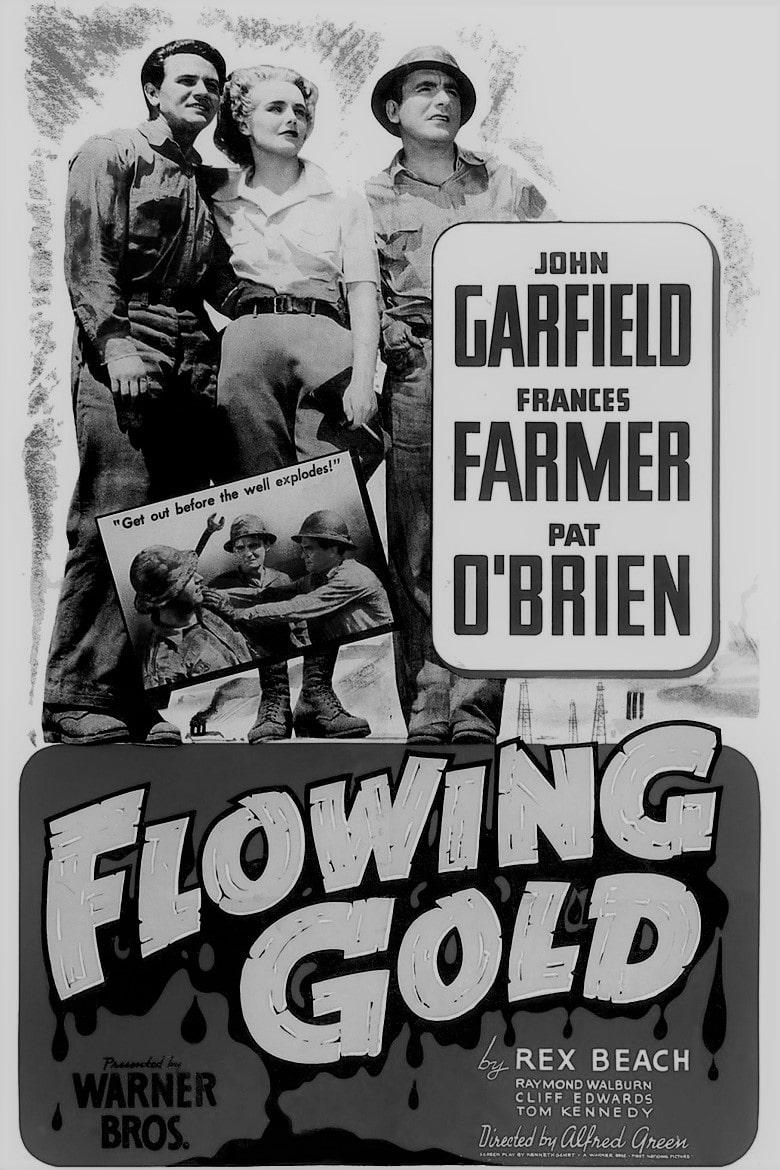 FLOWING GOLD (1940)
FLOWING GOLD (1940) (81 Min.) Genre: 1940 ACTION, Transfer Quality: A
A tough, bitter fugitive's travels lead him to a grungy rundown oil town. There the transient is taken in by an oil-rigger who gives him a job working a well. They must work double-quick for the well's lease is due to expire. Unfortunately, they become so focused on striking oil quickly, they forget about safety and several men are hurt. Meanwhile the kindly crew boss and the fugitive vie for the affections of a life-hardened woman until tragedy strikes the supervisor. Suddenly the fugitive must take on the responsibility of reaching the oil. In so doing, he makes some important decisions about taking responsibility for his actions as well. — Sandra Brennan
Starring: John Garfield, Frances Farmer, Pat O'Brien, Raymond Walburn | Directed by: Alfred E. Green
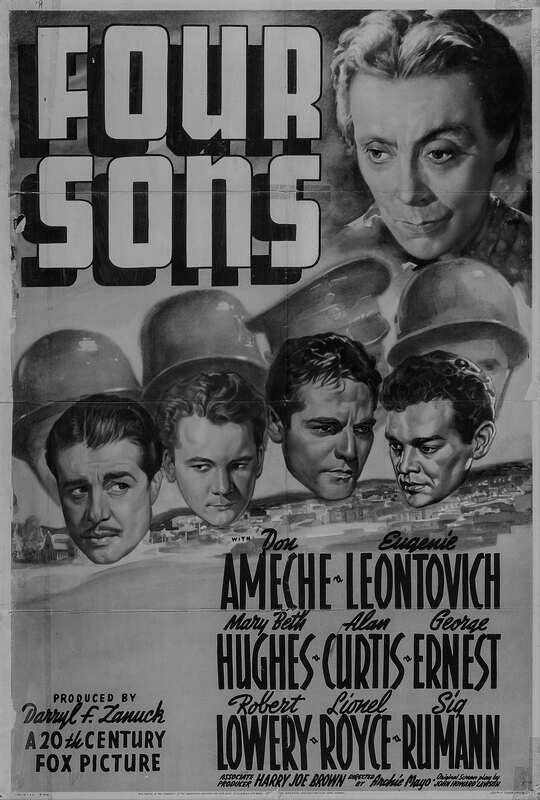 FOUR SONS (1940)
FOUR SONS (1940) (88 Min.) Genre: 1940 ACTION, Transfer Quality: A
This remake of John Ford's classic WW1 drama Four Sons has been updated to the Europe of the late 1930s. At the time of the Nazi invasion of Czechoslovakia, four sons of German-Czech parentage go off in separate ideological directions. Chris (Don Ameche) remains loyal to the concept of a free Czechoslovakia; Karl (Alan Curtis) embraces the Nazi cause; Joseph (Robert Lowery) heads to America; and the youngest, Fritz (George Ernest), is drafted in the German army and is killed during the Polish campaign. The impact of the original film is somewhat muted here, since the political ramifications of WW2 were far more complex than those of WW1, and also because Archie Mayo isn't as good a director as John Ford. By far the best performance of the film is delivered by the great Russian stage actress Eugene Leontovich, making a rare screen performance as the long-suffering mother of the Four Sons. — Hal Erickson
Starring: Don Ameche, Eugenie Leontovich, Mary Beth Hughes, Alan Curtis | Directed by: Archie Mayo
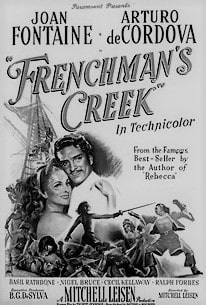 FRENCHMAN'S CREEK (1944)
FRENCHMAN'S CREEK (1944) (113 Min.) Genre: 1940 ACTION, Transfer Quality: B
Daphne du Maurier's novel formed the basis for this romantic adventure saga. Lady Dona St. Columb (Joan Fontaine), an English noblewoman, is unhappily married to the weak-willed Harry St. Columb (Ralph Forbes), while Harry's sinister best friend Lord Rockingham (Basil Rathbone) makes no secret of his desire for her. When she discovers the ship of a French pirate, Jean Benoit Aubrey (Arturo DeCordova), docked near her estate, she makes the acquaintance of the dashing buccaneer, and she soon finds herself infatuated with him. Dona impulsively joins Jean as he stages a raid against wealthy landowner Lord Godolphin (Nigel Bruce); when Dona learns that Harry and Rockingham plan to capture the pirate, she stages a dinner party to distract them and then sends word to Jean that he is in danger. Jean soon appears at the St. Columb estate, putting Harry and Rockingham behind bars and urging Dona to run away with him. She declines, choosing not to follow her heart but to instead stay home to raise her children; however, Rockingham overhears this conversation and uses it to blackmail Dona into having his way with her. Frenchman's Creek earned an Academy Award for Sam V. Comer's set decoration and design. — Mark Deming
Starring: Joan Fontaine, Arturo de Cordova, Basil Rathbone, Nigel Bruce | Directed by: Mitchell Leisen
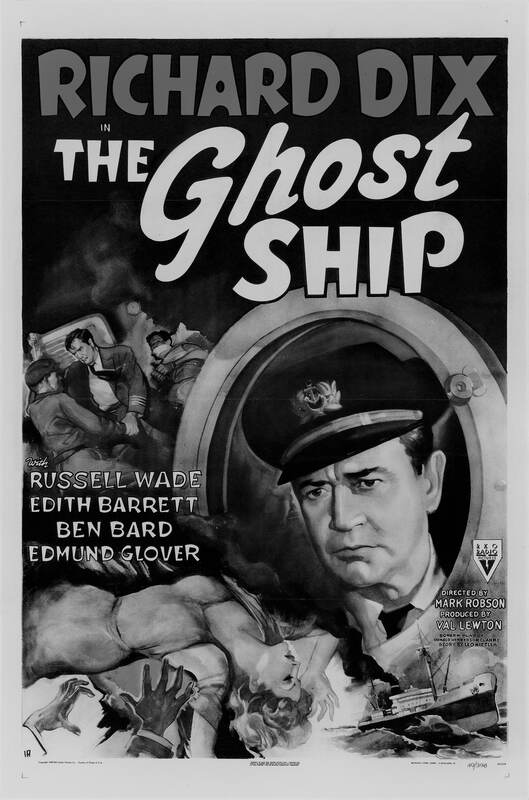 GHOST SHIP, THE (1943)
GHOST SHIP, THE (1943) (69 Min.) Genre: 1940 ACTION, Transfer Quality: A
RKO horror producer Val Lewton dished up seven reels of brooding psychological terror with The Ghost Ship. Richard Dix stars as the ship's captain, a tortured soul who teeters on the verge of madness. Seaman Russell Wade notices the captain's deterioration, but his warnings are dismissed by the crew. Captain Dix completely goes over the edge, sadistically playing a game of cat and mouse with the luckless Wade—and endangering the lives of everyone on board. While the viewer may notice that Ghost Ship closely resembles the Jack London tale The Sea Wolf, playwrights Samuel R. Golding and Norbert Faulkner felt that the film was too close for comfort to an unproduced play of their own. The writers sued RKO, forcing the studio to withdraw Ghost Ship from theatres and prohibiting future TV showings. — Hal Erickson
Starring: Richard Dix, Russell Wade, Edith Barrett, Lawrence Tierney | Directed by: Mark Robson
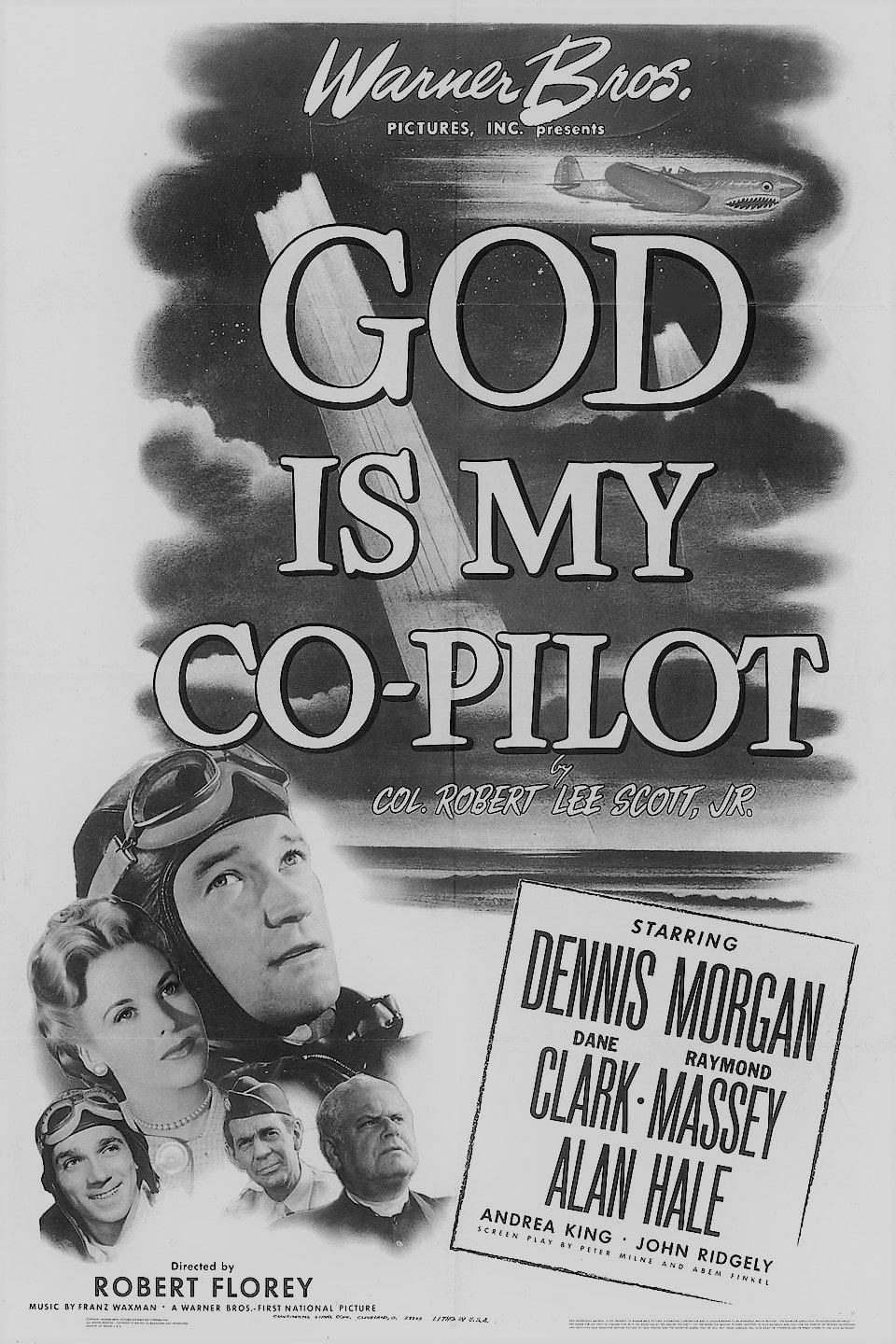 GOD IS MY CO-PILOT (1945)
GOD IS MY CO-PILOT (1945) (90 Min.) Genre: 1940 ACTION, Transfer Quality: A
Such was the prevailing mood among filmgoers in 1943 that God Is My Co-Pilot was allowed to show a spiritual shaft of light in the sky and several scenes of enemy pilots spitting up blood when shot down by American bullets. The film was based on the best-selling novel by fighter pilot Col. Robert Lee Scott Jr., who fought in the Pacific during World War II. At 34, Scott was told he was too old to fly in combat, but he proved his worth as a member of the Flying Tigers. Dennis Morgan plays Scott with pious sincerity, while the more traditional "regular guy" roles went to such stalwarts as Dane Clark and Alan Hale. Like most aerial combat films of the era, God Is My Co-Pilot soars highest when its characters stay off the ground and away from all that pontificating dialogue. — Hal Erickson
Starring: Dennis Morgan, Dane Clark, Raymond Massey, Alan Hale | Directed by: Robert Florey
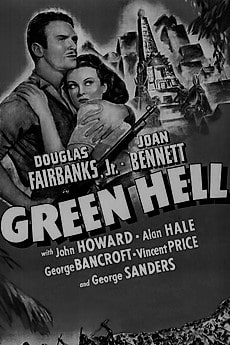 GREEN HELL (1940)
GREEN HELL (1940) (87 Min.) Genre: 1940 ACTION, Transfer Quality: B
Angry natives or a beautiful widow — which poses the greater threat? Keith Brandon (Douglas Fairbanks Jr.) is an archeologist leading a team of researchers — Richardson (Vincent Price), Loren (Alan Hale), Forrester (George Sanders), and Scott (John Howard) — who are exploring the jungles of South America in search of Inca artifacts. The scientists discover they are not welcome when Richardson is felled by a poisoned dart, and a difficult situation is made all the more complicated when Stephanie (Joan Bennett), Richardson's wife, appears unannounced to pay her husband a visit. Stephanie must join Brandon's party as they make their way through the wilderness, with angry and armed natives surrounding them on all sides, and in the midst of the tension and danger, both Brandon and Forrester discover they're attracted to to Stephanie, leading to a dangerous rivalry among the crew. Green Hell would turn out to be the last feature film completed by the noted and idiosyncratic horror director James Whale; while he was credited with another film, They Dare Not Love, Whale in fact backed out of the project before shooting was finished. — Mark Deming
Starring: Douglas Fairbanks, Jr., Vincent Price, Joan Bennett, Alan Hale, George Sanders | Directed by: James Whale
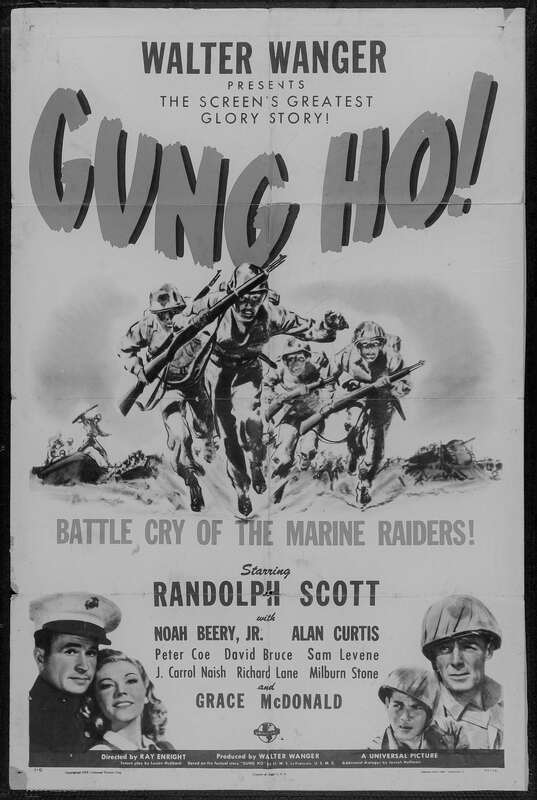 GUNG HO! (1943)
GUNG HO! (1943) (88 Min.) Genre: 1940 ACTION, Transfer Quality: A
Accepted in 1943 as standard wartime propaganda, Gung Ho can be seen today as an outrageous exercise in raging machismo. Randolph Scott plays Thorwald, a marine colonel assigned to assemble a crack squadron of fearless jungle fighters for the all-important raid on Japanese-held Makim Island (which in real life was recaptured only a few weeks before the film's release). Thorwald seems determine to select the dregs of the earth for this mission: most of his squadron is comprised of misfits, barroom brawlers, borderline psychos and outright murderers. It is suggested that these sociopaths are the only men truly qualified for the mission at hand, and by film's end the squadron members-living and dead-are lauded as true-blue patriots. Once one gets past the questionable premise, Gung Ho is a fairly exciting WWII melodrama, with a particularly thrilling climax. The film is currently available in its original form and in a computer-colorized version. — Hal Erickson
Starring: Randolph Scott, Grace McDonald, Noah Beery, Jr., Robert Mitchum | Directed by: Ray Enright
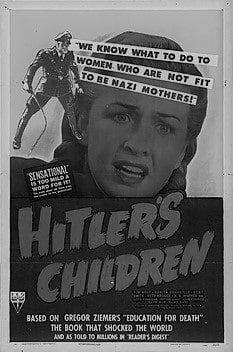 HITLER'S CHILDREN (1943)
HITLER'S CHILDREN (1943) (83 Min.) Genre: 1940 ACTION, Transfer Quality: A
This modestly produced film version of Gregor Ziemmer's book Education for Death surprised everyone at RKO—and in the film industry—by becoming one the biggest hits of 1943. The "children" invoked in the title are borne on behalf of Adolf Hitler; according to the film, it is standard operating procedure in Nazi Germany for young girls to willingly submit to being impregnated by Aryan men (with or without the benefit of clergy) in order to sustain the "Master Race." Those who refuse are ticketed for sterilization, or worse. One of the holdouts is Bonita Granville, a German girl raised and educated in America whose taste of democracy has made her utterly resistant to Nazism. In the film's key scene, the near-naked Bonita is publicly flogged for her defiance, whereupon Bonita's lover, "good Nazi" Tim Holt, suddenly has an awakening of conscience and stops the whipping. This act of courage results in the executions of both Holt and Granville, but they willingly go to their deaths rather than accede to Hitler's demands. It is true enough that many people flocked to see Hitler's Children because of the sensational, censor-provoking aspects of the film, but equal numbers of filmgoers and critics also recognized the above-average artistic contributions of director Edward Dmytryk and scriptwriter Emmet Lavery (both of whom received substantial cash bonuses for their work on this film). Hitler's Children was the second biggest moneymaker of RKO's 1943-44 season, only slightly behind the Cary Grant vehicle Mr. Lucky. — Hal Erickson
Starring: Tim Holt, Bonita Granville, Kent Smith, Otto Kruger | Directed by: Edward Dmytryk
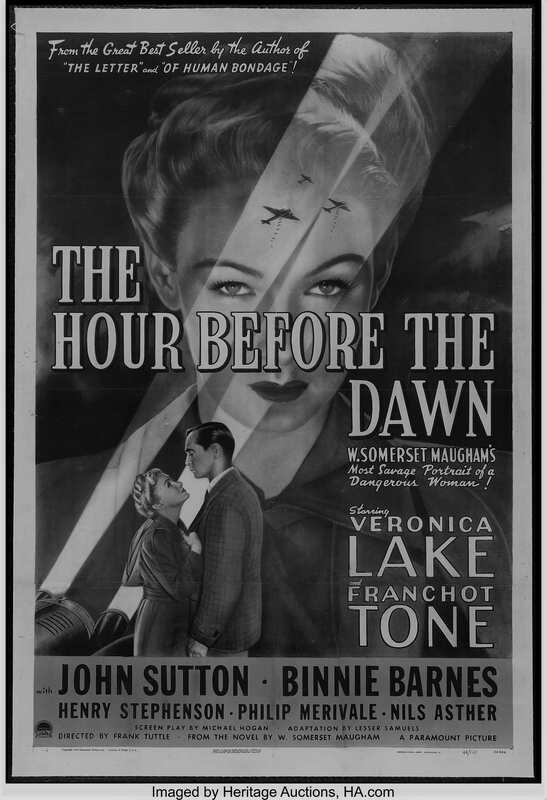 HOUR BEFORE THE DAWN, THE (1944)
HOUR BEFORE THE DAWN, THE (1944) (75 Min.) Genre: 1940 ACTION, Transfer Quality: B
Jim Hetherton (Franchot Tone), the scion of an aristocratic rural English family, was traumatized from boyhood by a shooting accident and reaches adulthood as a sincere and dedicated pacifist -- like many of his generation in England. He makes his way through life as a schoolteacher with a promising future, and even ponders the possibility of marriage with Dora Bruckmann (Veronica Lake), the governess of his young nephew. But then the Second World War breaks out, which creates a crisis for Jim and his family and household. He decides that he can't a won't fight if it means killing another human being, and is accepted as a conscientious objector by the authorities. But in doing so, he is forced to give up his teaching position and take a job in farming, to contribute to the economic good at home. He soon finds himself being shunned by much of the village for his beliefs, and discovers that even amid a manpower shortage, securing a job to fulfill his service requirement is no easy matter. Meanwhile, his brother (John Sutton) is called up by the RAF, and his father (Henry Stephenson) joins the home guard. And Dora seems headed to an internment camp, until Jim marries her. But what neither he nor anyone else suspects is that Dora is actually an agent planted by the Germans, part of a team of fifth columnists working to undermine the British war effort. And her main concern is finding the location of a secret British airfield in the vicinity of the Hetherton estate. She manages to manipulate Jim by preying on his beliefs, and maneuvers him into potentially betraying his country.
Starring: Franchot Tone, Henry Stephenson, Nils Asther, Binnie Barnes | Directed by: Frank Tuttle
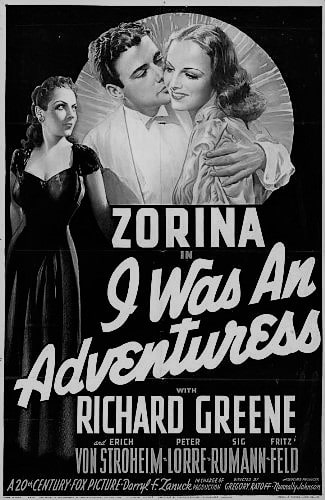 I WAS AN ADVENTURESS (1940)
I WAS AN ADVENTURESS (1940) (81 Min.) Genre: 1940 ACTION, Transfer Quality: B
Actress/ballerina Vera Zorina stars as a phony countess, working in cahoots with two international con artists (Erich von Stroheim and Peter Lorre). She renounces her earlier life after falling in love with one of her victims (Richard Greene), but her old crooked cronies show up to blackmail her. Zorina confesses to her husband, who forgives all. Von Stroheim and Lorre steal everything but the cameras in their brief scenes, outshining both hero and heroine with their patented rascality. I Was an Adventuress ends with a George Balanchine ballet sequence, which like all such film "highlights" goes on too long and is strictly a matter of taste.
Starring: Vera Zorina, Richard Greene, Peter Lorre, Fritz Feld, Erich Von Stroheim | Directed by: Gregory Ratoff
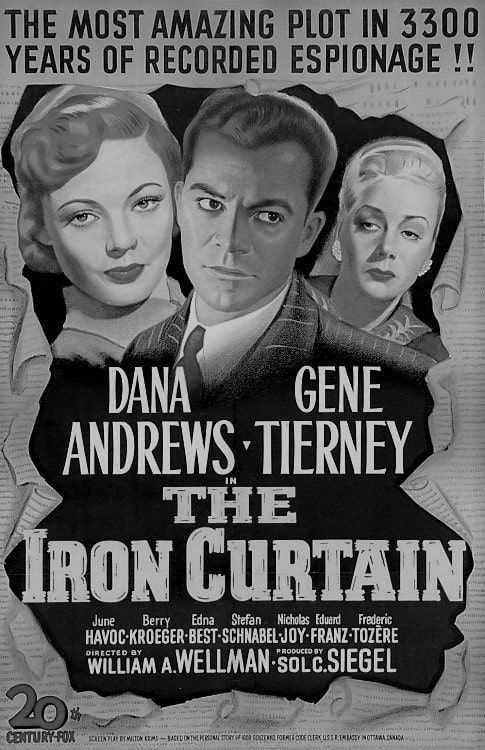 IRON CURTAIN, THE (1948)
IRON CURTAIN, THE (1948) (87 Min.) Genre: 1940 ACTION, Transfer Quality: B
Another of 20th Century-Fox's "drawn from today's headlines" dramas of the late 1940s, Behind the Iron Curtain (a.k.a. The Iron Curtain) is based on the true-life defection of Soviet Embassy code specialist Igor Gouzenko. Portrayed by Dana Andrews, Gouzenko is brought to Canada under a cloud of secrecy by Russian "special agents", the better to help them in their espionage efforts. Despite the fact that he is far from Russia, Gouzenko is hounded by his suspicious superiors and denied the simplest basic rights. When Gouzenko realizes that his government will soon call him back to Russia to engage in the "class struggle," the code clerk decides to defect, stealing secret information and turning it over to the Canadian Ministry of Justice. At first, Gouzenko is ignored, but when his information is digested by the Canadian government, the authorities round up the Communist spy ring. Gouzenko and his family are put in protective custody by the Canadian government, while several of Gouzenko's Russian superiors are punished by the Communist higher-ups for allowing the clerk to slip through their hands. Filmed in a semi-documentary style, Behind the Iron Curtain is more matter-of-fact and less paranoic than other "Red scare" films of the period.
Starring: Dana Andrews, Leslie Barrie, Gene Tierney, June Havoc | Directed by: William Wellman
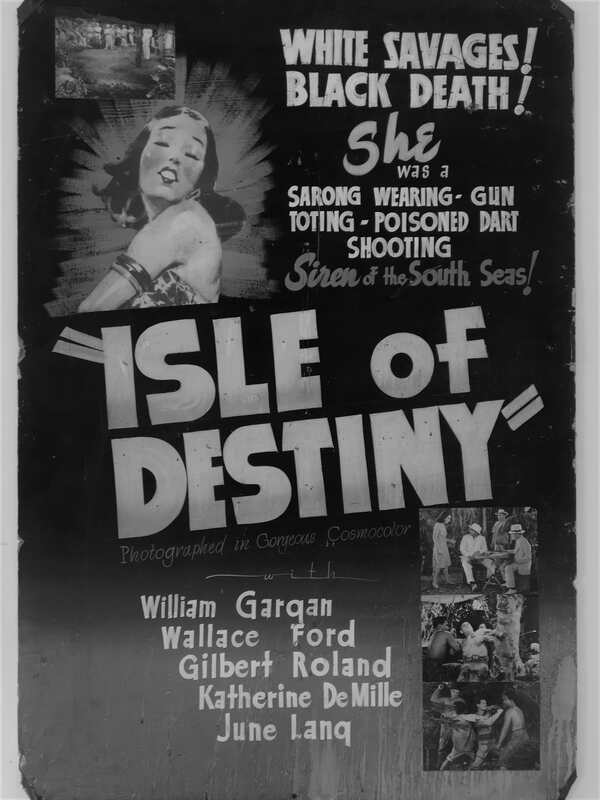 ISLE OF DESTINY (1940)
ISLE OF DESTINY (1940) (83 Min.) Genre: 1940 ACTION, Transfer Quality: B
Originally slated for released through Grand National Pictures, Isle of Destiny was redirected to RKO Radio when Grand National folded in late 1939. June Lang stars as Virginia Allerton, a famous aviatrix who crashlands in a remote South Sea Island (a la Amelia Erhardt!) and is promptly kidnapped by gun-runner Barton (Gilbert Roland). Coming to Virginia's rescue are two-fisted US marines Stripes Thornton (William Gargan) and Milly Barnes (Wallace Ford). Also figuring into the storyline are Katherine DeMille as a sultry native with a predilection of disposing of her enemies with poison darts, and septugenarian Etienne Girardot (in his last film appearance) as Barton's semi-comic assistant. Too long by about two reels, Isle of Destiny has the advantage of eye-pleasing Cosmocolor cinematography.
Starring: William Gargan, Wallace Ford, June Lang, Gilbert Roland, Grant Richards | Directed by: Elmer Clifton
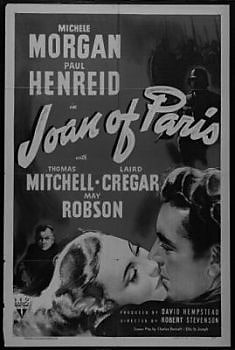 JOAN OF PARIS (1942)
JOAN OF PARIS (1942) (91 Min.) Genre: 1940 ACTION, Transfer Quality: A
At first glance, we seem to be watching the 1934 Fred Astaire/Ginger Rogers musical The Gay Divorcee, which opens with a montage of Paris nightspots. Suddenly, however, stock footage from that earlier film is cut short, the screen goes dark, and an offscreen radio voice announces the Nazi invasion of France. At this point, the plot of Joan of Paris gets under way. Michele Morgan plays a Parisian barmaid whose patron saint is Joan of Arc. Thus, Morgan considers it her bounden duty to aid Free French pilot Paul Henreid and his RAF comrades (one of whom is Alan Ladd) in the efforts to escape from occupied France. And if this means that Morgan must face death at the hands of slimy Gestapo chief Laird Cregar, she's eager and willing to make that sacrifice. One of the earliest French Underground dramas, Joan of Paris posted a neat profit for ever-in-the-red RKO Radio Pictures. — Hal Erickson
Starring: Michele Morgan, Paul Hemreid, Alan Ladd, Thomas Mitchell, Laird Cregar | Directed by: Robert Stevenson
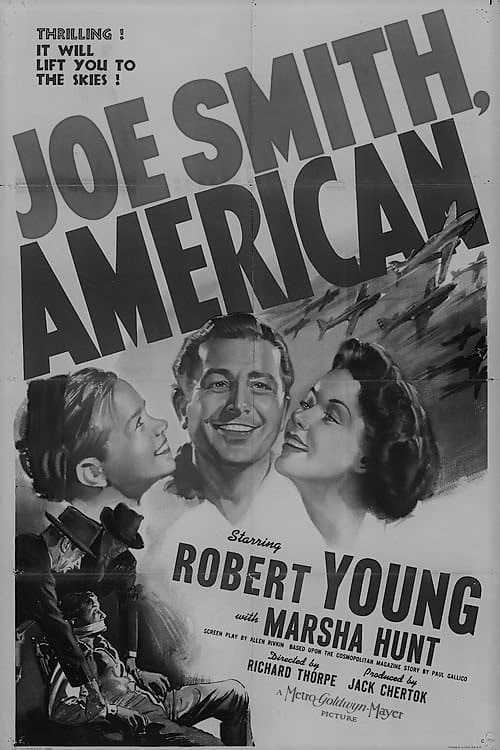 JOE SMITH, AMERICAN (1942)
JOE SMITH, AMERICAN (1942) (63 Min.) Genre: 1940 ACTION, Transfer Quality: A
This upbeat war-time tale chronicles the ordeal of ardently American munitions plant worker Joe Smith (Robert Young), whose access to the U.S. military's plan for a new bomb-sight leave him victim to an abduction from Nazi agents. Knowing that Joe (Young) has vital information, the German soldiers hold nothing back in their attempts to force it out of him, including vicious, unending rounds of torture. The captured patriot, however, reveals nothing, opting instead to visualize happy times from his past as a means to escape his agonizing ordeal. Luckily, Joe manages to escape, contact the FBI, and bring his Nazi captors to justice. Directed by Richard Thorpe, Joe Smith, America also features actors arsha Hunt and arryl Hickman as Joe's beloved family.
Starring: Robert Young, Marsha Hunt, Harvey Stephens, Darryl Hickman, Ava Gardner | Directed by: Richard Thorpe
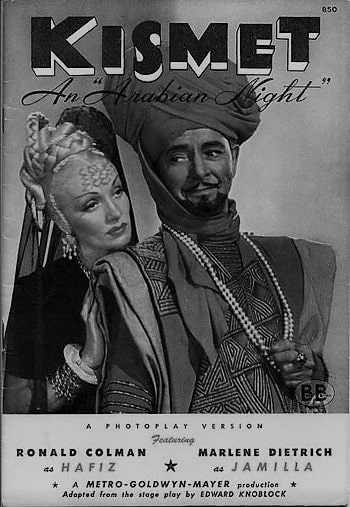 KISMET (1944)
KISMET (1944) (100 Min.) Genre: 1940 ACTION, Transfer Quality: A
Oriental Dream is the TV title for the 1944 Technicolor version of Kismet. Ronald Colman plays Hadji, "king of beggars" in the days of the Arabian Nights. Posing as a prince, Colman woos Marlene Dietrich, the favorite wife of the evil Wazir (Edward Arnold). Meanwhile, Colman's daughter Joy Ann Page falls in love with handsome Caliph James Craig—while the Wazir connives to get Page into his own harem. Several plot convolutions later, Colman ends up with Dietrich, Page winds up with Craig, and the Wazir winds up six feet under. Kismet was based on the war-horse stage play by Edward Knoblock, previously filmed in 1920 and 1930 with the play's original star Otis Skinner. The title Oriental Dream was bestowed upon the 1944 Kismet when it was remade as a musical in 1955. The earlier version had its musical moments as well, notably a delicious dance number spotlighting Dietrich, painted gold head from head to toe; an additional dance sequence was cut, but later showed up in the Abbott and Costello comedy Lost in a Harem (1944).
Starring: Ronald Colman, Marlene Dietrich, Edward Arnold, Florence Bates, James Craig | Directed by: William Dieterle
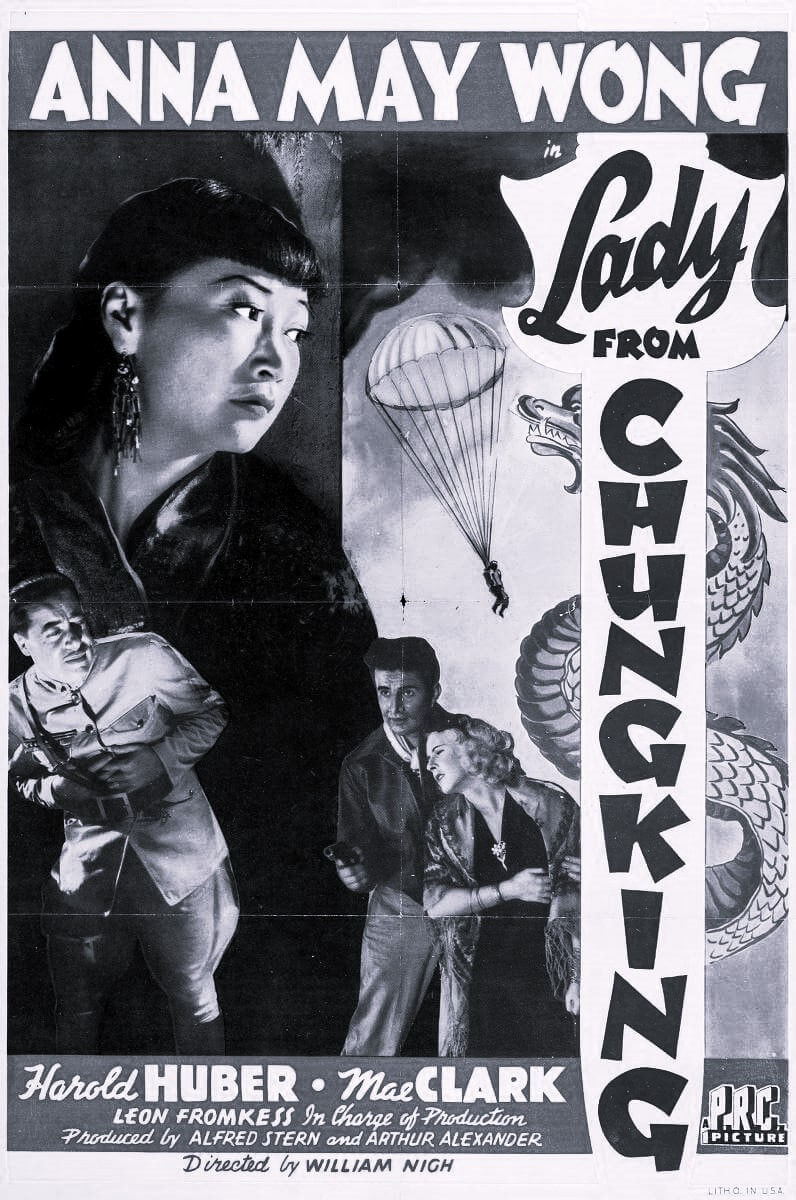 LADY FROM CHUNGKING (1943)
LADY FROM CHUNGKING (1943) (71 Min.) Genre: 1940 ACTION, Transfer Quality: B
Though cheaply produced in the time-honored tradition of PRC Productions, The Lady from Chungking was nothing if not timely. Anna May Wong heads the cast as Kwan Mei, the aristocratic leader of a band of Chinese partisans. Operating secretly, Kwan Mei's compatriots wage vicious guerilla warfare against the occupying Japanese troops. The oddly chosen supporting cast includes Harold Huber as a Japanese general and Mae Clarke as White Russian patriot; the nominal leading men, are pair of downed Flying Tigers pilots, are played by general-purpose actors Ric Vallin and Paul Bryar. The second of Anna May Wong's films for PRC, The Lady From Chungking was a distinct step down from the first, Bombs over Burma, which benefited from the directorial knowhow of Joseph H. Lewis.
Starring: Anna May Wong, Harold Huber, Rick Vallin, Paul Bryar, Ted Hecht | Directed by: William Nigh
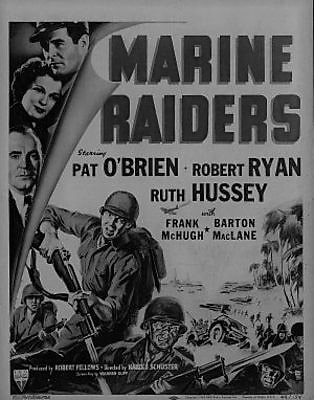 MARINE RAIDERS (1943)
MARINE RAIDERS (1943) (90 Min.) Genre: 1940 ACTION, Transfer Quality: B
In this wartime propaganda film, two Marine officers and their company go on leave when the Army takes over during the Guadalcanal invasion. Their leave is spent in Australia where one of the officers falls in love with a woman. His pal, afraid that there will be no turning back for his buddy, receives orders that send them both back to the US to train recruits. Naturally, his enamored friend is quite upset by this sudden turn and refuses to talk to his pal until a subsequent mission gives them the chance to stop briefly in Australia. There the lovers are finally wed, just before he goes to battle.
Starring: Pat O'Brien, Robert Ryan, Ruth Hussey, Frank McHugh | Directed by: Harold D. Schuster
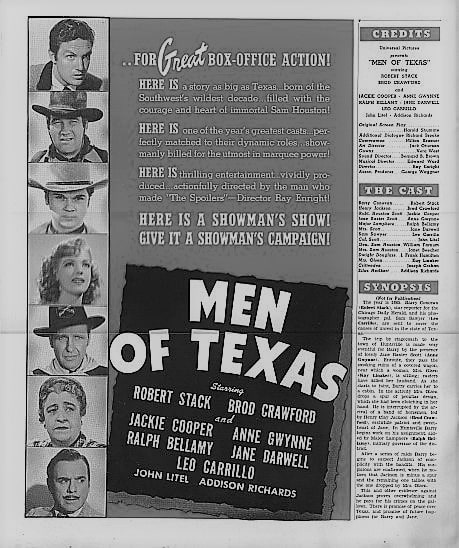 MEN OF TEXAS (1942)
MEN OF TEXAS (1942) (82 Min.) Genre: 1940 ACTION, Transfer Quality: B
Surprisingly little known, Universal's Men of Texas boasts an impressive cast and a fairly exciting and complex storyline. Set just after the Civil War, the film stars Robert Stack as Chicago war correspondent Barry Conovan, who is sent by his newspaper to Texas to get the low-down on the martial law that has been imposed on the state. Conovan is accompanied by Sam Sawyer (Leo Carrillo), his photographer-and never mind that newspapers didn't run photographs in 1866! Despite the good intentions of General Sam Houston (William Farnum), Texas is in the hands of carpetbaggers, scallawags and tinhorn dictators, the worst of whom is Henry Jackson (Brod Crawford), a self-styled patriot who runs his section of the territory like his own private fiefdom, with an army of outlaws at his beck and call. The plot gets even hairier when both Conovan and Jackson fall in love with Jane Baxter Scott (Anne Gwynne), whose younger brother Robert (Jackie Cooper) is a living embodiment of the ideological confusion plaguing postwar Texas.
Starring: Robert Stack, Broderick Crawford, Jackie Cooper, Anne Gwynne, Ralph Bellamy, Jane Darwell, Leo Carrillo | Directed by: Ray Enright
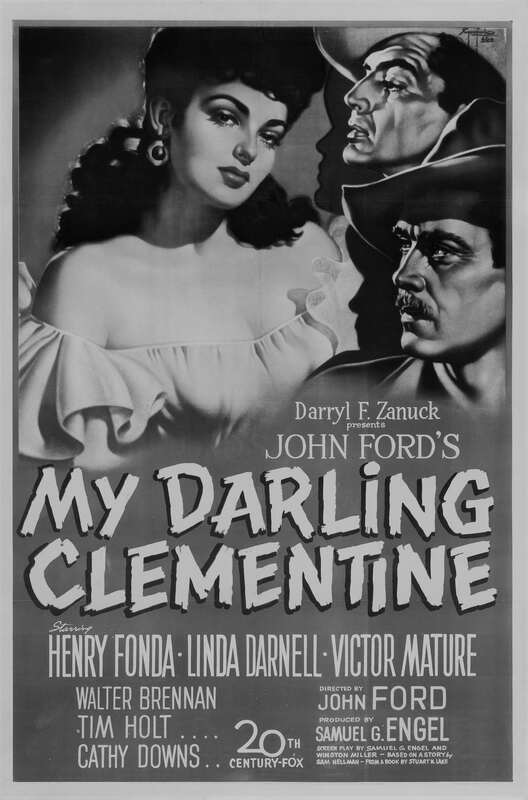 MY DARLING CLEMENTINE (1946)
MY DARLING CLEMENTINE (1946) (97 Min.) Genre: 1940 ACTION, Transfer Quality: A
One of the greatest movie Westerns, John Ford's My Darling Clementine is hardly the most accurate film version of the Wyatt Earp legend, but it is still one of the most entertaining. Henry Fonda stars as former lawman Wyatt Earp, who, after cleaning up Dodge City, arrives in the outskirts of Tombstone with his brothers Morgan (Ward Bond), Virgil (Tim Holt), and James (Don Garner), planning to sell their cattle and settle down as gentlemen farmers. Yet Wyatt, disgusted by crime and cattle rustling, eventually agrees to take the marshalling job until he can gather enough evidence to bring to justice the scurrilous Clanton clan, headed by smooth-talking but shifty-eyed Old Man Clanton (Walter Brennan). Almost immediately, Wyatt runs afoul of consumptive, self-hating gambling boss Doc Holliday (Victor Mature, in perhaps his best performance). When Doc's erstwhile sweetheart, Clementine (Cathy Downs) comes to town, Earp is immediately smitten. However, Doc himself is now involved with saloon gal Chihauhua (Linda Darnell). The tensions among Wyatt, Doc, Clementine, and Chihauhua wax and wane throughout most of the film, leading to the legendary gunfight at the OK Corral, with Wyatt and Doc fighting side-by-side against the despicable Clantons. Its powerful storyline and full-blooded characterizations aside, My Darling Clementine is most entertaining during those little "humanizing" moments common to Ford's films, notably Wyatt's impromptu "balancing act" while seated on the porch of the Tombstone hotel, and Wyatt's and Clementine's dance on the occasion of the town's church-raising. Based on Stuart N. Lake's novel Wyatt Earp, Frontier Marshall (previously filmed twice by Fox), the screenplay is full of wonderful dialogue, the best of which is the brief, philosophical exchange about women between Earp and Mac the bartender (J. Farrell MacDonald). The movie also features crisp, evocative black-and-white photography by Joseph MacDonald. Producer (Daryl F. Zanuck) was displeased with Ford's original cut and the film went through several re-shoots and re-edits before its general release in November of 1946. — Hal Erickson
Starring: Henry Fonda, Linda Darnell, Victor Mature, Jane Darwell, Walter Brennan, Cathy Downs | Directed by: John Ford
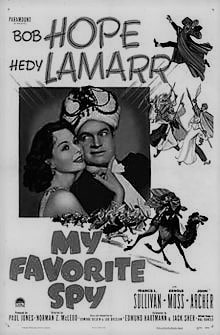 MY FAVORITE SPY (1942)
MY FAVORITE SPY (1942) (86 Min.) Genre: 1940 ACTION, Transfer Quality: A
Produced by silent-film comedian Harold Lloyd, My Favorite Spy is a vehicle for bespectacled bandleader Kay Kyser, who resembles Lloyd more than somewhat. Just before embarking on his honeymoon with new bride Terry (Ellen Drew), Kyser is drafted into the Army. Proving to be a monumentally inefficient soldier, our hero is nonetheless pressed into service by US intelligence officer Major Allen (Moroni Olsen). It seems that Nazi agents have been passing secrets in the nightclub where Kyser's band performs, and Allen wants Kay to act as a counter-espionage agent. To maintain his cover, Kay is discharged from the army in disgrace, and is ordered to noisily make himself a "security risk", so that Nazi chieftan Robinson (Robert Armstrong) will invite Kay to join his spy operation. Trouble is, Kyser must keep his espionage activities secret from everyone-even his wife Terry, who is growing ever more impatient over Kay's unexplained absences from her boudoir. Making matters worse, Kyser is teamed with glamorous blonde secret agent Connie (Jane Wyman), whom Terry understandably suspects of being Kay's clandestine sweetheart. A multitude of slapstick situations follow, culminating in a wild chase through an abandoned theater, with Kay Kyser making like Harold Lloyd to rescue his wife from the Nazis. As directed by Tay Garnett, Kyser's ongoing marital woes seem more pathetic than funny; in addition, his Secret Service cohorts come off as the most sadistic bunch of "good guys" in screen history, bursting with laughter every time Kay's wife throws him out of their apartment. Even so, My Favorite Spy has a few genuine laughs, especially in the final reels. — Hal Erickson
Starring: Ellen Drew, Jane Wyman, Robert Armstrong, Helen Westley | Directed by: Tay Garnett
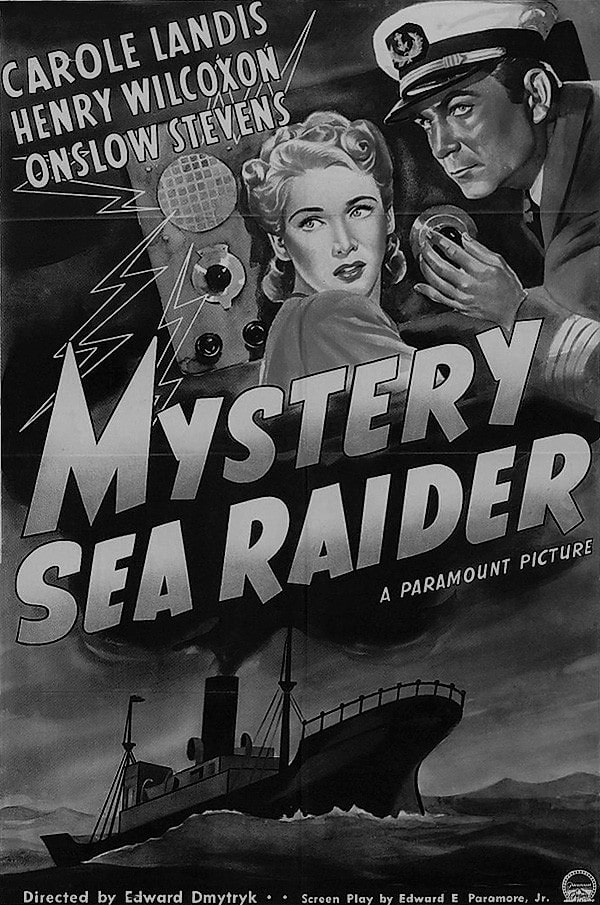 MYSTERY SEA RAIDER (1940)
MYSTERY SEA RAIDER (1940) (78 Min.) Genre: 1940 ACTION, Transfer Quality: B
Evidently Paramount had a great deal of faith in Mystery Sea Raider, else why would a mere B picture be permitted to run nearly 80 minutes? Onslow Stevens has the largest role as Carl Cutler, a prosperous importer who unexpectedly becomes a German spy when WW2 breaks out. Taking over a freighter in mid-ocean somewhere in the Caribbean, Cutler transforms the vessel into a Nazi raider, then does his best to decimate the British fleet. But Cutler has failed to take into consideration the resourcefulness of ship's captain Jimmy Madden (Henry Wilcoxon), who with the help of the Nazi's unwitting cohort June McCarthy (Carole Landis) manages to strike a blow for Democracy in the final footage. Though set in the 1940s, Mystery Sea Raider seems more like a WW1 melodrama, with both Allied and German forces displaying gallantry and even chivalry in the face of death. This sort of romanticism would be dispensed with after Pearl Harbor, whereupon no enemy officer would ever be cut any slack in a Hollywood film.
Starring: Carole Landis, Henry Wilcoxon, Onslow Stevens, Kathleen Howard | Directed by: Edward Dmytryk
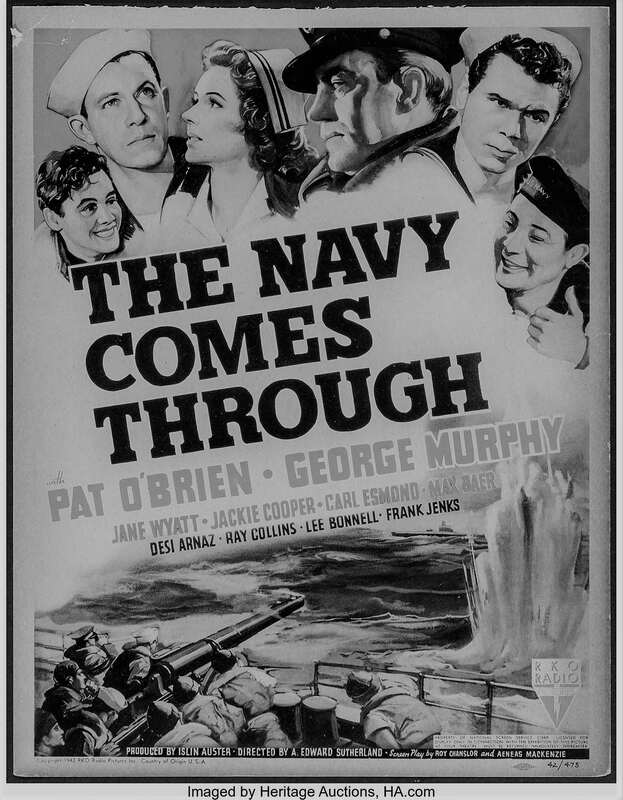 NAVY COMES THROUGH, THE (1942)
NAVY COMES THROUGH, THE (1942) (81 Min.) Genre: 1940 ACTION, Transfer Quality: A
A combat picture was virtually a license to print money in 1942, and RKO Radio's The Navy Comes Through was no exception (net profit: $542,000). Most of the film takes place on the ramshackle old merchant-marine freighter, skippered by Captain McCall (Ray Collins). The captain and his stalwart crew-the most stalwart of which are Mallory (Pat O'Brien), Sands (George Murphy), Babe (Jackie Cooper), Tarriba (Desi Arnaz) and Berringer (Max Baer Sr.)-keep busy by blowing Nazi bombers and U-boats to smithereens. The crewmen cap their accomplishments by capturing a Nazi supply ship and using it against its own navy. The easily forgettable romantic subplot concerns Sands' on-and-off relationship with Myra (Jane Wyatt). The Navy Comes Through was inspired by Borden Chase's serialized Saturday Evening Post story "Pay to Learn". — Hal Erickson
Starring: Pat O'Brien, George Murphy, Jane Wyatt, Jackie Cooper | Directed by: Edward Sutherland
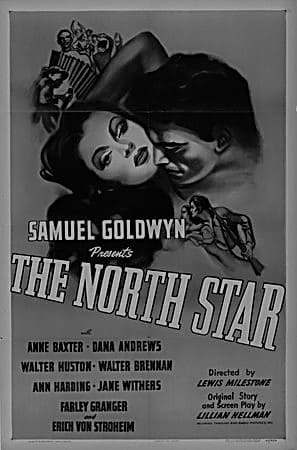 NORTH STAR, THE (1943)
NORTH STAR, THE (1943) (108 Min.) Genre: 1940 ACTION, Transfer Quality: A
In this bit of WWII propaganda (designed to boost support of America's alliance with Russia against Germany), Kolya (Dana Andrews), Kurin (Walter Huston), Damian (Farley Granger), and Marina (Anne Baxter) are members of a farming collective in the Ukraine known as the North Star. The hard-working but happy members of the North Star find their way of life shattered when Germany, in defiance of previous treaties, storms the nation and begins a brutal occupation. Dr. Otto Von Harden (Erich Von Stroheim) begins gathering children -- who are to be used for blood transfusions and medical experiments. Many of the outraged farmers take to the hills to fight with the anti-Nazi resistance, while those who stay behind bravely destroy precious crops and materiel rather than turn them over to the Nazi war machine. Producer Samuel Goldwyn made The North Star at the request of President Franklin D. Roosevelt (whose son James was an executive at Goldwyn's studio). Ironically, several members of the film's creative team (including screenwriter Lilian Hellman) later found their motivations for making the film questioned by the House Un-American Activities Committee, who declared it Communist propaganda.
Starring: Anne Baxter, Dana Andrews, Walter Huston, Walter Brennan, Ann Harding, Farley Granger | Directed by: Lewis Milestone
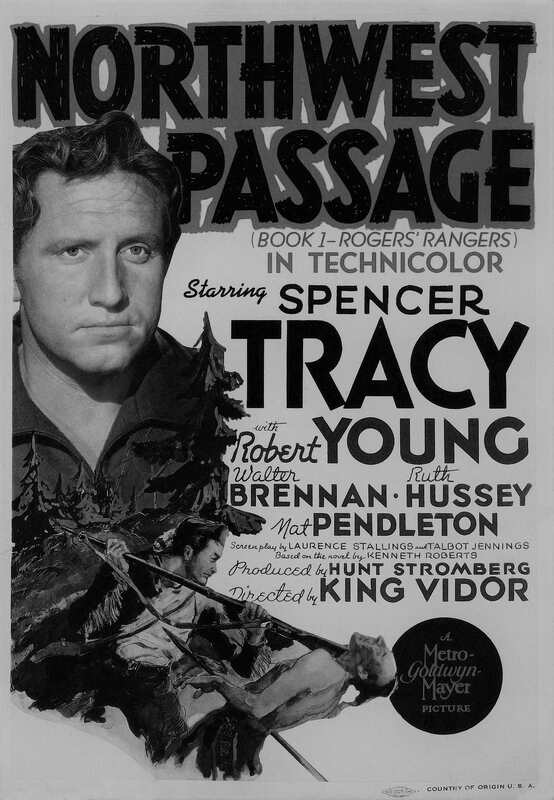 NORTHWEST PASSAGE (1940)
NORTHWEST PASSAGE (1940) (125 Min.) Genre: 1940 ACTION, Transfer Quality: A
Kenneth Roberts' fact-based novel Northwest Passage would seem too raw and explicit a book to be considered for an MGM film adaptation-much less one in Technicolor. Amazingly, MGM retained many of the grim episodes from the Roberts' novel, though most of them were merely talked about rather than shown. The film is set in 1759, when Major Robert Rogers (Spencer Tracy) set out from the Colonies to seek out a northwest passage to the Pacific Ocean. Together with dozens of loyal followers, among them headstrong young artist Langdon Towne (Robert Young) and boisterous old geezer Hunk Marriner (Walter Brennan), Rogers begins his trek by destroying a village of renegade Indians. After a grueling trek up mountains and through a raging river, Rogers' Rangers burn the village and kill all the tribesmen-a government-sanctioned retaliation for a series of recent massacres (described in vivid detail by Rogers). They then move on to Fort Wentworth, where they are to receive food and supplies from the British. Upon arriving at the fort, they find that most of the inhabitants have been wiped out by Indians. Just when all seems hopeless and the Rangers are faced with starvation, the British march to the rescue. Rogers and his men march back to New Hampshire, lauded as heroes even though Rogers has failed to discover a northwest passage. The script, by Laurence Stallings and Talbot Jennings, utilizes only the first part of Kenneth Roberts' novel, bypassing Rogers' eventual descent into madness (though there's a rather unsettling glint in Spencer Tracy's eyes throughout the film. Northwest Passage was subtitled Book 1-Rogers' Rangers, on the assumption that "Book Two" would be filmed in due time. It never was, though a TV series version of Northwest Passage, also produced by MGM, appeared in 1958. — Hal Erickson
Starring: Spencer Tracy, Robert Young, Walter Brennan, Ruth Hussey | Directed by: King Vidor
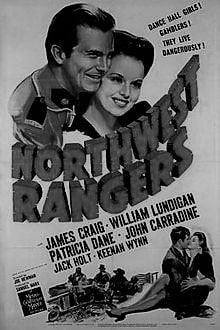 NORTHWEST RANGERS (1942)
NORTHWEST RANGERS (1942) (65 Min.) Genre: 1940 ACTION, Transfer Quality: A
In this North western, Indians orphan two boys who are then raised by a Mountie. The boys are different as night and day: one wants to be a Mountie; the other is drawn to gambler. During one unprofitable outing the gambler swears vengeance upon the crooked proprietor of the local casino. Years pass, and the gambler returns to town with his friend, now a Mountie. Again he returns to the gambling establishment to play roulette. There he kills two people forcing his life-long friend to arrest him. The gambler resists and a gun battle ensues. The gambler is killed. — Sandra Brennan
Starring: James Craig, William Lundigan, Patricia Dane, Jack Holt | Directed by: Joseph Newman
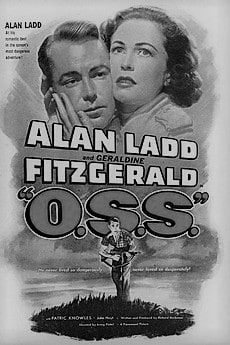 O.S.S. (1946)
O.S.S. (1946) (115 Min.) Genre: 1940 ACTION, Transfer Quality: B
Set during WW II, this taut and suspensful espionage outing chronicles the courage of a brand new cadre of specially-trained American O.S.S. agents who parachute into France to destroy the vital Corbett Mallon tunnel to stop the German invaders from shipping supplies to their troops. One of the spies is a woman, and this bothers the group leader who doubts her abilities. She soon proves herself and the two embark on several exciting adventures before and after the completion of their mission. Along the way, the two manage to fall in love. Unfortuantely, their commitment to duty is necessarily greater than their love and one of them will make a great sacrifice.
Starring: Alan Ladd, Geraldine Fitzgerald, Patric Knowles, Richard Benedict | Directed by: Irving Pichel
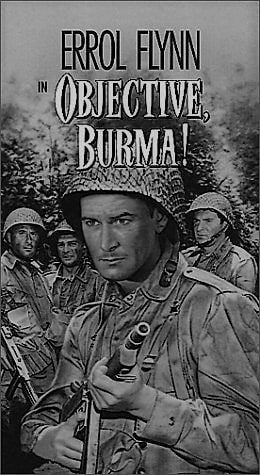 OBJECTIVE, BURMA (1945)
OBJECTIVE, BURMA (1945) (142 Min.) Genre: 1940 ACTION, Transfer Quality: A
A few corny moments aside, Objective Burma must rate as one of the best combat films of WW2. Errol Flynn stars as Captain Nelson, who leads a hardy band of paratroopers behind enemy lines in Burma, for the purpose of destroying a Japanese radar station. Their mission accomplished, Nelson and his men prepare to make their escape by plane, but this proves to be impossible. It is therefore necessary for the surviving paratroops to make a grueling 150-mile journey by foot through the Japanese-held jungle, in hopes of eventually reaching their own lines. With the exception of Henry Hull, who delivers a mannered, strained performance as an Ernie Pyle-like war correspondent, the performances are uniformly excellent, with Flynn, George Tobias and William Prince standing out. Director Raoul Walsh and cinematographer James Wong Howe stage the combat scenes (filmed on the "Lucky" Baldwin Santa Anita ranch) with brutal efficiency, showing little but conveying a lot in the way of gore and carnage. The strangest sequence (at least to modern viewers) has the paratroopers expressing horror and disgust at a vicious sneak attack by the Japanese-which occurs only a few reels after the Americans have staged an equally merciless attack on a Japanese unit! In England, Objective Burma was taken to task by newspaper journalist who felt that the Americans were unfairly taking full credit for the success of the Burmese campaign. The ensuing hue and cry compelled Warner Bros. to issue an apology, and to withhold the British release of the film until 1952, at which time it was accompanied by a lengthy prologue title extolling England's contribution to the Burma invasion. Originally released at 142 minutes, Objective Burma is usually shown on TV in its 128-minute reissue form. — Hal Erickson
Starring: Errol Flynn, Henry Hull, William Prince, James Brown | Directed by: Raoul Walsh
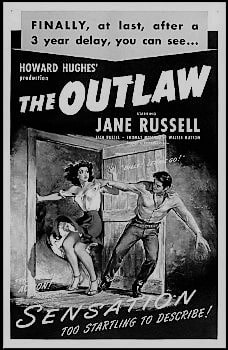 OUTLAW, THE (1943)
OUTLAW, THE (1943) (116 Min.) Genre: 1940 ACTION, Transfer Quality: A
Perhaps Hollywood's greatest success du scandal of the 1940s, this odd psychological Western became a box office hit largely thanks to the costuming of leading lady Jane Russell (or, more accurately, its relative absence). Billy the Kid (Jack Buetel) and Doc Holliday (Walter Huston) are close friends until lawman Pat Garrett (Thomas Mitchell) attempts to ambush Billy and put him behind bars. Doc brings Billy to his ranch to hide out, but when Billy meets Doc's mistress Rio (Russell), he's instantly attracted to the buxom beauty. An intense chemistry quickly grows between them, despite the fact that Billy murdered Rio's brother. Billy and Rio secretly marry, but their love runs hot and cold, and soon Billy, Doc, and Rio are fighting among themselves as they're chased through the desert by Garrett and his posse. Director Howard Hawks and screenwriter Ben Hecht both worked on The Outlaw, but they went uncredited after disputes with the legendarily difficult financier (and sometimes producer/director) Howard Hughes, whose battles with the censors resulted in the film spending three years on the shelf before finally gaining wide release in a cut version in 1946. — Mark Deming
Starring: Jack Buetel, Jane Russell, Thomas Mitchell, Walter Huston | Directed by: Howard R. Hughes
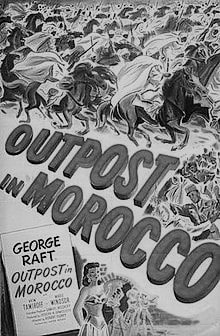 OUTPOST IN MOROCCO (1949)
OUTPOST IN MOROCCO (1949) (92 Min.) Genre: 1940 ACTION, Transfer Quality: B
While under contract to Warner Bros., George Raft turned down picture after picture as being "unimportant" and thus unworthy of his talents. Among his turned-down projects were such minor items as High Sierra and Casablanca. By 1949, however, Raft's star had eclipsed, and he was obliged to accept whatever came along. Outpost in Morocco wasn't exactly a "B" picture -- it was expensively filmed on location -- but neither was it in the same league as Raft's earlier vehicles. Cast as Capt. Paul Gerard, a foreign-legion officer, Raft finds himself on the horns of a dilemma. He must protect his garrison from the rebel hordes of a native Emir (Eduard Franz) -- who happens to be the father of Cara (Marie Windsor), the woman Gerard loves. Akim Tamiroff easily steals the show as Gerard's slovenly second-in-command. The film truly comes to life only during the battle scenes, which utilize the services of hundreds of genuine Legionnaires and Moroccan cavalrymen.
Starring: George Raft, Marie Windsor, Akim Tamiroff, John Litel, Eduard Franz | Directed by: Robert Florey
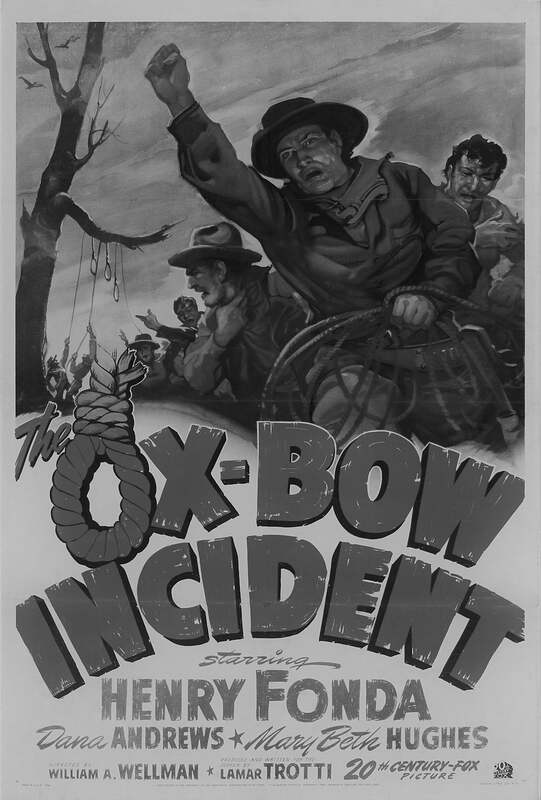 OX-BOW INCIDENT, THE (1943)
OX-BOW INCIDENT, THE (1943) (75 Min.) Genre: 1940 ACTION, Transfer Quality: A
This now-classic indictment of mob rule was a pet project of both star Henry Fonda and director William Wellman, both of whom agreed to work on lesser 20th Century-Fox projects in exchange for this film. After a hard winter on the range, cowboys Gil Carter (Fonda) and Art Croft (Harry Morgan) ride into a fleabitten small town for a drink. Within minutes, they get mixed up in a barroom brawl, which earns them the animosity of the locals. By and by, word reaches town that a local rancher has been killed by rustlers. With the sheriff out of town, a lynch mob is formed under the leadership of Major Tetley (Frank Conroy), a former Confederate officer who hopes to recapture past glories. Worried that they'll be strung up, Carter and Croft reluctantly join the mob and head out of town. In the dark of night, the group comes across three sleeping transients: a farmer named Martin (Dana Andrews), a Mexican (Anthony Quinn), and a senile old man (Francis Ford). The fact that Martin carries no bill of sale written by the so-called murder victim is evidence enough for Tetley to demand that the three men be hanged on the spot. Carter knows that this is a gross miscarriage of justice, but he's helpless to intervene. Resolving himself to his fate, Martin gives Carter a letter to deliver to his wife. The three unfortunates die at the end of the rope, and the mob rides off, only to discover that there never was a murder of any kind. Based on a novel by Walter Van Tilburg Clark, The Ox-Bow Incident is not so much a western as a gothic melodrama, with deep, looming shadows and atmospheric underlighting worthy of The Cabinet of Dr. Caligari. Though the film lost a fortune at the box office (a fact that Fox head Darryl F. Zanuck never tired of pointing out to Fonda and Wellman), it gains in stature with each passing year. — Hal Erickson
Starring: Henry Fonda, Mary Beth Hughes, Dana Andrews, Anthony Quinn | Directed by: William Wellman
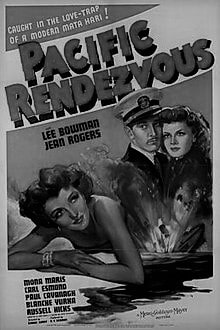 PACIFIC RENDEZVOUS (1942)
PACIFIC RENDEZVOUS (1942) (75 Min.) Genre: 1940 ACTION, Transfer Quality: A
Pacific Rendezvous is a B-picture remake of the 1935 MGM A-picture Rendezvous, updated to accommodate WW2. Lee Bowman plays the old William Powell role as a American naval intelligence operative (this time named Lt. Bill Gordon) assigned to decipher enemy code. His mission is compromised by his romance with dizzy debutante Elaine Carter (Jean Rogers, in the role originated by Rosalind Russell). Despite Elaine's well-meaning ineptitude, our hero is able to foil the plans of a group of Nazi agents. Easy to take, Pacific Rendezvous may not be any classic-but then, neither was the original film. — Hal Erickson
Starring: Lee Bowman, Jean Rogers, Carl Esmond, Paul Cavanagh | Directed by: George Sidney
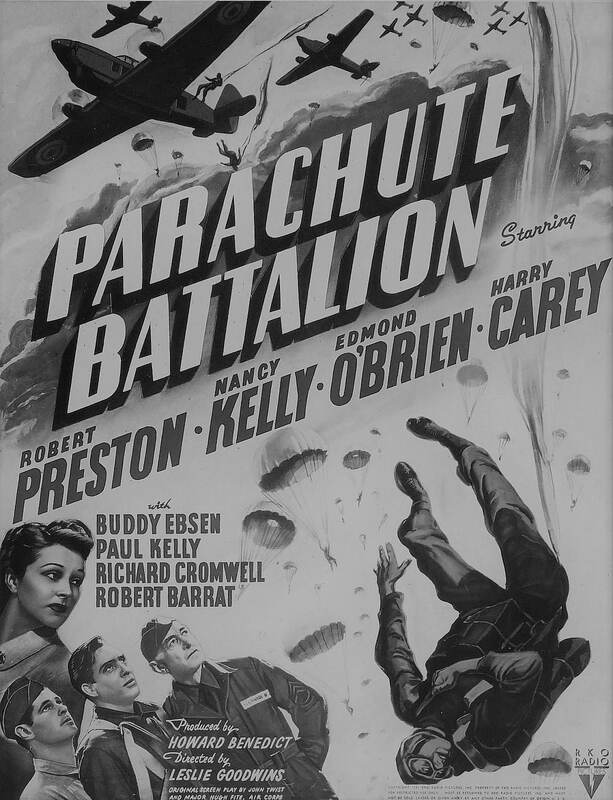 PARACHUTE BATTALION (1941)
PARACHUTE BATTALION (1941) (75 Min.) Genre: 1940 ACTION, Transfer Quality: B
In this patriotic war drama, a unit of Army recruits train for a parachute corps. One is an arrogant football star who finds jumping a kick. Another is a coward who eventually finds his courage. Finally there is a chronic bumbler. The coward and jock find themselves competing for the affections of an indecisive young woman. The filmmakers of this movie paid careful attention to detail and was made with the cooperation of the 501st Parachute Battalion at Fort Benning, Georgia using actual paratroopers. The viewer is taken through every stage of a jump including folding the chute at the beginning.
Starring: Robert Preston, Edmond O'Brien, Nancy Kelly, Harry Carey, Buddy Ebsen, Richard Cromwell | Directed by: Leslie Goodwins
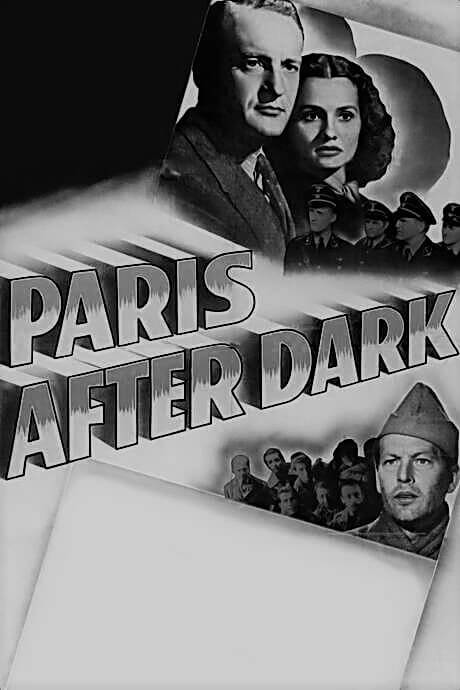 PARIS AFTER DARK (1943)
PARIS AFTER DARK (1943) (85 Min.) Genre: 1940 ACTION, Transfer Quality: B
This French Underground melodrama stars George Sanders as a seemingly apolitical Parisian doctor who is actually a resistance leader. Sanders' nurse (Brenda Marshall) is likewise a French patriot--less so the nurse's husband (Philip Dorn), who has become disillusioned after two years in a POW camp. The husband changes his mind and joins the Resistance, though he and several other freedom fighters lose their lives to German bullets. Worth noting in Paris After Dark is the fact that several of the personnel involved were actual French refugees, including director Leonide Moguy and husband-and-wife supporting actors Marcel Dalio and Madeleine LeBeau.
Starring: Philip Dorn, George Sanders, Brenda Marshall, Madeleine LeBeau | Directed by: Leonide Moguy
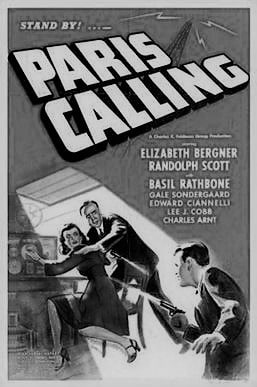 PARIS CALLING (1941)
PARIS CALLING (1941) (93 Min.) Genre: 1940 ACTION, Transfer Quality: B
Made just before America's entry into World War II, Paris Calling is one of the earliest French Underground adventures. When the German march into Paris, a polyglot of French patriots organize to undermine the Nazi occupation troops (represented by Lee J. Cobb, who plays his character with a surprising amount of depth). Elizabeth Bergner plays a French aristocrat who learns that her ex-fiance (Basil Rathbone) is a collaborator; she agrees to help the Underground, even unto killing her former lover. Gale Sondergaard, normally a villain, is sympathetically cast as a blowsy waterfront entertainer whose waterfront dive serves as Resistance headquarters. And how do the neutral Americans figure into all of this? Yankee-doodle-dandy Randolph Scott parachutes into view as a pilot for the RAF.
Starring: Elisabeth Bergner, Randolph Scott, Basil Rathbone, Gale Sondergaard | Directed by: Edwin L. Marin
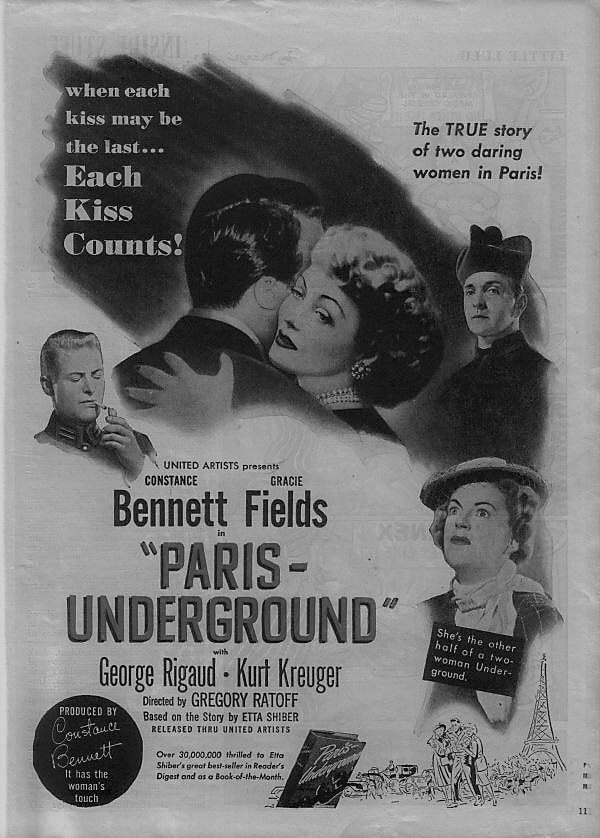 PARIS UNDERGROUND (1945)
PARIS UNDERGROUND (1945) (97 Min.) Genre: 1940 ACTION, Transfer Quality: A
Constance Bennett both produced and starred in the espionager Paris Underground. Bennett and Gracie Fields play, respectively, an American and an English citizen trapped in Paris when the Nazis invade. The women team up to help Allied aviators escape from the occupied city into Free French territory. The screenplay was based on the true wartime activities of Etta Shiber, who engineered the escape of nearly 300 Allied pilots. British fans of comedienne Gracie Fields were put off by the scenes in which she is tortured by the Gestapo, while Constance Bennett's following had been rapidly dwindling since the 1930s; as a result, the heartfelt but tiresome Paris Underground failed to make a dent at the box-office. It would be Constance Bennett's last starring film—and Gracie Fields' last film, period. — Hal Erickson
Starring: Gracie Fields, Kurt Kreuger, Eily Malyon, Charles Andre, Constance Bennett | Directed by: Gregory Ratoff
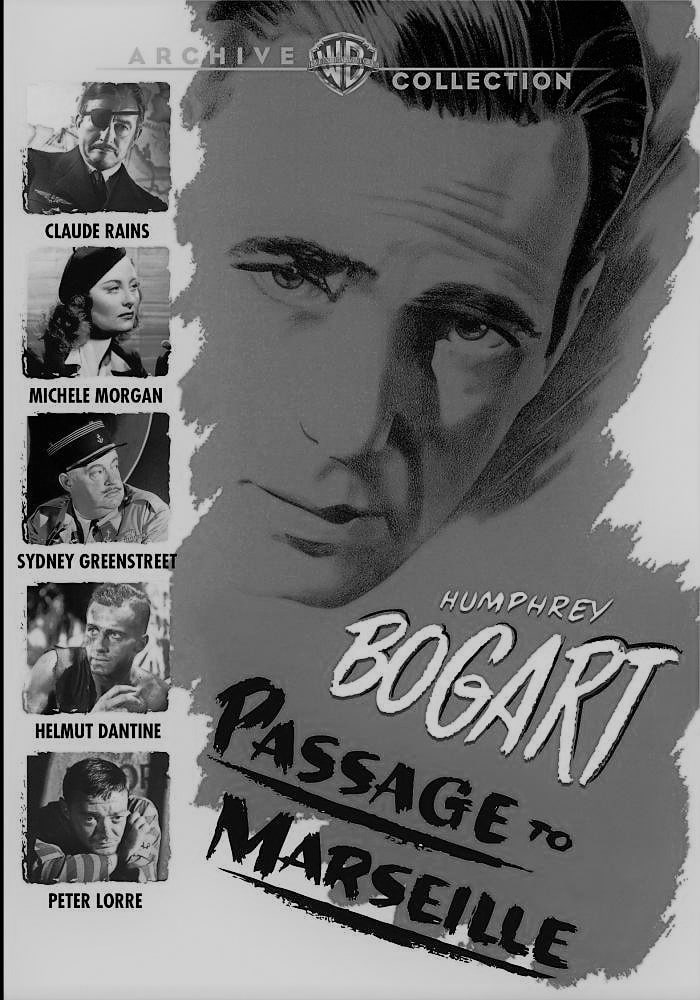 PASSAGE TO MARSEILLE (1944)
PASSAGE TO MARSEILLE (1944) (110 Min.) Genre: 1940 ACTION, Transfer Quality: A
Designed as a followup to the enormously successful Casablanca, Passage to Marseille utilizes the talents of many of the on- and off-screen personnel of the earlier Warner Bros. classic. Unfolded in a complex flashback-within-flashback structure, this is the story of Matrac (Humphrey Bogart), a freedom-loving French journalist who sacrifices his happiness and security to battle Nazi tyrrany. The film opens as French liason officer Freycinet (Claude Rains), stationed in London, tells Mantrac's story to a British reporter (John Loder). Freycinet reveals that Mantrac, happily married to Paula (Michele Morgan), was framed by pro-fascists and sentenced to Devil's Island. Here he engineered a daring escape with such lost souls as Marius (Peter Lorre), Garou (Helmut Dantine), Petit (George Tobias) and Renault (Philip Dorn). Adrift in a lifeboat, the escapees were picked up by a French vessel commandeered by pro-fascist Major Duval (Sydney Greenstreet). With the help of Mantrac and the prisoners, the ship's patriotic captain (Victor Francen) thwarted Duval's evil machinations, enabling Mantrac to continue his battle against Nazism as a member of the RAF. By modern standards, Passage to Marseille is overproduced, overdirected, overacted and overscored (by Max Steiner); however, it filled a definite need in wartime America, and proved a huge financial success. — Hal Erickson
Starring: Humphrey Bogart, Claude Rains, Michèle Morgan, Sydney Greenstreet, Peter Lorre | Directed by: Michael Curtiz
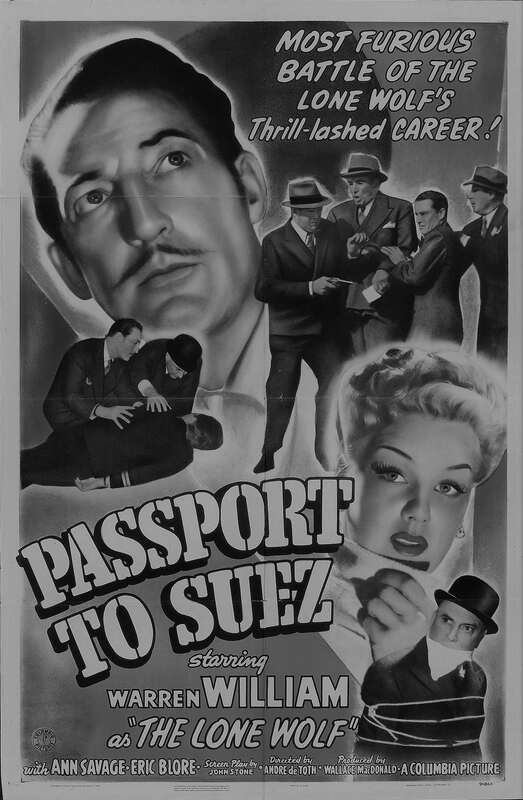 PASSPORT TO SUEZ (1943)
PASSPORT TO SUEZ (1943) (72 Min.) Genre: 1940 ACTION, Transfer Quality: B
Though it's not made readily apparent by the title, Passport to Suez was the 10th entry in Columbia's "Lone Wolf" series. Warren William returns as amateur sleuth Michael Lanyard, aka the Lone Wolf, while Eric Blore is his faithful valet Jamison. In this outing, Lanyard finds himself in Alexandria, Egypt, where he works as an unofficial espionage agent for the Allies. Nazi spies threaten to murder Jamison if Lanyard does not agree to steal valuable military documents from the British Embassy. Among the suspicious characters weaving in and out of the proceedings are Johnny Booth (Sheldon Leonard), a "Rick Blaine" style café proprietor, and Valerie King (Ann Savage) a secret agent posing as a journalist. One of the film's cuter script touches is a trio of spies with "artistic" code names: Rembrandt, Cezanne, and The Whistler.
Starring: Warren William, Ann Savage, Eric Blore, Sheldon Leonard | Directed by: André De Toth
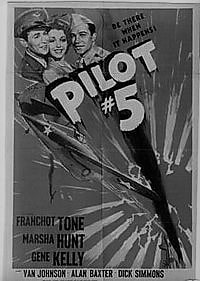 PILOT NO. 5 (1943)
PILOT NO. 5 (1943) (71 Min.) Genre: 1940 ACTION, Transfer Quality: A
Pilot No. 5 is an oddly liberal-minded film to come from conservative old MGM. Franchot Tone plays an army pilot stationed in Java who volunteers for a suicide mission. He is chosen from five possible Allied candidates, hence the title. We learn via flashback just why Tone holds his life at so low a price; among his less pleasant reminiscences are his brief association with a demagogic Southern governor, blatantly based on Huey Long. Pilot No. 5 served to introduce Gene Kelly in a supporting role—as a nasty, pugnacious young jerk. — Hal Erickson
Starring: Franchot Tone, Marsha Hunt, Gene Kelly, Van Johnson, Ava Gardner | Directed by: George Sidney
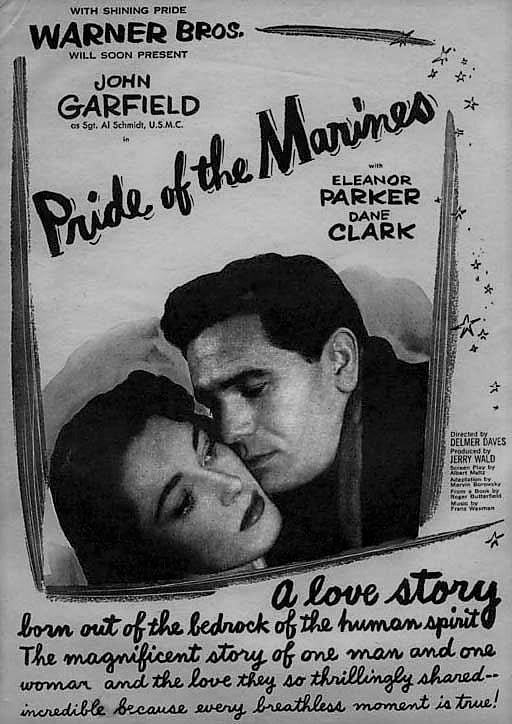 PRIDE OF THE MARINES (1945)
PRIDE OF THE MARINES (1945) (120 Min.) Genre: 1940 ACTION, Transfer Quality: A
John Garfield stars as Al Schmid, a true-life marine who served in World War II. Schmid becomes a hero at Guadalcanal, defending a machine gun post and killing 200 Japanese before he is permanently blinded by a grenade. Despite being awarded the Navy Cross, Schmid returns home embittered by his disability. After a long and grueling convalescence, he is shaken back to life by his girl friend Ruth (Eleanor Parker) and his best pal (Dane Clark), neither of whom allow Al to wallow in self-pity. The pride in Pride of the Marines comes from Al Schmid's ultimate realization that his sacrifice was worthwhile, and that his sightlessness need not prevent him from leading a full and rewarding life. — Hal Erickson
Starring: John Garfiled, Eleanor Parker, Dane Clark, Ann Doran, Charles Bickford | Directed by: Delmer Daves
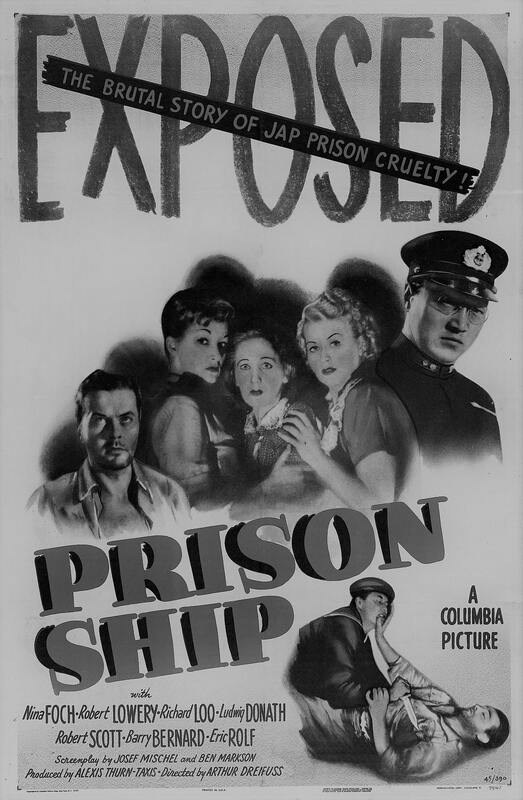 PRISON SHIP (1945)
PRISON SHIP (1945) (60 Min.) Genre: 1940 ACTION, Transfer Quality: C
In this WW II drama, American POWs aboard a Japanese ship revolt when they learn that their vessel is to used as a decoy for an American submarine. The rebellion is quite bloody and 30 women and children die before the Yankees break into the radio room and announce their presence to the oncoming submarine. Shots are fired, but at last the Americans beat the Japanese and are rescued.
Starring: Nina Foch, Robert Lowery, Richard Loo, Ludwig Donath | Directed by: Arthur Dreifuss
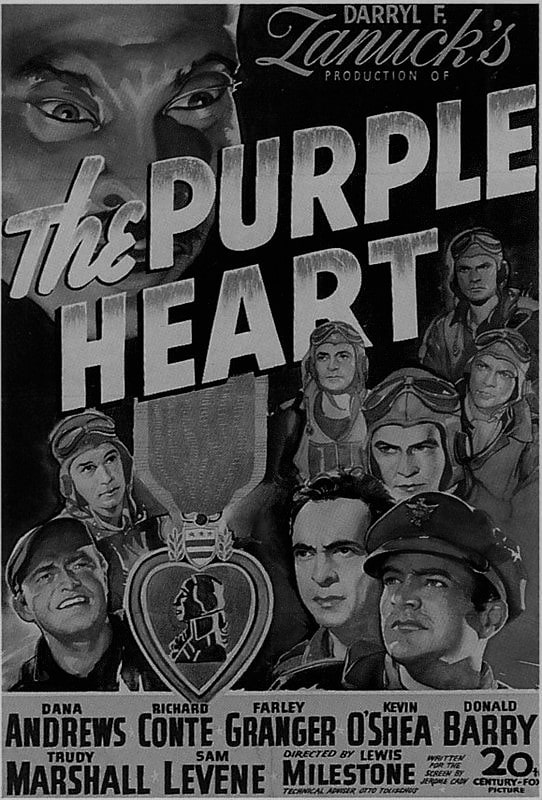 PURPLE HEART, THE (1944)
PURPLE HEART, THE (1944) (99 Min.) Genre: 1940 ACTION, Transfer Quality: A
The year is 1942: eight American airmen crash-land during the Doolittle bombing raid on Tokyo and are taken prisoner. Though slated for execution, the pilots are put through a "show trial" by the military, on a charge of committing war crimes. The Japanese judges promise to be merciful if only the Americans will reveal vital US military secrets. But captain Dana Andrews speaks for the rest of his melting-pot crew-some of whom have been subjected to the most horrific of tortures—when he chooses death before dishonor. In its own way, The Purple Heart is as racist a piece of propaganda as was ever produced by Hollywood. The Japanese are shown to be little more than sadistic beasts (at one point, the judges interrupt the trial by moronically shouting "Banzai" after receiving news of a military victory), while hissing, buck-toothed interrogator Richard Loo ("I attended your...Amelican universities"), unable to admit that he's been wrong about Yankee resilience, commits hara-kiri. Remember, however, that The Purple Heart was made at a time when America was still at war with Japan, and political correctness was hardly a consideration. Its jingoism aside, the film is a first-rate piece of moviemaking, socked across by director Lewis Milestone with the same fervor that he'd expended on his anti-war masterpiece All Quiet on the Western Front (1930). — Hal Erickson
Starring: Dana Andrews, Richard Conte, Farley Granger | Directed by: Lewis Milestone
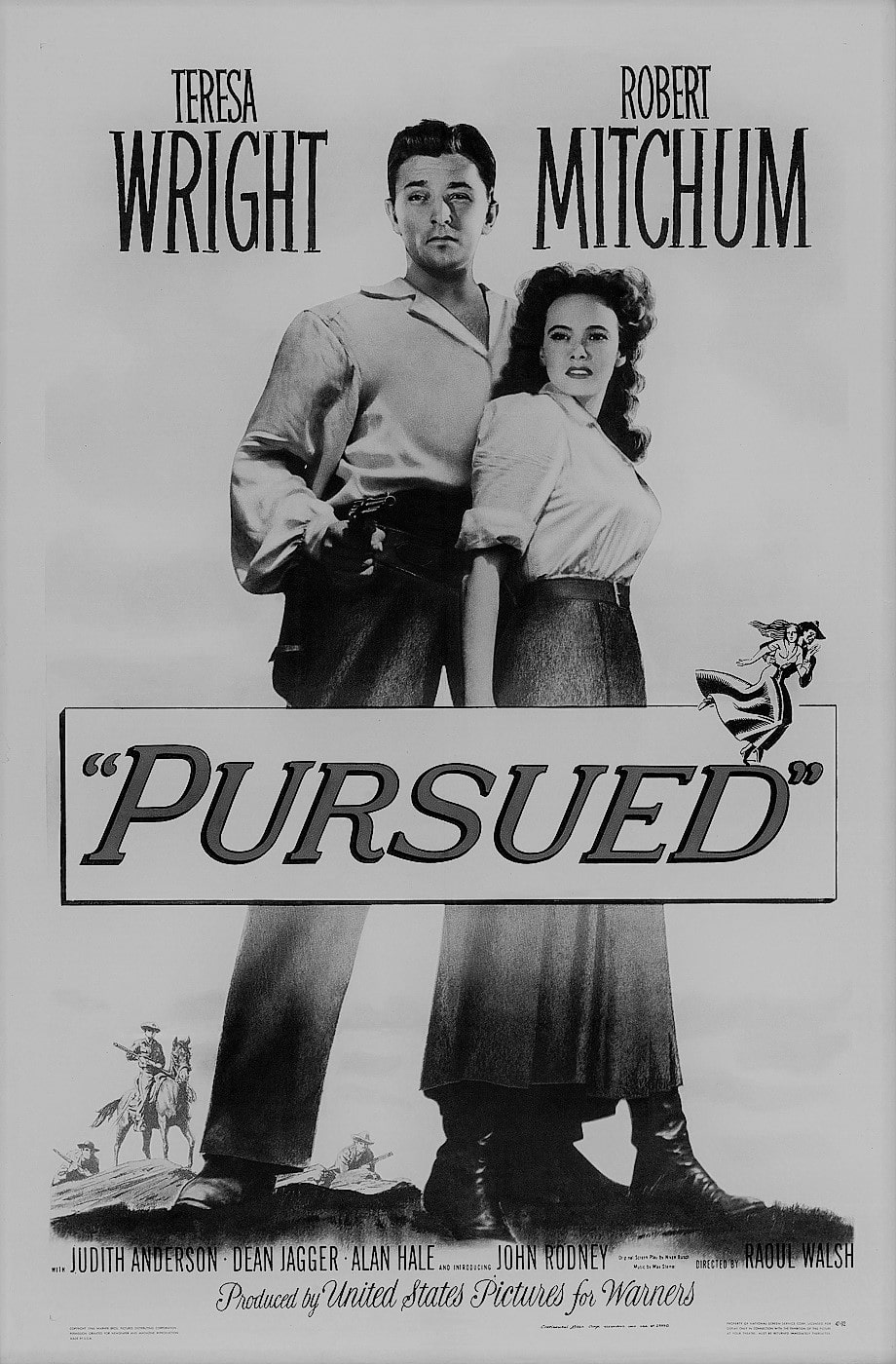 PURSUED (1947)
PURSUED (1947) (101 Min.) Genre: 1940 ACTION, Transfer Quality: A
Chased by a posse to a remote cabin, Jeb (Robert Mitchum) is joined by his fearful wife Thorley (Teresa Wright), awaiting the arrival of the men tracking them, as they try to reason out what has gone wrong in their lives. Jeb can't remember anything about his early childhood except for a horrible incident in which the people around him were killed by a mysterious stranger, whose flashing spurs were all the boy saw. He was raised by Ma Callum (Judith Anderson), alongside her two children, Thorley and Adam, as one of her own. But every time Jeb seemed poised to find peace, or even simple stability in his life, lurking nearby was Grant (Dean Jagger), a one-armed stranger who seemed bent on tormenting Jeb — Jeb doesn't know who he really is, much less who Grant is, but Grant knows enough about him and is good enough at manipulating human nature to make Jeb a target for jealousy and murder. Making Jeb's life even more complicated is the fact that he and his adopted sister Thorley fell in love with each other, while Adam (John Rodney), his adopted brother, has come to hate him. The machinations around Jeb and Thorley come home to roost in multiple shootings and murder, a deadly chase and a long-planned lynching. — Bruce Eder
Starring: Teresa Wright, Robert Mitchum, Judith Anderson, Dean Jagger | Directed by: Raoul Walsh
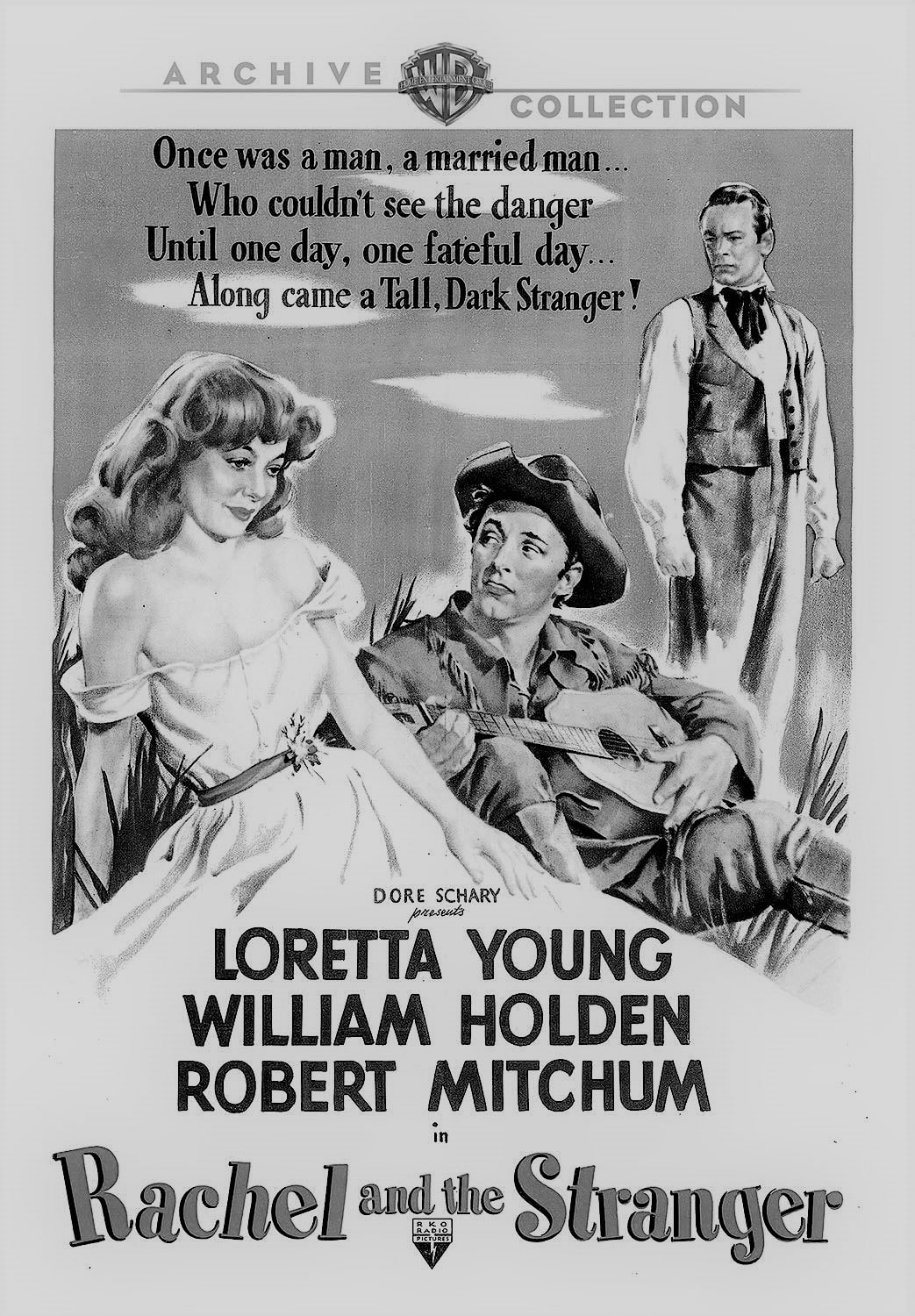 RACHEL AND THE STRANGER (1948)
RACHEL AND THE STRANGER (1948) (79 Min.) Genre: 1940 ACTION, Transfer Quality: A
This late-40s western features Robert Mitchum as an Indian scout who happens upon an unlikely family cabined up in the Great Northwest. They're unlikely because the widower settler (William Holden) has "purchased" a wife (Loretta Young as wife Rachel) to help raise his son and do the female chores around the farm. The son resents the surrogate mom and the whole bunch aren't too happy when Mitchum shows up and starts making eyes at the lady. Their mutual attraction makes Holden jealous and he starts finding his wife a lot more attractive. It takes a full-fledged Indian attack to force the action, resolving the issue as to who's the right fella for Rachel. — All Movie Guide
Starring: Loretta Young, William Holden, Robert Mitchum, Gary Gray | Directed by: Norman Foster
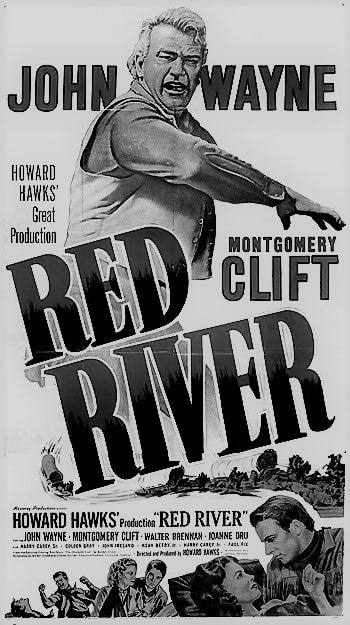 RED RIVER (1948)
RED RIVER (1948) (133 Min.) Genre: 1940 ACTION, Transfer Quality: A
Director Howard Hawks' second western was also his first collaboration with John Wayne. Officially based on Borden Chase's novel The Chisholm Trail, the film also owes a great deal to Mutiny on the Bounty, both structurally and in the adversarial relationship between the two leading characters. Wayne stars as headstrong frontiersman Tom Dunson, who is taking his leave of a westbound wagon train to seek his fortune in Texas. This impulsive act loses him the love of his fiancée Fen (Colleen Gray) but gains him a lifelong friend in the person of (occasionally) toothless old camp cook Groot Nadine (Walter Brennan). Not long afterward, Dunson discovers that Fen was killed in an Indian raid, a fact that leaves him an emotionless cipher. The only survivor of the tragedy is a young orphan named Matthew Garth (Mickey Kuhn), whom Dunson unofficially adopts as his son. As the years pass, the tactiturn Dunson becomes the most powerful and feared cattle baron in the territory, but the grown-up Garth (now played by Montgomery Clift, in his first film appearance) eventually rebels against Dunson's stubbornness and autocratic behavior, striking out on his own as his surrogate father growls: "Some day you'll turn around and I'll be there; I'm gonna kill ya, Matt." As time passes, Garth, leading his own cattle drive, becomes Dunson's most formidable rival. The huge cast includes John Ireland in perhaps his best role as the enigmatic gunman Cherry Valance; both Harry Carey, Sr. and Harry Carey, Jr.; and an uncredited Shelley Winters as a dance hall girl. Except for the sappy scenes with love interest Joanne Dru, everything works in Red River, from the stirring Dmitri Tiomkin score to Russell Harlan's brooding black-and-white cinematography. In his quest for perfection, Hawks went $1 million overbudget and several months over schedule, but the end result was a $4 million hit. Essential viewing for western buffs in particular and film buffs in general, Red River currently exists in two release versions: the preferable 133-minute directors' cut, and a 125-minute studio cut, narrated by Walter Brennan. — Hal Erickson
Starring: John Wayne, Montgomery Cliff, Walter Brennan, Joanne Dru, Coleen Gray | Directed by: Howard Hawks
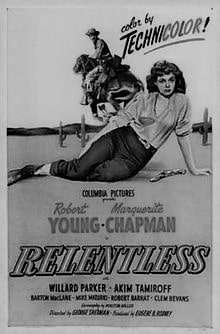 RELENTLESS (1948)
RELENTLESS (1948) (93 Min.) Genre: 1940 ACTION, Transfer Quality: A
Described by one critic as a western version of The 39 Steps, Relentless stars Robert Young as a cowboy on the lam. Framed for murder, Young must find the one man who can clear him, while a posse dogs his trail. He briefly becomes an outlaw, hoping to make contact with his quarry by befriending the dregs of the west, notably mercenary saloon keeper Akim Tamiroff. Marguerite Chapman plays the love interest, while Barton MacLaine does his usual as the main heavy. Directed at a rapid clip by George Sherman, Relentless does its best to live up to its title. — Hal Erickson
Starring: Robert Young, Marguerite Chapman, Willard Parker, Akim Tamiroff | Directed by: George Sherman
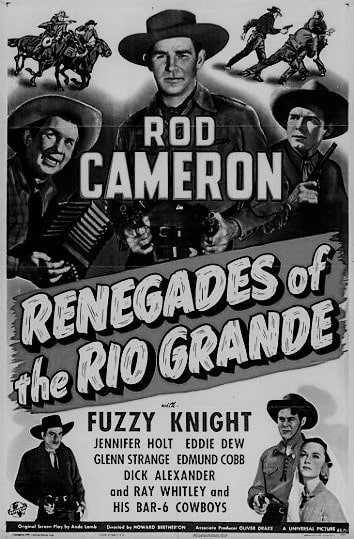 RENEGADES OF THE RIO GRANDE (1945)
RENEGADES OF THE RIO GRANDE (1945) (57 Min.) Genre: 1940 ACTION, Transfer Quality: A
In this western, a young man infiltrates a vicious gang of bank robbers in order to capture his father's killer.
Starring: Ethan Laidlaw, Fuzzy Knight, John James, Ray Whitley | Directed by: Howard P. Bretherton
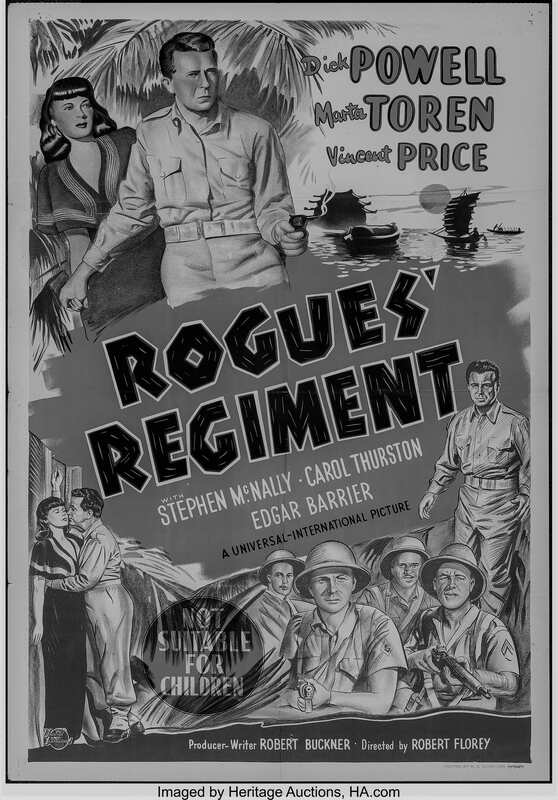 ROGUE'S REGIMENT (1948)
ROGUE'S REGIMENT (1948) (85 Min.) Genre: 1940 ACTION, Transfer Quality: B
Even when decked out in a Foreign Legion uniform, Dick Powell looked, talked and acted like an urban private eye. In Rogues' Regiment, American secret agent Whit Corbett (Dick Powell) joins the Legion in order to track down Nazi war criminal Carl Reicher (Stephen McNally) in French Indo-China. Hampering his search is a native uprising which consumes most of the film's running time. Vincent Price contributes an amusingly despicable supporting role as Mark Van Ratten, an erudite art collector who sidelines in gunrunning. Though Dick Powell doesn't get to sing (not that he really wanted to!), leading-lady Marta Toren offers two sultry nightclub numbers. — Hal Erickson
Starring: Dick Powell, Märta Torén, Vincent Price, Stephen McNally | Directed by: Robert Florey
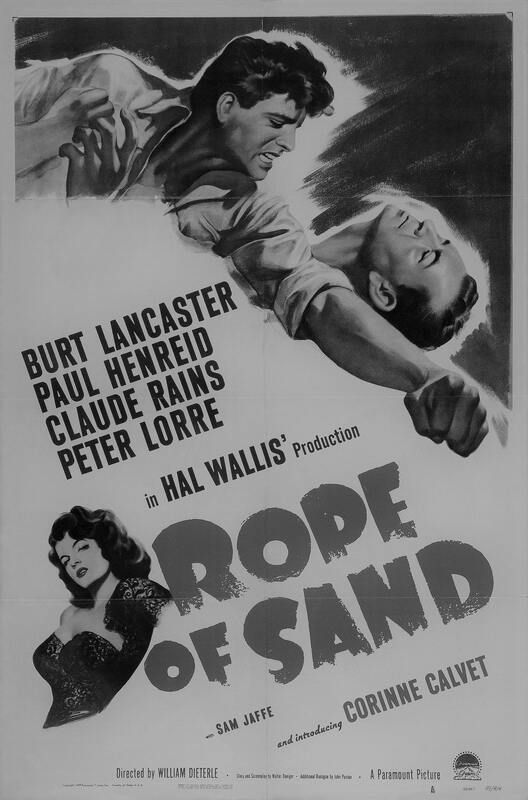 ROPE OF SAND (1949)
ROPE OF SAND (1949) (104 Min.) Genre: 1940 ACTION, Transfer Quality: B
Producer Hal Wallis evidently hoped to recapture the magic of his earlier Casablanca with 1949's Rope of Sand. To that end, he hired three of Casablanca's supporting players: Paul Henreid, Claude Rains, and Peter Lorre. This time, Henreid is the villain, a sadistic police inspector named Paul Vogel. Stationed somewhere in Africa, Vogel hopes to find a legendary lost diamond field. His principal rival in this endeavor is jewel thief Mike Davis (Burt Lancaster), who continues bouncing back from every death trap lain for him by the ill-tempered Vogel. The scenes in which Davis is subjected to various physical tortures is pretty raw for a 1940s film. Claude Rains co-stars as a diamond syndicate head misleadingly named Toady, while Peter Lorre does his shifty-mercenary act. Billed ninth as the nominal heroine is Hal Wallis' latest discovery, French actress/singer Corinne Calvet.
Starring: Burt Lancaster, Paul Henreid, Claude Rains, Peter Lorre, Sam Jaffe | Directed by: William Dieterle
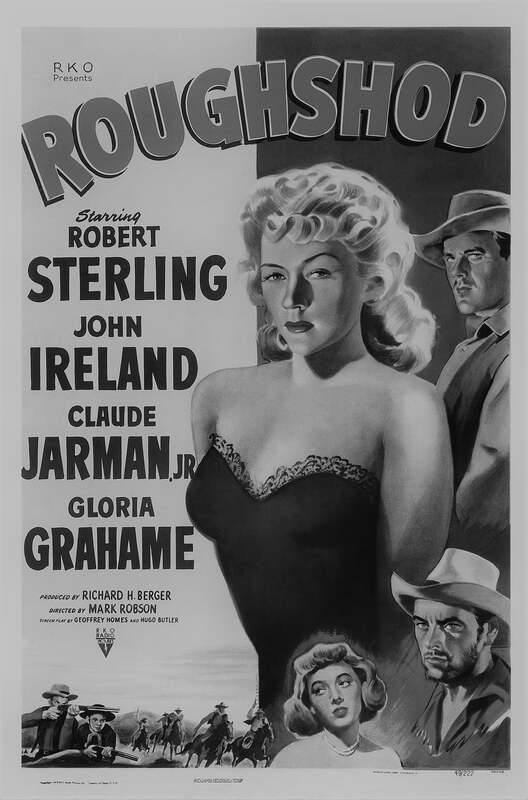 ROUGHSHOD (1949)
ROUGHSHOD (1949) (88 Min.) Genre: 1940 ACTION, Transfer Quality: A
Hovering somewhere between an "A" and "B" production, RKO's Roughshod is an expert blend of western and film noir. Robert Sterling and Claude Jarman Jr. star as young cattleman Clay Phillips and his kid brother Steve. Stalked across the Sonora Pass by an ex-con who has vowed to kill Clay, the brothers find themselves the reluctant escorts for a quartet of stranded dance-hall girls. While the puritanical Clay adopts a strict "hands off" policy, he finds himself falling in love with one of the girls (Gloria Grahame — the other ladies are played by Martha Hyer, Myrna Dell and Jeff Donnell). The climax is a nail-biting wilderness showdown between the heroes and villain Lednov (John Ireland). On the strength of Roughshod, director Mark Robson was elevated to more prestigious film assignments. — Hal Erickson
Starring: Robert Sterling, Gloria Grahame, Claude Jarman, Jr, John Ireland | Directed by: Mark Robson
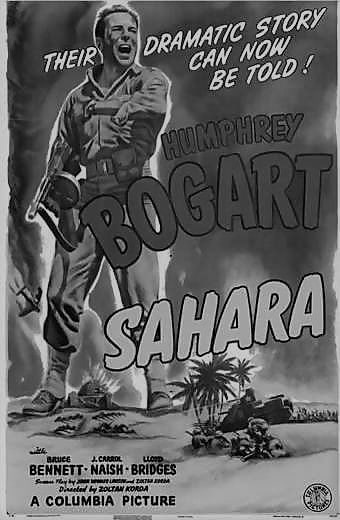 SAHARA (1943)
SAHARA (1943) (97 Min.) Genre: 1940 ACTION, Transfer Quality: A
Humphrey Bogart considered this World War II action epic from director Zoltan Korda one of his finest films. Sergeant Joe Gunn (Bogart) is the commander of an American M-3 tank crew allied to the British Eighth Army, which is defeated by the Germans at Tobruk. Joining the scattered retreat across the Libyan desert, Gunn and his two remaining men, Jimmy Doyle (Dan Duryea) and Waco Hoyt (Bruce Bennett) search for water. Instead the tank crew finds an international mix of stragglers, including an officer doctor (Richard Nugent) with several soldiers and a British Sudanese sergeant, Tambul (Rex Ingram), with his Italian prisoner of war (J. Carrol Naish). The rag-tag column shoots down an attacking plane and takes its German pilot (Kurt Kreuger) as a second captive, although a soldier, Fred Clarkson (Lloyd Bridges) is killed in the fighting. After one well turns out to be dry, the troupe finally reaches an abandoned mosque with a well that provides a trickle of water. Two more prisoners are taken while scouting the area and reveal that an entire German battalion is en route to the same well. Gunn misleads them into believing that there is plenty of water to go around, sets them free to report back to their superiors, and then persuades his fellow Allies to help him fight the enemy force that's en route, even though they are staggeringly outnumbered. A betrayal, an escaped prisoner, and bloody skirmishes follow in short order as Hoyt goes in search of help while Gunn and his compatriots attempt to crush the German battalion. Sahara (1943) inspired several subsequent action films, most notably Last of the Comanches (1952), and was remade as a 1995 cable television movie. — Karl Williams
Starring: Humphrey Bogart, Bruce Bennett, Lloyd Bridges, Rex Ingram, J. Carrol Naish | Directed by: Zoltan Korda
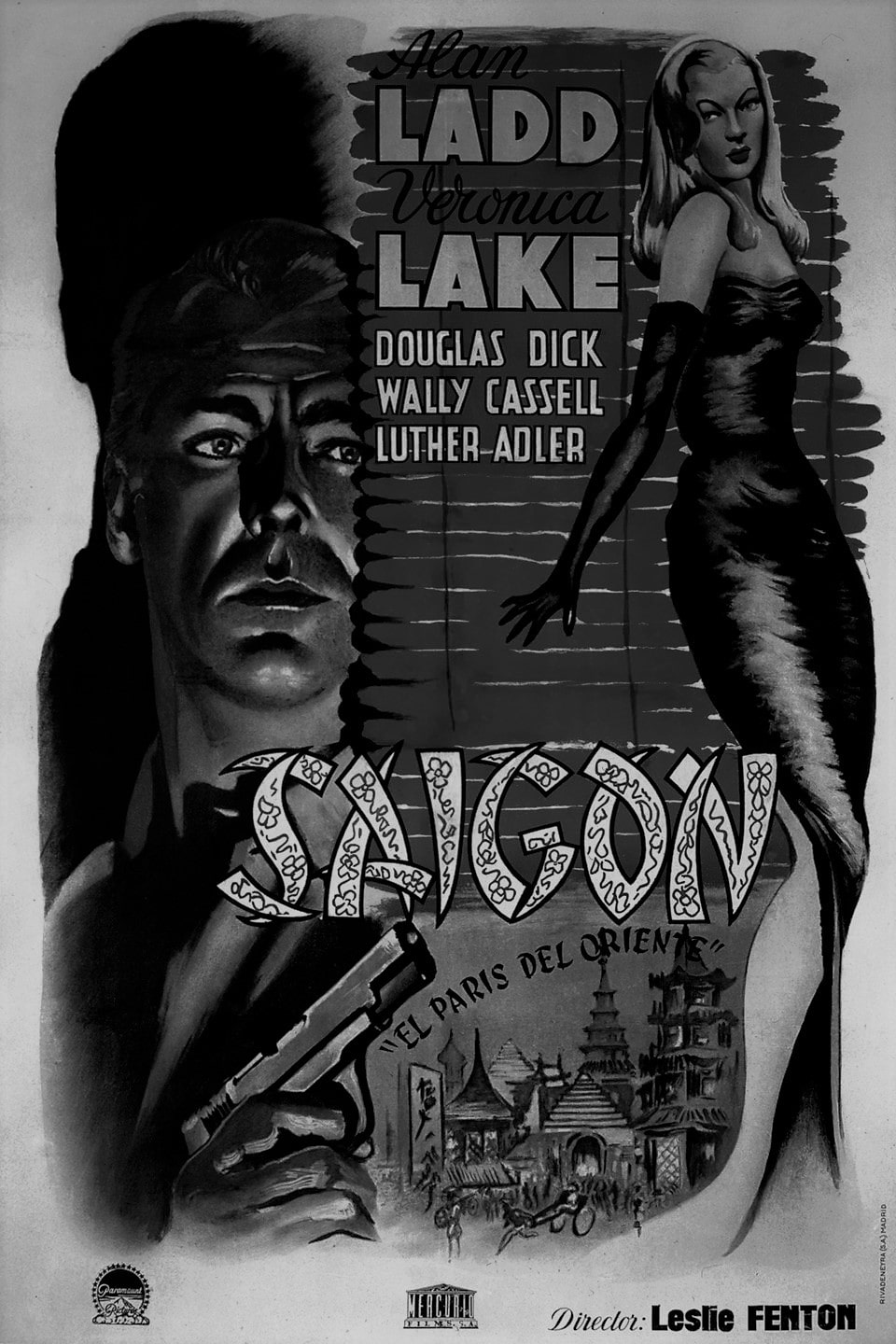 SAIGON (1948)
SAIGON (1948) (94 Min.) Genre: 1940 ACTION, Transfer Quality: B
One of the great onscreen romantic pairings, Alan Ladd and Veronica Lake, ended with this romantic adventure film, their fourth cinematic collaboration. In Shanghai after WWII, veteran pilots Larry Briggs (Ladd) and Pete Rocco (Wally Cassell) are dismayed when informed that friend Mike Perry (Douglas Dick) will soon die of a terminal illness. Larry and Pete decide to keep the tragic news from Mike and spend the next weeks showing him a high time. To finance the festivities, they accept an offer of $10,000 from unscrupulous war profiteer Zlex Maris (Morris Carnovsky) in exchange for a flight to Vietnam. When departure time arrives, Maris shows up with the police in hot pursuit, so the buddies take off with his secretary, Susan Neaves (Lake), whose briefcase contains Maris' earnings — $500,000. En route to Saigon, however, the crew crash-lands in an Asian jungle. As they make their way back to civilization with a detective (Luther Adler) tailing them, Mike develops feelings for Susan, who plays along at Larry's urging. Susan, however, is actually falling for Larry and vice versa.
Starring: Alan Ladd, Veronica Lake, Wally Cassell, Douglas Dick | Directed by: Leslie Fenton
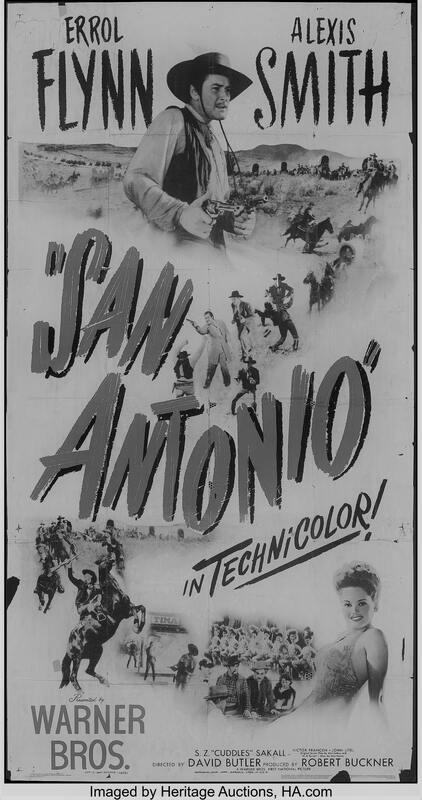 SAN ANTONIO (1945)
SAN ANTONIO (1945) (109 Min.) Genre: 1940 ACTION, Transfer Quality: A
In his final epic Western, Errol Flynn plays cattleman Clay Hardin, who, on a trek south of the border, has discovered that San Antonio saloon proprietor Roy Stuart (Paul Kelly) is actually a cattle rustler of major proportions. Determined to bring Stuart to justice, Clay runs into difficulties when he mistakes feted chanteuse Jeanne Starr (Alexis Smith) for being on the saloon owner's payroll. Meanwhile, Stuart's French-accented partner, and enemy, Legare (Victor Francen), uses the taut situation to benefit himself. Then Clay's longtime friend, Charlie Bell (John Litel), is brutally slain and Jeanne's manager, Sacha Bozic (S.Z. Sakall) is forced to skip town, Bozic, unbeknownst to Clay, having witnessed the murder. The real killer is eventually forced to confess and San Antonio erupts in a climactic gun battle that culminates in a shootout at the historic Alamo. With Hungarian actor Sakall providing some much-needed comedy relief, Alexis Smith, Doodles Weaver, and a chorus perform a few songs, including: Ray Heindorf, M.K. Jerome, and Ted Koehler's "Some Sunday Morning"; "Put Your Little Foot Right Out," by Larry Spier; and Jack Scholl and Charles Kisco's "Somewhere in Monterey." According to some reports, both Raoul Walsh and Robert Florey directed a few additional scenes. — Hans J. Wollstein
Starring: Errol Flynn, Alexis Smith, S.Z. Sakall, Victor Francen | Directed by: David Butler
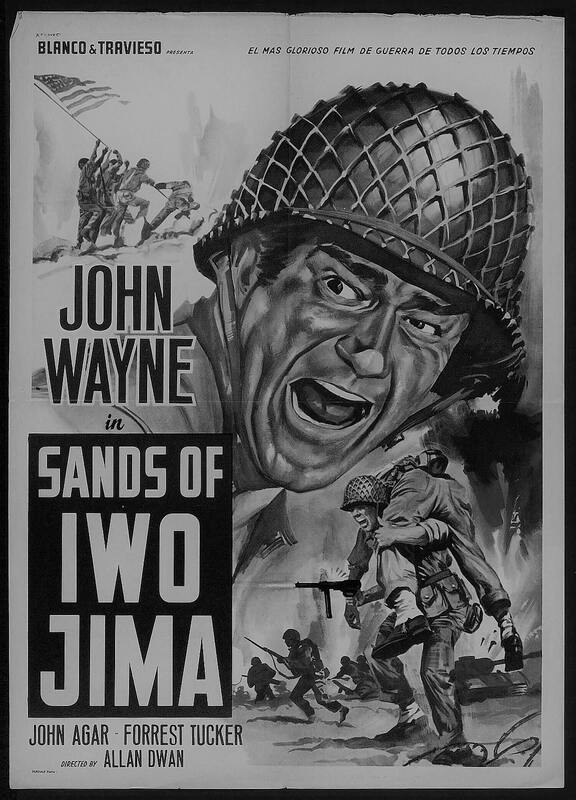 SANDS OF IWO JIMA (1949)
SANDS OF IWO JIMA (1949) (109 Min.) Genre: 1940 ACTION, Transfer Quality: A
From director Allan Dwan, Sands of Iwo Jima is a drama set during the Second World War and follows John Stryker (John Wayne), a relentlessly tough Marine sergeant as he trains a squad of naïve, rebellious recruits at a New Zealand military station in 1943. Recently left by his wife, Stryker has become exceedingly bitter and tough, leading his contemporaries to question his behavior and his men to dislike him for his harsh training methods. The wisdom of Stryker's ways, however, is demonstrated when they fight in the legendary battle of Iwo Jima. Using footage of real WWII battles, the Sands of Iwo Jima features John Wayne's first Academy Award-nominated performance, though Broderick Crawford ultimately won the 1950 Best Actor prize. — Matthew Tobey
Starring: John Wayne, John Agar, Adele Mara, Forrest Tucker | Directed by: Allan Dwan
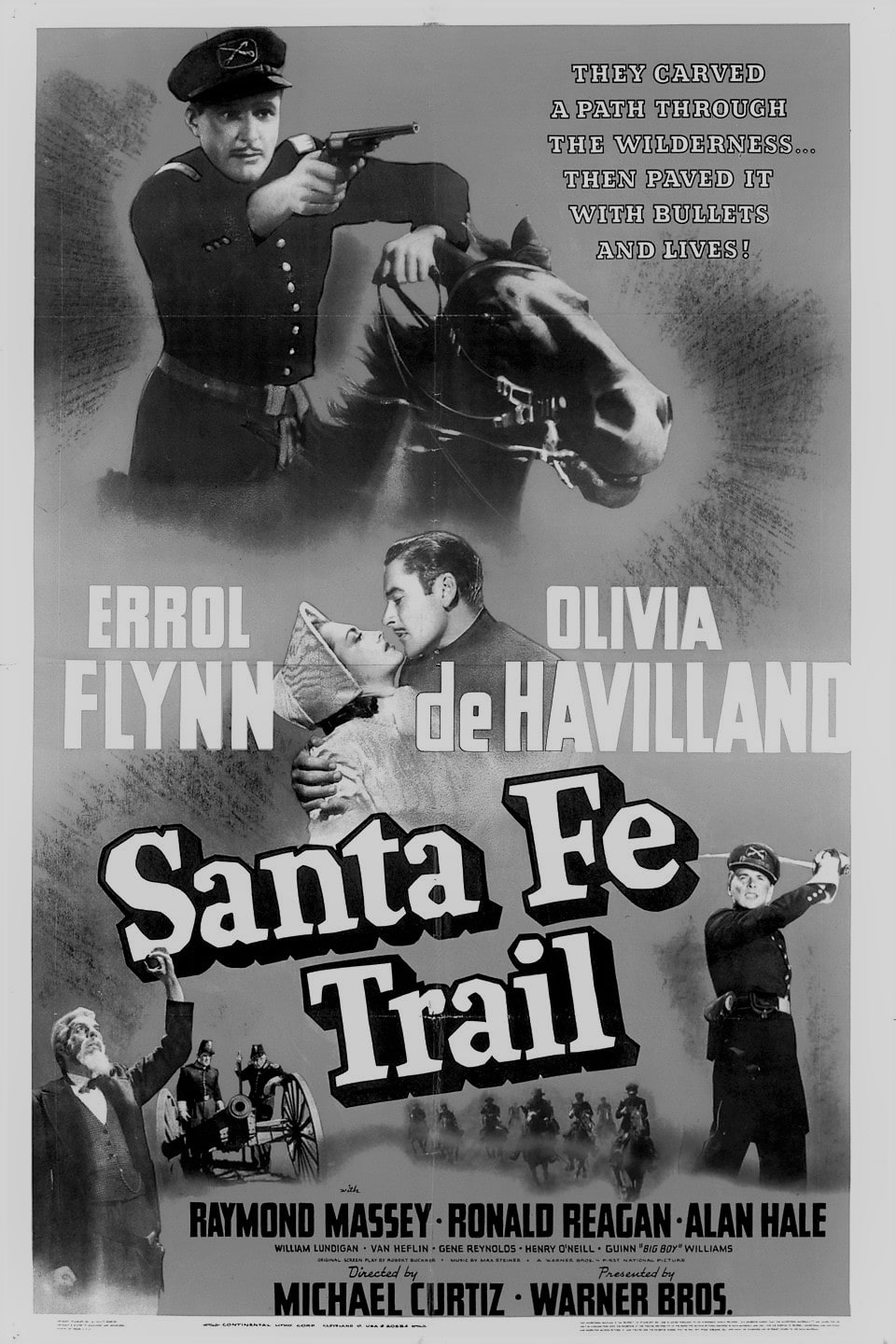 SANTA FE TRAIL (1940)
SANTA FE TRAIL (1940) (110 Min.) Genre: 1940 ACTION, Transfer Quality: A
Santa Fe Trail, Errol Flynn's third western, has precisely nothing to do with the titular trail. Instead, the film is a simplistic retelling of the John Brown legend, with Raymond Massey playing the famed abolitionist. The events leading up to the bloody confrontation between Brown and the US Army at Harper's Ferry, Virginia, are treated in a painstakingly even-handed fashion: Brown's desire to free the slaves is "right" but his methods are "wrong." Whenever the leading characters are asked about their own feelings towards slavery, the response is along the noncommittal lines of "A lot of people are asking those questions," "I don't have the answer to that," and so forth. Before we get to the meat of the story, we are treated to a great deal of byplay between West Point graduates Jeb Stuart (Flynn) and George Armstrong Custer (Ronald Reagan), who carry on a friendly rivalry over the affections of one Kit Carson Halliday (Olivia DeHavilland). Just so we know that the picture is meant to be a follow-up to Warners' Dodge City and Virginia City, Flynn is saddled with Alan Hale and "Big Boy" Williams, his comic sidekicks from those earlier films. Despite its muddled point of view, Santa Fe Trail is often breathtaking entertainment, excitingly staged by director Michael Curtiz. The film's public domain status has made Santa Fe Trail one of the most easily accessible of Errol Flynn's Warner Bros. vehicles. — Hal Erickson
Starring: Errol Flynn, Olivia de Havilland, Raymond Massey, Ronald Reagan | Directed by: Michael Curtiz
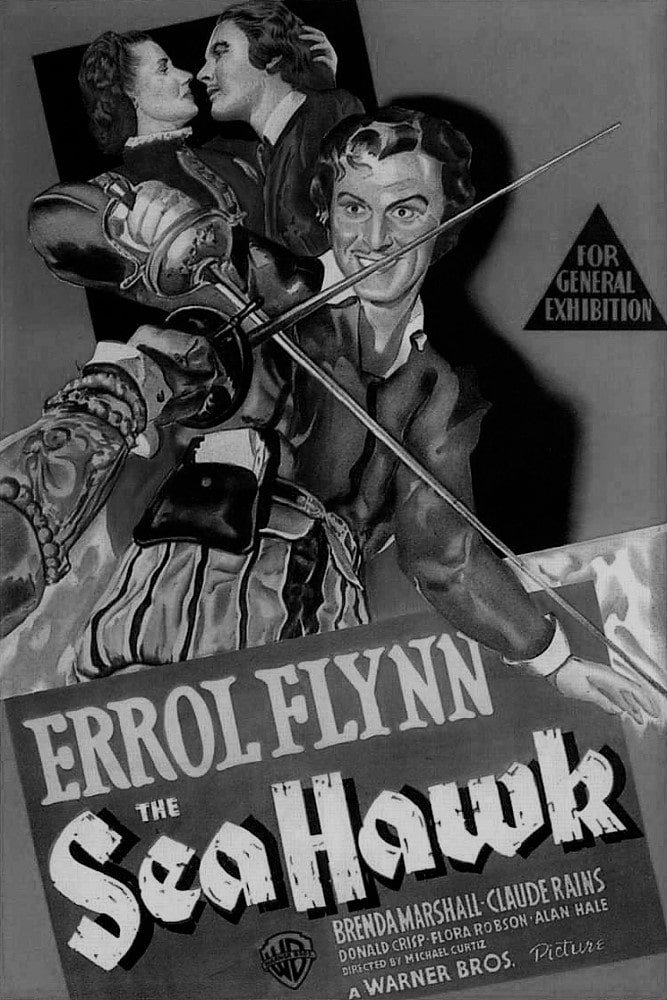 SEA HAWK, THE (1940)
SEA HAWK, THE (1940) (127 Min.) Genre: 1940 ACTION, Transfer Quality: A
Michael Curtiz and Errol Flynn, who had previously teamed up in Captain Blood (1935) and the The Adventures of Robin Hood (1938), join forces once again in this full-rigged adventure, one of the best of the swashbuckler genre. Based on a novel by Rafael Sabatini, the film follows the exploits of privateer Sir Geoffrey Thorpe (Errol Flynn), aka the Sea Hawk, as he raids Spanish ships to swell the coffers of England, under orders from Queen Elizabeth I (Flora Robson). At 1.7 million dollars, one of the most expensive films to date, this lavish production has just about everything one could ask of a seafaring adventure: swordplay, romance, a dashing hero, a dastardly villain (Claude Rains), beautifully choreographed sea battles, and two nations on the brink of war. Flynn, who could not have been more perfectly cast, is at the peak of his powers as the resourceful, insouciant pirate. He's aided by a huge supporting cast with many of the best character actors of the time, including Donald Crisp, Alan Hale, Gilbert Roland, Henry Daniell, and J.M. Kerrigan. But aside from Flynn, the film's key component is the lustrous score of Erich Korngold, who (along with Bernard Herrmann) was perhaps the finest film composer of the period. — Michael Costello
Starring: Errol Flynn, Brenda Marshall, Claude Rains, Donald Crisp | Directed by: Michael Curtiz
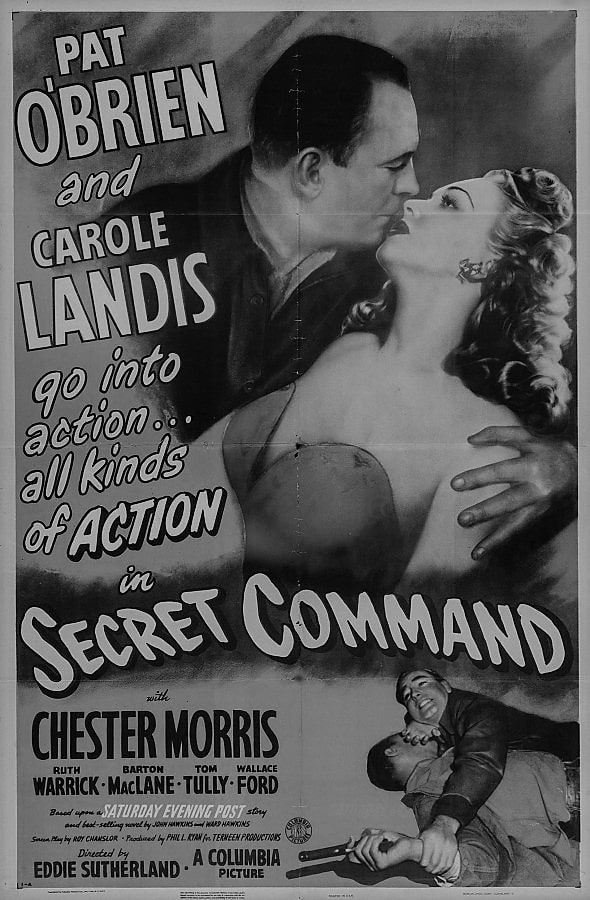 SECRET COMMAND (1944)
SECRET COMMAND (1944) (82 Min.) Genre: 1940 ACTION, Transfer Quality: A
Secret Command features Pat O'Brien as a onetime foreign correspondent in the wartime employ of the FBI. Under an assumed name, O'Brien goes to work at a shipyard, intending to keep both eyes open for potential saboteurs. To maintain the cover, O'Brien is given a "wife" (Carole Landis) and two children. When O'Brien's brother Chester Morris shows up, he can't comprehend the charade and nearly spills the beans to the Nazi spies O'Brien hopes to trap. Based on the short story The Saboteurs by John and Ward Hawkins, Secret Command offers a graying but still feisty Pat O'Brien doing what he does best.
Starring: Pat O'Brien, Carole Landis, Chester Morris, Ruth Warrick | Directed by: Edward Sutherland
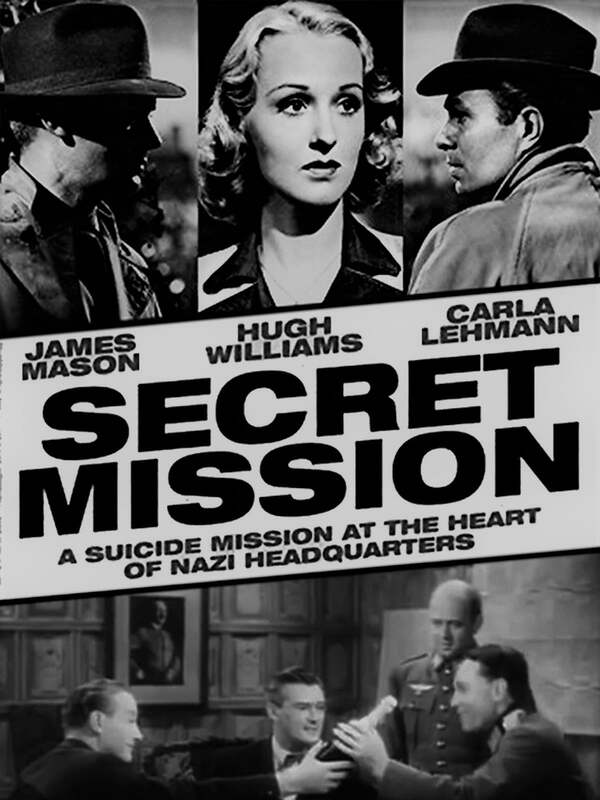 SECRET MISSION (1942)
SECRET MISSION (1942) (82 Min.) Genre: 1940 ACTION, Transfer Quality: B
In this WW II actioner, two British Intelligence agents and a French agent follow their leader into Nazi-occupied France to see how strong the invaders really are; unfortunately, the only way to get that information is to break into the German headquarters. They do so by pretending to be champagne vendors. As soon as the Nazis figure out their scheme, they begin chasing the Allied agents who are assisted by the French Resistance to make sure the information is given to the British who use it to destroy the German supplies and munitions. During their flight, one of the agents his killed; later his sister vows to do everything she can to stop those evil Nazis.
Starring: Hugh Williams, Carla Lehmann, James Mason, Roland Culver | Directed by: Harold French
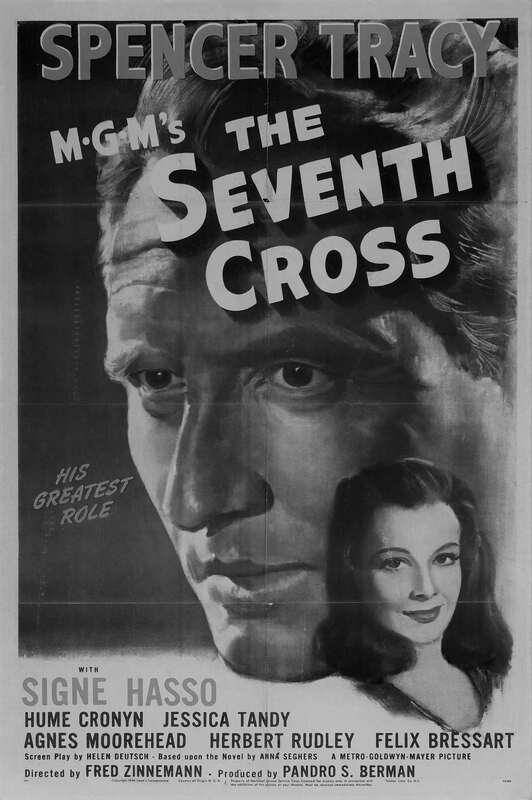 SEVENTH CROSS, THE (1944)
SEVENTH CROSS, THE (1944) (110 Min.) Genre: 1940 ACTION, Transfer Quality: A
Fred Zinnemann directed this World War II drama, considered one of the best anti-Nazi dramas produced by Hollywood during the war years. The story concerns seven prisoners in a Nazi concentration camp who manage to elude the guards and the Gestapo. The commandant, in a rage over their escape, nails crosses to seven trees, planning to crucify each of the prisoners as they are captured. Gradually six of the prisoners are discovered by the Gestapo and crucified. The one remaining escapee, George Heisler (Spencer Tracy), has become embittered and cynical after his years in the concentration camp. But as an assortment of friends and strangers help him elude the Gestapo, Heisler finally makes it to neutral Holland, his faith in mankind restored. Jessica Tandy had her first screen appearance as Liesel Roeder, the wife of Paul Roeder (Hume Cronyn, Tandy's real life husband), one of the friends who helps Heisler make his way to freedom. — Paul Brenner
Starring: Spencer Tracy, Signe Hasso, Hume Cronyn, Jessica Tandy, Agnes Moorehead, George Zucco | Directed by: Fred Zinnermann
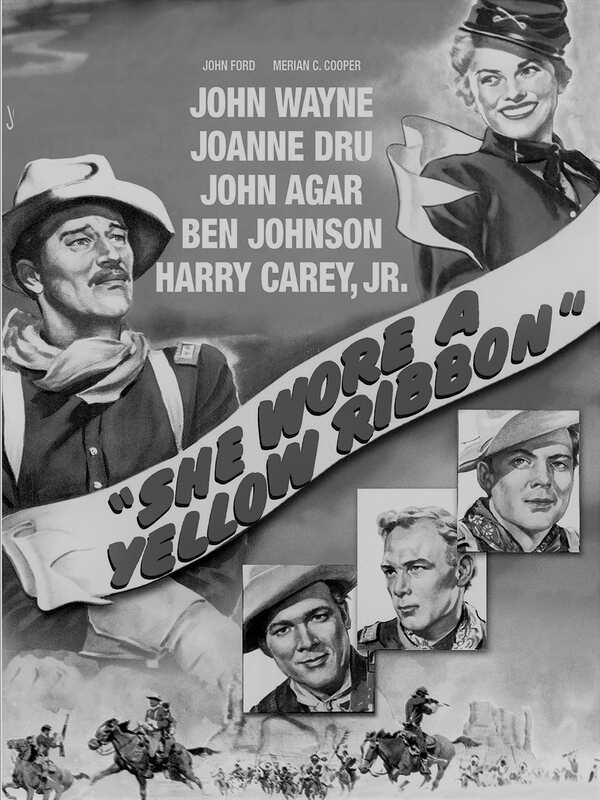 SHE WORE A YELLOW RIBBON (1949)
SHE WORE A YELLOW RIBBON (1949) (93 Min.) Genre: 1940 ACTION, Transfer Quality: A
The second of John Ford's "Cavalry Trilogy", She Wore a Yellow Ribbon is the only one of the three to be lensed in Technicolor. In an Oscar-calibre performance, 42-year old John Wayne plays sixtyish Cavalry Captain Nathan Brittles. In his last days before his compulsory retirement, Brittles must face the possibility of a full-scale attack from the Arapahos, fomented by the recent defeat of Custer and by double-dealing Indian agents. After a series of minor victories and major frustrations, Brittles decides to ride into the Arapaho camp, there to smoke a pipe of peace with his old friend, Chief Pony That Walks (Chief John Big Tree). Before he leaves, he is presented with his retirement present by his troops: a gold pocket watch, with the inscription "Lest We Forget"(Wayne's playing of this scene, barely holding back tears as he adjusts his spectacles to read the inscription, is one of his finest moments on film). Brittles is able to forestall an Indian attack, just in time for his official retirement. The film really ends here, but there are two more potential climaxes before the words THE END dissolve into view. The patchiness of the Frank Nugent/Lawrence Stallings screenplay (attributal to the fact that it is adapted from two different short stories) prevents She Wore a Yellow Ribbon from reaching the same lofty heights as the Ford/Wayne collaborations Fort Apache (1947) and Rio Grande (1949). The gratuitous offscreen narration of Irving Pichel is also rather distracting. Even so, Wayne's flawless performance, coupled with the supporting contributions of Ford's stock company (John Agar, Harry Carey Jr., Victor McLaglen et al) and the Academy Award-winning photography by Winston C. Hoch, automatically elevates She Wore a Yellow Ribbon to classic status. — Hal Erickson
Starring: John Wayne, Joanne Dru, John Agar, Ben Johnson, Victor McLaglen | Directed by: John Ford
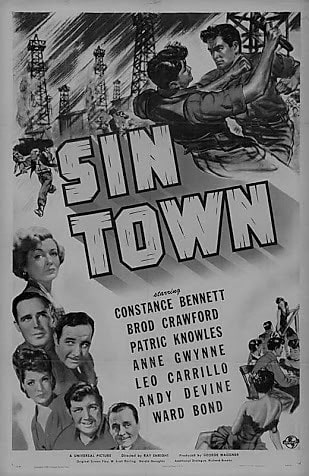 SIN TOWN (1942)
SIN TOWN (1942) (75 Min.) Genre: 1940 ACTION, Transfer Quality: B
Marlene Dietrich was supposed to have starred in Universal's Sin Town, but the script was not to her liking. Dietrich was replaced by Constance Bennett in the role of a glamorous suspect in a small-town murder. Broderick Crawford and Leo Carrillo costar as a couple of con men who must solve the killing of a newspaper publisher lest they be convicted of the crime. At 75 minutes, the film moves too quickly to pause for such niceties as motivation and logic, but few in the audiences of 1942 complained. Sin Town's three-person writing staff included Richard Brooks, later the director of such "A" pictures as Elmer Gantry and In Cold Blood (though he never did write for Marlene Dietrich).
Starring: Constance Bennett, Broderick Crawford, Anne Gwynne, Patric Knowles | Directed by: Ray Enright
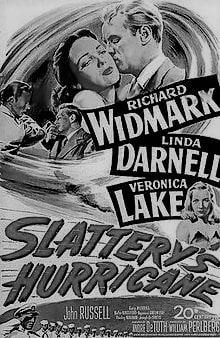 SLATTERY'S HURRICANE (1949)
SLATTERY'S HURRICANE (1949) (83 Min.) Genre: 1940 ACTION, Transfer Quality: B
Ex-navy pilot Slattery (Richard Widmark) works for a dope-smuggling ring. When he's not in the air, Slattery is making time with Dolores (Veronica Lake), the somewhat put-upon secretary of the ring's leader. Only upon meeting Aggie (Linda Darnell), the wife of his old navy buddy Hobson (John Russell), does Slattery entertain thoughts of changing his ways. As the film's title indicates, Slattery redeems himself during an outsized hurricane. Based on a story by Herman Wouk, Slattery's Hurricane was largely shot on location in Florida. The film represented a comeback attempt by Veronica Lake, who was then married to director Andre de Toth.
Starring: Richard Widmark, Linda Darnell, Veronica Lake, John Russell | Directed by: André De Toth
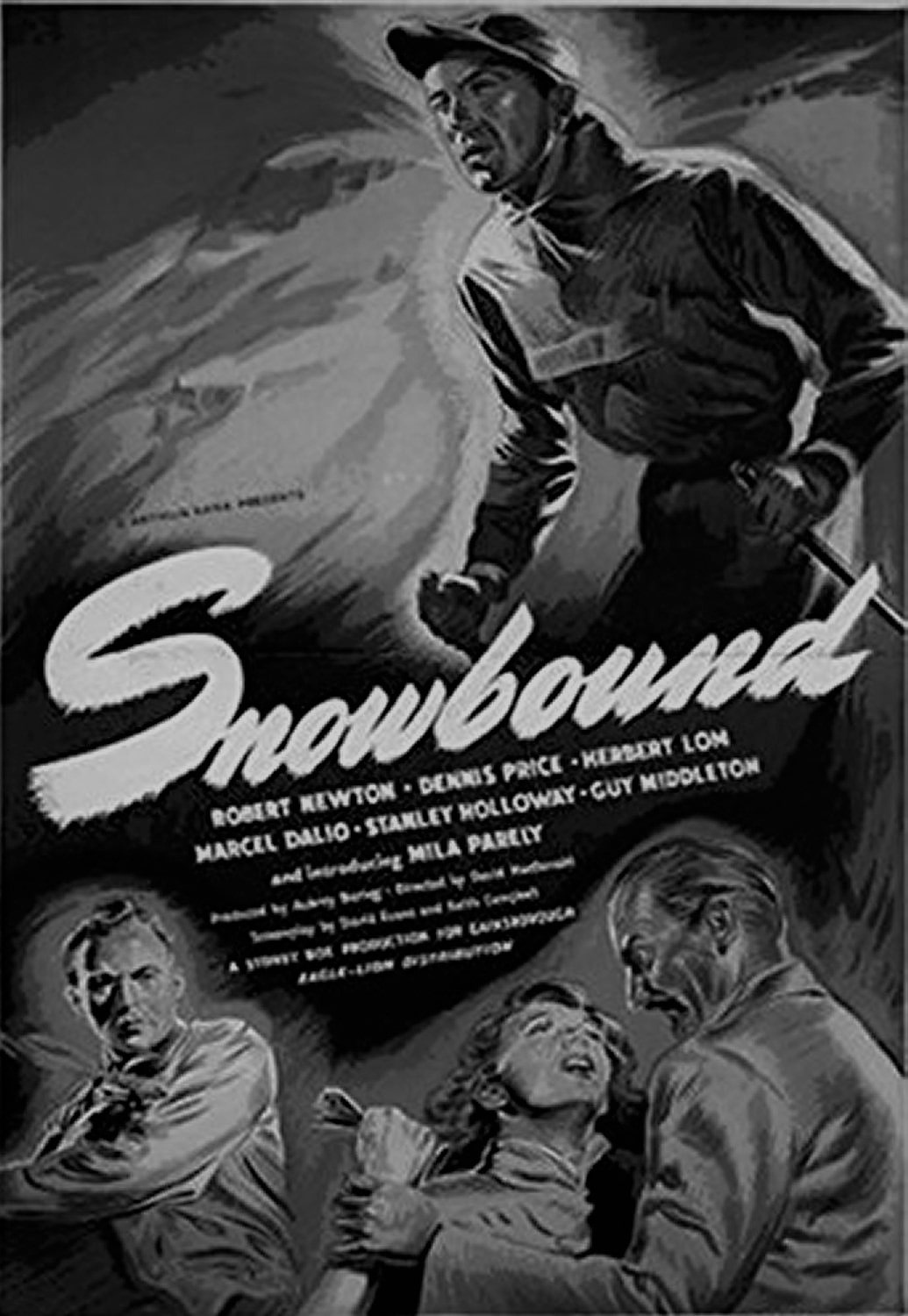 SNOWBOUND (1949)
SNOWBOUND (1949) (85 Min.) Genre: 1940 ACTION, Transfer Quality: B
A frequent visitor to the Late Late Show, the Anglo-American Snowbound is set in the frozen Alps. Robert Newton and Dennis Price head an expedition in search of a fortune of gold, stashed away by the Nazis in the last days of the war. Snowed into an old cabin, the men quickly get on one another's nerves. Just when tension reaches the boiling point, one of the party saves the day. He happens to be a movie screenwriter, who uses his cinematic knowhow to reach a solution to their dilemma. Snowbound is based on The Lonely Skier, a novel by Hammond Innes.
Starring: Robert Newton, Dennis Price, Herbert Lom, Marcel Dalio | Directed by: David MacDonald
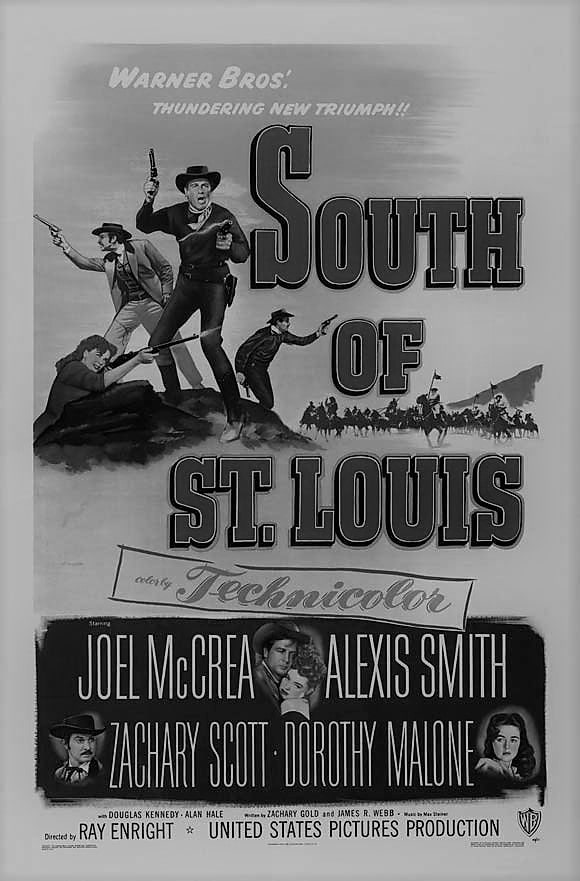 SOUTH OF ST. LOUIS (1948)
SOUTH OF ST. LOUIS (1948) (88 Min.) Genre: 1940 ACTION, Transfer Quality: B
Produced by Milton Sperling's United States Pictures, South of St. Louis was given a widespread release by Warner Bros. The story begins in the last days of the Civil War. Chased off their property by guerillas, ranching partners Kip Davis (Joel McCrea), Charlie Burns (Zachary Scott) and Lee Prince (Douglas Kennedy) head southward to seek out a new life. Davis and Burns go into the gun-running business, while Prince joins the Confederate Army. Kip and Charlie battle over the affections of saloon gal Rouge de Lisle (Alexis Smith), a turn of events that falls into the plans of rival gunrunner Luke Cottrell (Victor Jory). The three former friends soon find themselves enemies, and thereby hangs the plotline. Curiously, Dorothy Malone, cast as the "good" heroine, seems to be more worldly and cunning than hard-boiled temptress Alexis Smith. Originally filmed in Technicolor, South of St. Louis was for many years available only in its black-and-white, TV-print form.
Starring: Joel McCrea, Alexis Smith, Zachary Scott, Dorothy Malone | Directed by: Ray Enright
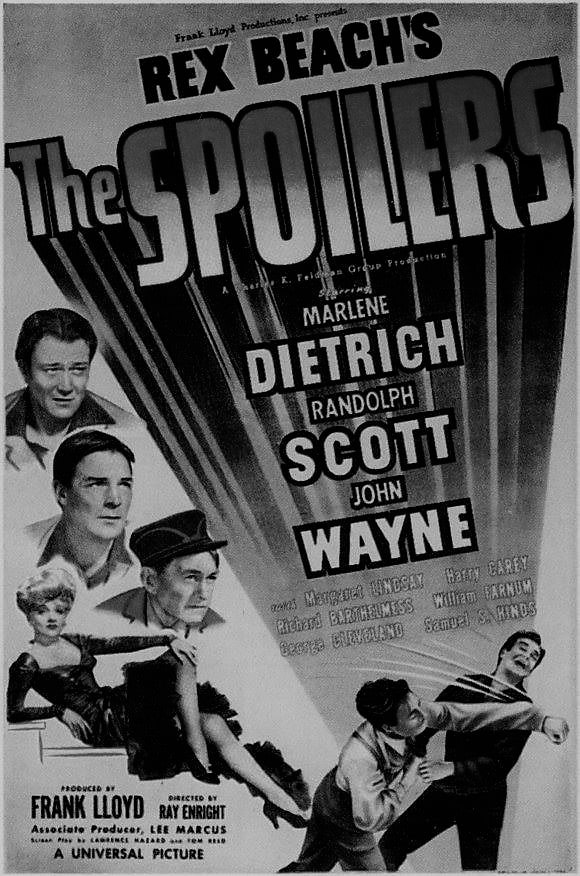 SPOILERS, THE (1942)
SPOILERS, THE (1942) (88 Min.) Genre: 1940 ACTION, Transfer Quality: A
The fourth of five movie versions of the rugged Rex Beach novel of the same name, 1942's The Spoilers stars Marlene Dietrich, John Wayne and Randolph Scott. The plot, involving the cheating of Alaska Gold Rush prospectors by a crooked gold commissioner, requires that Scott play a villain. Prospector Wayne is continually persecuted by Scott, who has the law on his side, until the two decide to settle their dispute man-to-man in a spectacular reel-long fistfight. La Dietrich plays a saloon hall gal who becomes the romantic bone of contention between the Wayne and Scott. William Farnum, who played John Wayne's role in the original 1914 filmization of The Spoilers, plays a key supporting role in this remake; also on hand in a cameo is poet Robert W. Service, of "The Shooting of Dan McGrew" fame. Listen for a cute inside joke at the beginning of the picture, invoking the name of co-producer Lee Marcus. — Hal Erickson
Starring: Marlene Dietrich, Randolph Scott, John Wayne, Richard Barthelmess | Directed by: Ray Enright
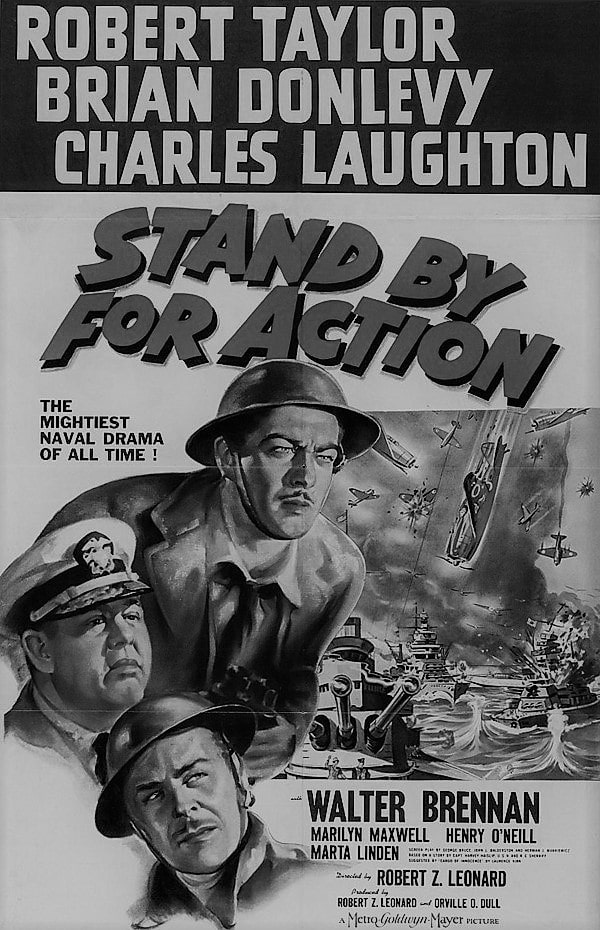 STAND BY FOR ACTION (1943)
STAND BY FOR ACTION (1943) (109 Min.) Genre: 1940 ACTION, Transfer Quality: A
Rear Admiral Stephen Thomas' (Charles Laughton) spoken tribute to "the finest Naval officer I knew" provides the framework for the wartime flag-waver Stand By For Action. Robert Taylor stars as Gregg Masterman, a flippant socialite who comes to realize his obligation to his country when he is called to active duty during WW II. Determined to get sea duty, Lt. Masterman is passed over by Admiral Thomas in favor of Lt. Cmdr. M. J. Roberts (Brian Donlevy), who, unlike our academy-trained hero, rose from the ranks to his present position of authority. Any differences between Masterman and Roberts are forgotten in the climactic attack against a formidable Japanese "super-battleship." Though there's precious little room for romance in this essentially all-male entertainment, Stand by for Action offers Robert Taylor a brief dalliance with up-and-coming MGM starlet Marilyn Maxwell.
Starring: Robert Taylor, Brian Donlevy, Marilyn Maxwell, Chill Wills, Charles Laughton | Directed by: Robert Z. Leonard
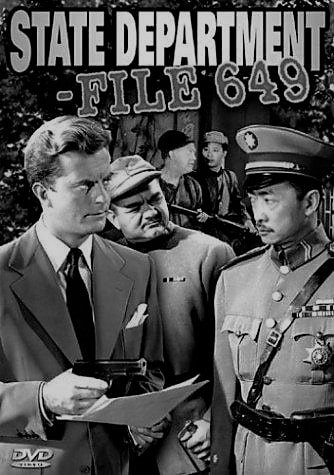 STATE DEPARTMENT - FILE 649 (1947)
STATE DEPARTMENT - FILE 649 (1947) (87 Min.) Genre: 1940 ACTION, Transfer Quality: B
Those scurrilous Chinese communists are up to their old tricks in the 1949 flagwaver State Department - File 649. William Lundigan plays Ken, an operative of the U.S. Foreign Service stationed in North China. Ken is one of several people trapped in a remote village by evil warlord Yun Usu (Richard Loo), who intends to sell his services to the highest bidder, be they Red or otherwise. Our hero manages to get a message out to the Free World before the film's operatically self-sacrificial climax. The characterizations are of the cardboard variety and the dialogue is straight out of Fu Manchu. Still, State Department - File 649 is a fascinating encapsulation of postwar political propaganda.
Starring: William Lundigan, Virginia Bruce, Richard Loo, Philip Ahn | Directed by: Sam Newfield
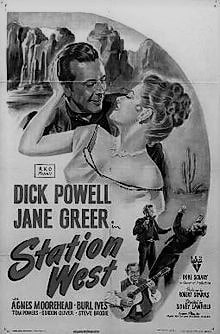 STATION WEST (1948)
STATION WEST (1948) (80 Min.) Genre: 1940 ACTION, Transfer Quality: A
Station West may look like a western, but it sure sounds like a contemporary film noir. Dick Powell stars as Haven, a government private investigator assigned to investigate the murders of two cavalrymen. Travelling incognito, Haven arrives in a small frontier outpost, where leggy saloon singer Charlie (Jane Greer) controls all illegal activities. After making short work of Charlie's burly henchman (Guinn Williams), Haven gets a job at her gambling emporium, biding his time and gathering evidence against the gorgeous crime chieftain Cast as a philosophical bartender, Burl Ives is afforded at least one opportunity to sing. Station West was one of a handful of RKO Radio films released to the 8-millimeter home-movie market in the mid-1970s. — Hal Erickson
Starring: Dick Powell, Jane Greer, Agnes Moorehead, Burl Ives | Directed by: Sidney Lanfield
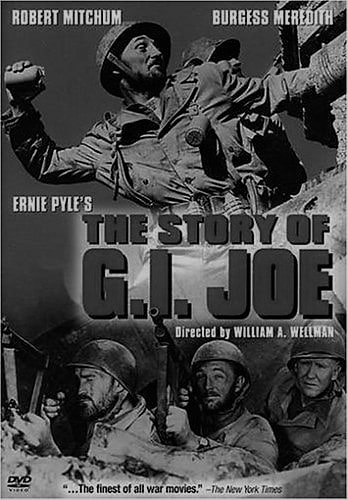 STORY OF G.I. JOE, THE (1945)
STORY OF G.I. JOE, THE (1945) (109 Min.) Genre: 1940 ACTION, Transfer Quality: A
The Story of G.I. Joe was based on the columns of Scripps-Howard war correspondent Ernie Pyle. Though already past 40, Pyle insists upon marching along with an Army infantry unit during the Italian campaign. He befriends several of the soldiers, including commanding officer Robert Mitchum (his breakthrough role), family man Freddie Steele and would-be romeo Wally Cassell. The "plot" of the film is moved forward by the progression of the war itself; basically, however, G.I. Joe is an anecdotal collection of comic, dramatic and tragic vignettes. Some of the more memorable moments include Freddie Steele's ongoing efforts to listen to a recording of his infant son's voice; Mitchum's casual reactions to his many field promotions; and a wedding ceremony which is "punctuated" by an air raid. Many infantry veterans consider The Story of GI Joe to be the single most realistic Hollywood war film of the 1940s, eschewing big stars, phony heroics and overblown battle sequences in favor of the everyday trials and tribulations of the humble foot soldier. Ironically, Ernie Pyle, who acted as technical adviser (when he wasn't busy on the front), was killed by an enemy sniper shortly before the release of this film. — Hal Erickson
Starring: Burgess Meredith, Robert Mitchum, Freddie Steele, Chris Cunningham | Directed by: William Wellman
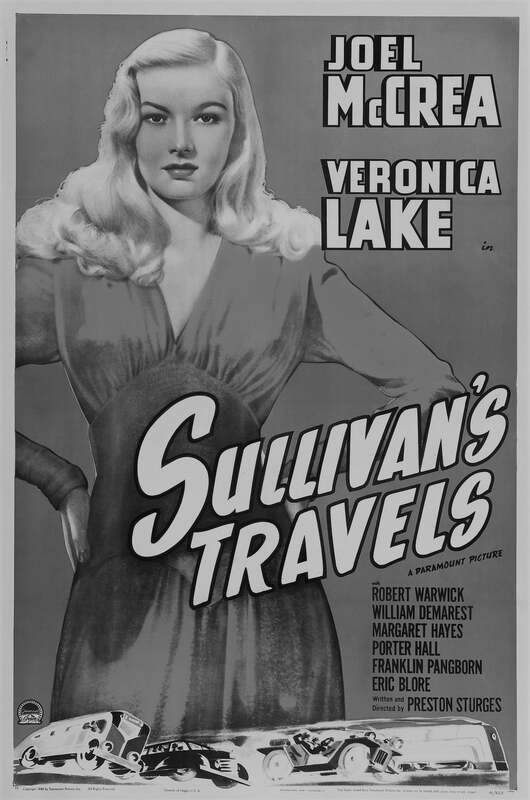 SULLIVAN'S TRAVELS (1941)
SULLIVAN'S TRAVELS (1941) (97 Min.) Genre: 1940 ACTION, Transfer Quality: A
In Preston Sturges' classic comedy of Depression America, filmmaker John L. Sullivan (Joel McCrea), fed up with directing profitable comedies like Ants in Your Plants of 1939, is consumed with the desire to make a serious social statement in his upcoming film, Oh, Brother, Where Art Thou?. Unable to function in the rarefied atmosphere of Hollywood, Sullivan decides to hit the road, disguised as a tramp, and touch base with the "real" people of America. But Sullivan's studio transforms his odyssey into a publicity stunt, providing the would-be nomad with a luxury van, complete with butler (Robert Grieg) and valet (Eric Blore). Advised by his servants that the poor resent having the rich intrude upon them, Sullivan escapes his retinue and continues his travels incognito. En route, he meets The Girl (Veronica Lake), a down-and-out failed actress. Experiencing first hand the scroungy existence of real-life hoboes, Sullivan returns to Hollywood full of bleeding-heart fervor. After first arranging for The Girl's screen test, he heads for the railyards, intending to improve the lot of the local rail-riders and bindlestiffs by handing out ten thousand dollars in five-dollar bills. Instead, Sullivan is cold-cocked by a tramp, who steals Sullivan's clothes and identification. When the tramp is run over by a speeding train, the world at large is convinced that the great John L. Sullivan is dead. Meanwhile, the dazed Sullivan, dressed like a bum with no identification on his person, is arrested and put to work on a brutal Southern chain gang. With its almost Shakespearean combination of uproarious comedy and grim tragedy, Sullivan's Travels is Sturges' masterpiece and one of the finest movies about movies ever made. — Hal Erickson
Starring: Joel McCrea, Veronica Lake, Robert Warwick, William Demarest | Directed by: Preston Sturgess
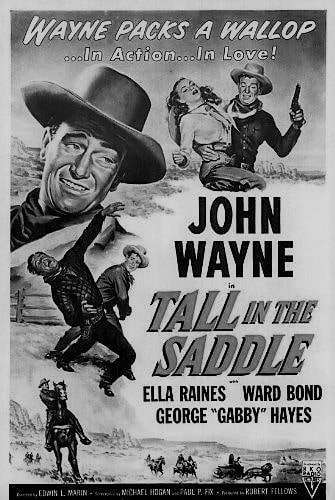 TALL IN THE SADDLE (1944)
TALL IN THE SADDLE (1944) (87 Min.) Genre: 1940 ACTION, Transfer Quality: A
John Wayne stars in this hard-driving oater which was co-written by character actor Paul Fix. Wayne plays Rocklin, a chauvinistic cowboy who arrives at the KC Ranch in Santa Inez to apply for a job as a foreman. But when he finds that the owner has died and that the ranch is now being run by two women — Clara Cardell (Audrey Long) and her aunt Miss Martin (Elizabeth Risdon) — he hardheadedly refuses to work for the women. But later on, Clara comes looking for Rocklin, asking his help in obtaining a letter from the town's corrupt judge Garvey (Ward Bond) that proves that Clara is old enough to be the legal owner of the ranch. Rocklin arrives in Garvey's office just after Garvey has burned the letter. The two tangle, with Rocklin sending Garvey crashing through his door. After the fight, Rocklin meets Arly Harolday (Ella Raines), another female ranch owner. Rocklin's views on women enrage Arly so much that she gets her stepfather (Donald Douglas) to hire him to work on her ranch, just so she can fire him. But in spite of Rocklin's primitive attitudes, Arly falls in love with him. Meanwhile, things are heating up as Garvey and other corrupt officials try to get control of the KC ranch. In order to get rid of Rocklin, a murder rap is pinned on him, forcing him to leave town. Hiding out at the KC ranch, he learns that he is the nephew of the ranch's dead owner and the rightful heir. Arly arrives to help Rocklin and to tell him that the murder Rocklin is accused of committing was actually committed by Arly's stepfather, who is working with Garvey and Miss Martin to get the deed to the ranch. With all that information under his cowboy hat, Rocklin cocks his gun and goes out to face the bad guys for a final showdown. — Paul Brenner
Starring: John Wayne, Ella Raines, Audrey Long, George "Gabby" Hayes | Directed by: Edwin Marin
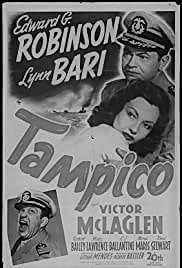 TAMPICO (1944)
TAMPICO (1944) (75 Min.) Genre: 1940 ACTION, Transfer Quality: A
Not to be confused with the 1971 film of the same name, this World War II espionage drama was the second to last film from German director Lothar Mendes and stars Edward G. Robinson as oil tanker captain Bart Manson. When Manson rescues the survivors of a torpedoed ship in the Gulf of Mexico, he meets the beautiful Kathy Hall (Lynn Bari) and the two fall in love. But when Manson's ship sinks under suspicious circumstances, Hall becomes the prime suspect due to her mysterious past and identity. Believing his beloved to be innocent of the crime, Manson sets out to uncover who the real culprit is. Tampico also stars Victor McLaglen and Robert Bailey.
Starring: Edward G. Robinson, Lynn Bari, Victor McLaglen, Marc Lawrence | Directed by: Lothar Mendes
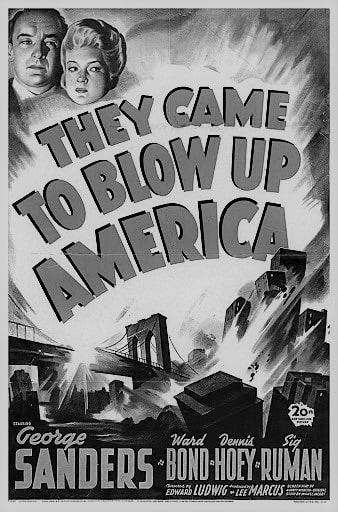 THEY CAME TO BLOW UP AMERICA (1943)
THEY CAME TO BLOW UP AMERICA (1943) (73 Min.) Genre: 1940 ACTION, Transfer Quality: B
In this provocative WW II drama, an American agent sneaks into a Nazi spy ring to learn the identities of certain double-agents. The hero works for the FBI, but was born in Germany and speaks the language like a native. First he assumes a dead spy's identity and in that guise, contacts the Nazi superiors. He is then placed aboard a U-boat and sent to the US. Things go well until his cover is blown. Fortunately, he manages to escape. He then is forced to appear in a lengthy court case to help convict the treacherous spies.
Starring: George Sanders, Anna Sten, Ward Bond, Sig Rumann | Directed by: Edward Ludwig
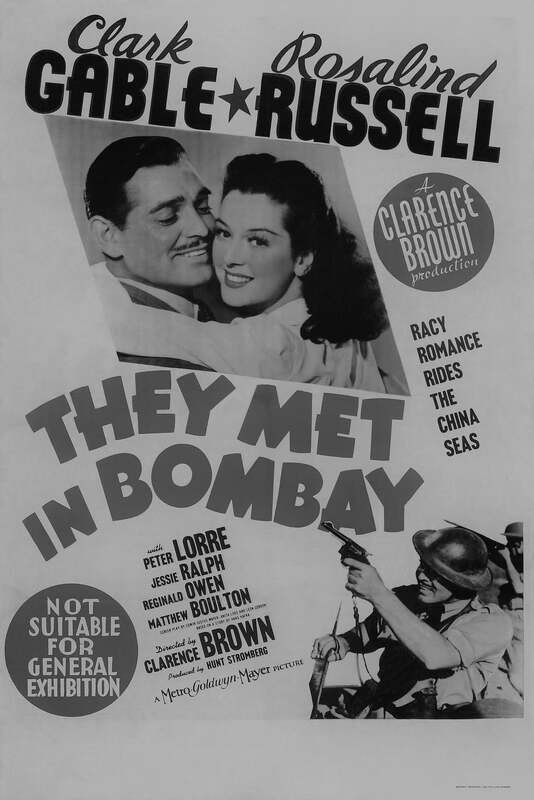 THEY MET IN BOMBAY (1941)
THEY MET IN BOMBAY (1941) (93 Min.) Genre: 1940 ACTION, Transfer Quality: A
They Met in Bombay is a typical MGM star vehicle, in which the leading players are called upon to carry a pencil-thin plotline on the force of sheer personality. Clark Gable and Rosalind Russell play Gerald Meldrick and Anya Von Duren, a pair of rival jewel thieves at large in India. Both parties are after the same prize, a priceless diamond owned by the Duchess of Beltravers (Jessie Ralph). To inveigle their way into the Duchess' confidence, Gerald poses as a Scotland Yard detective, while Anya pretends to be an aristocrat. After several reels of cross-purposes, hero and heroine decide to team up, keeping one step ahead of a diligent police inspector (Matthew Boulton) and mercenary freighter captain Chang (Peter Lorre). Both Gerald and Anya betray the nobler sides of their natures in the final reels, participating in a pitched battle against invading Japanese military forces
Starring: Clark Gable, Rosalind Russell, Peter Lorre, Jessie Ralph, Reginald Owen, Alan Ladd | Directed by: Clarence Brown
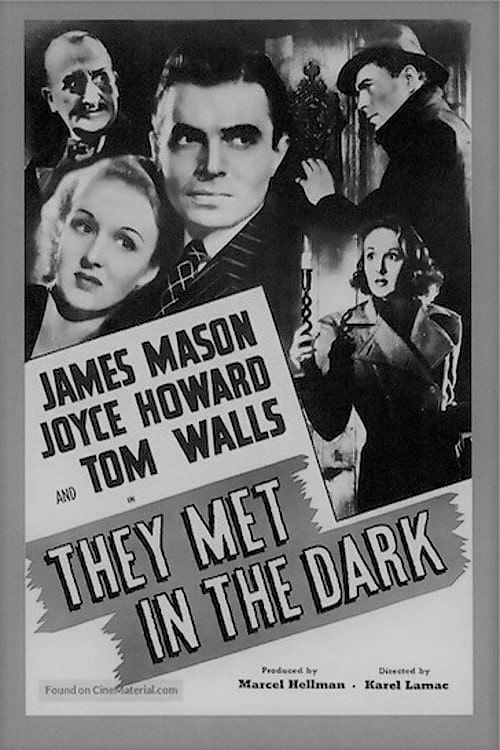 THEY MET IN THE DARK (1945)
THEY MET IN THE DARK (1945) (94 Min.) Genre: 1940 ACTION, Transfer Quality: B
In this WWII drama, James Mason plays naval commander Richard Heritage, who is distracted from his duties by a beautiful young woman who is secretly in cahoots with Nazi spies. By accident, Heritage lets her discover the sailing dates of American warships. The mistake costs the U.S. Navy a war ship and costs Heritage his post. After his court-martial, he sets off to find the girl who tripped him up and discovers that she has been killed. With the help of Laura Verity (Joyce Howard), he uncovers the Nazi spy ring, which is being operated under the guise of a British theatrical agency in the seaside town of Blackpool. The head of the outfit is master spy Christopher Child (Tom Walls), a fearsome villain. Heritage hopes to redeem himself and win the heart of Laura by defeating Child and his schemes.
Starring: James Mason, Joyce Howard, Tom Walls, David Farrar | Directed by: Karel Lamac
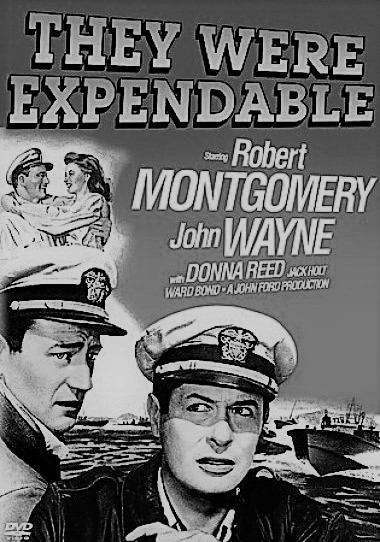 THEY WERE EXPENDABLE (1945)
THEY WERE EXPENDABLE (1945) (135 Min.) Genre: 1940 ACTION, Transfer Quality: A
John Brickley (Robert Montgomery) believes in PT boats, and as a lowly U.S. Navy lieutenant stationed in the Philippines, that makes him a radical thinker. "Your boats maneuver beautifully," an admiral (Charles Trowbridge) tells him, "but if I'm going into combat, I prefer something a little more substantial." The gently delivered but stinging dismissal stirs the resentment of Lt. "Rusty" Ryan (John Wayne), who tartly tells Brickley that he wants to be transferred to destroyers. The Pearl Harbor bombing makes transfer impossible, especially with the Japanese preparing to invade the islands. So Brickley and Ryan go to work, first as message carriers between the Philippines and Corregidor, then, finally, as ship hunters. They record some successes, but it's a doomed effort: The Americans are hopelessly outnumbered by the Japanese, and with almost all of the Pacific Fleet destroyed at Pearl Harbor, they know help won't arrive to save them. As the Japanese push the U.S. forces back, Brickley and Ryan and their crews hop from island to island, scrounging supplies and taking casualties but keeping up the fight. Just as it appears that they will be forced to fight on Corregidor against the Japanese, they get rescued; they're ordered home to promote their PT-boat successes, and they take the last plane out, hoping to return and avenge their defeats.
Starring: Robert Montgomery, John Wayne, Donna Reed, Cameron Mitchell, Ward Bond | Directed by: John Ford
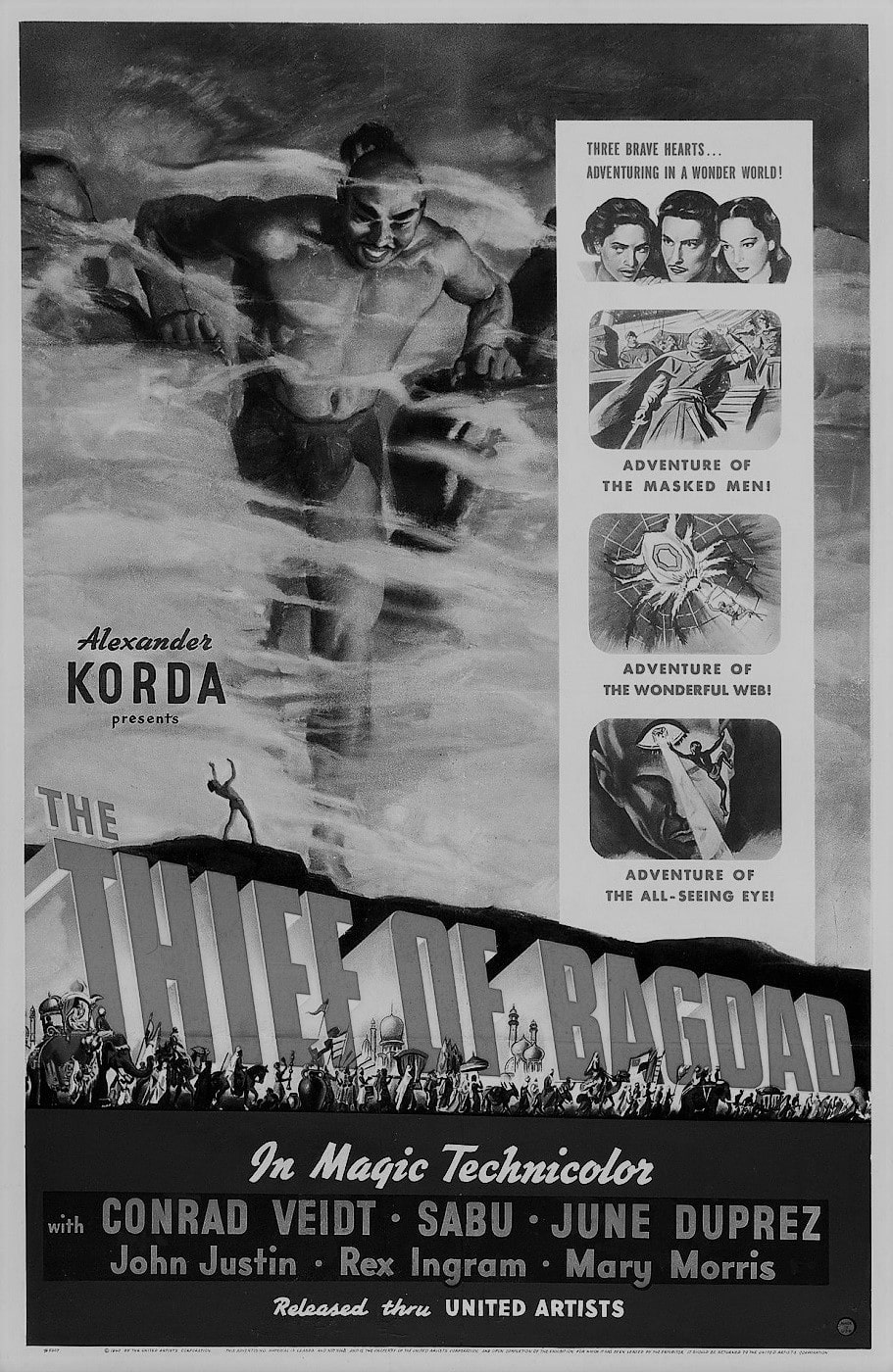 THIEF OF BAGDAD (1940)
THIEF OF BAGDAD (1940) (120 Min.) Genre: 1940 ACTION, Transfer Quality: A
The credited line-up of six directors-Ludwig Berger, Michael Powell, Tim Whelan, Zoltan Korda, William Cameron Menzies and Alexander Korda-should be indication enough that the 1940 The Thief of Baghdad is no ordinary sword and sandal romp. This Technicolor Arabian Nights extravaganza is widely regarded as one of the best (if not the best) fantasy films of the pre-computer technology era. The title character, named Abu (and engagingly played by Sabu), befriends a ragged young man named Ahmed (John Justin), who happens to be the rightful prince of Baghdad. The prince has been usurped by his evil vizier Jaffar (Conrad Veidt), who hopes to expand his power by marrying the breathtakingly lovely princess of Basra (June Duprez). To win the princess' hand, Jaffar keeps the childlike King (Miles Malleson, who cowrote the screenplay with Lajos Biro) preoccupied with mechanical toys. Once the king has promised the princess' hand to Jaffar, he is disposed of by one of those very toys, a multi-armed doll. The prince and Abu try to stop Jaffar, only to be thwarted by the vizier's magical powers: the prince is struck blind, while Abu is transformed into a dog. It wouldn't do for the bad guy to win this early in the game, thus Abu, returned to human form, finds himself on a deserted beach. Stumbling across an odd-looking bottle, Abu inadvertently releases the bottle's occupant: a gigantic, bombastic genie (Rex Ingram). The genie intends to crush Abu to death, but the wily thief tricks him back into the bottle. In exchange for his freedom, the genie agrees to grant Abu three wishes....and at this point, the film really begins to percolate, what with that "All Seeing Eye" gem, golden arrow and magic carpet added to the formula. If elements of The Thief of Baghdad sound familiar, it is because the film was used as the model for the 1992 Disney animated feature Aladdin. Even allowing for the much-improved technical wherewithal at Disney's disposal, nothing has dimmed the lustre of the multi-Oscar-winning The Thief of Baghdad, the sort of film that invariably elicits the reaction "They just don't make 'em like that any more!" — Hal Erickson
Starring: Conrad Veidt, Sabu, June Duprez, John Justin | Directed by: Ludwig Berger, Michael Powell, Tim Whelan
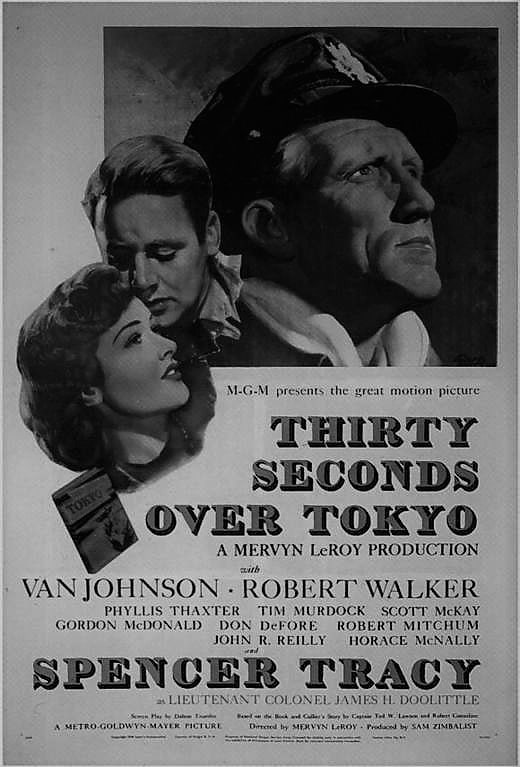 THIRTY SECONDS OVER TOKYO (1944)
THIRTY SECONDS OVER TOKYO (1944) (138 Min.) Genre: 1940 ACTION, Transfer Quality: A
Billed third, Spencer Tracy plays Lt. Col. James P. Doolittle, who led the bombing raid over Tokyo. Most of the footage concerns pilot Ted Lawson (Van Johnson), who loses a leg while escaping from China after the attack; other subplots concern the meticulous preparations for the raid, and the individual exploits of those Doolittle flyers who crashed into the sea or were captured by the Japanese. — Hal Erickson
Starring: Spencer Tracy, Van Johnson, Robert Mitchum, Robert Walker | Directed by: Mervyn LeRoy
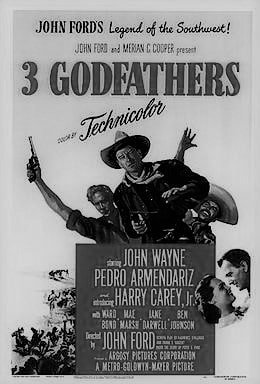 THREE GODFATHERS (1948)
THREE GODFATHERS (1948) (106 Min.) Genre: 1940 ACTION, Transfer Quality: A
John Ford had already directed one of the three previous film versions of Peter Kyne's novel under the title Marked Men (1919) with his mentor Harry Carey, a great cowboy star of the silent era who had recently died. It's not difficult to see how the story's sentimentality and Christian symbolism might have appealed to the director's sensibility. John Wayne stars as Bob Hightower, the leader of a trio of thieves who rob a bank in Arizona and take off with the posse of Sheriff Buck Sweet (Ward Bond) in close pursuit. Although they need to stop to water their horses and care for the wounds of Abilene (Harry Carey Jr.), their accurate suspicion that the sheriff is laying an ambush for them at the Mohave water tank leads the gang toward the more distant Terrapin tanks. However, en route, they're waylaid by a terrible sandstorm which scatters their horses. Forced to go on foot, they come upon a lone woman (Mildred Natwick) in a covered wagon who is about to give birth. She dies in childbirth, but not before extracting a promise from the three to take care of her child. Under a blistering sun, they head for New Jerusalem
Starring: John Wayne, Pedro Armendariz, Harry Carey Jr., Ward Bond, Ben Johnson | Directed by: John Ford
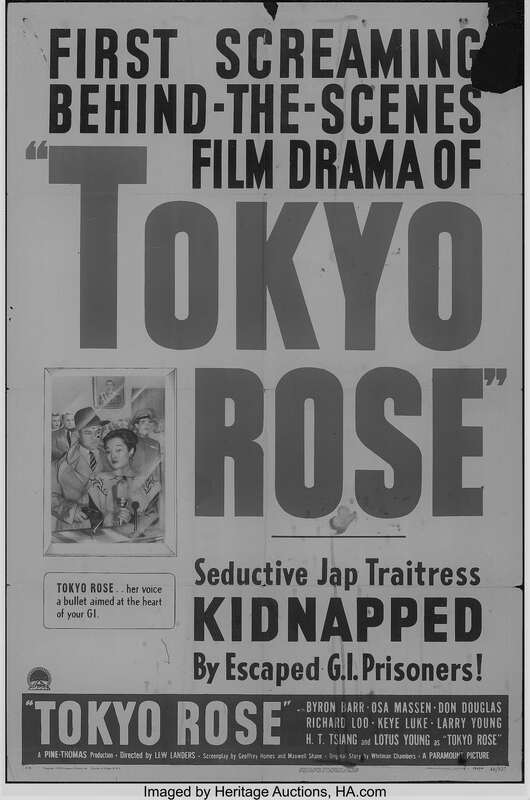 TOKYO ROSE (1945)
TOKYO ROSE (1945) (69 Min.) Genre: 1940 ACTION, Transfer Quality: B
Tokyo Rose is a standard wartime melodrama with the slight advantage of topicality. Lotus Long plays the title role, an American-educated Japanese woman broadcasting enemy propaganda to American troops. Captured GI Pete Sherman (Byron Barr) is one of a group of POWS slated to be interviewed on Tokyo Rose's radio program. Instead of advising his comrades to surrender (as ordered), Sherman uses his innate Yankee knowhow to hoist the treacherous oriental deejay on her own petard. Managing to make his escape, Sherman hooks up with the Japanese Underground, convincing anti-militarist Charlie Otani (Keye Luke) to aid in a kidnapping plot aimed at Tokyo Rose. This story wasn't any more believable when it was done on TV's Hogan's Heroes.
Starring: Lotus Long, Byron Barr, Osa Massen, Richard Loo | Directed by: Lew Landers
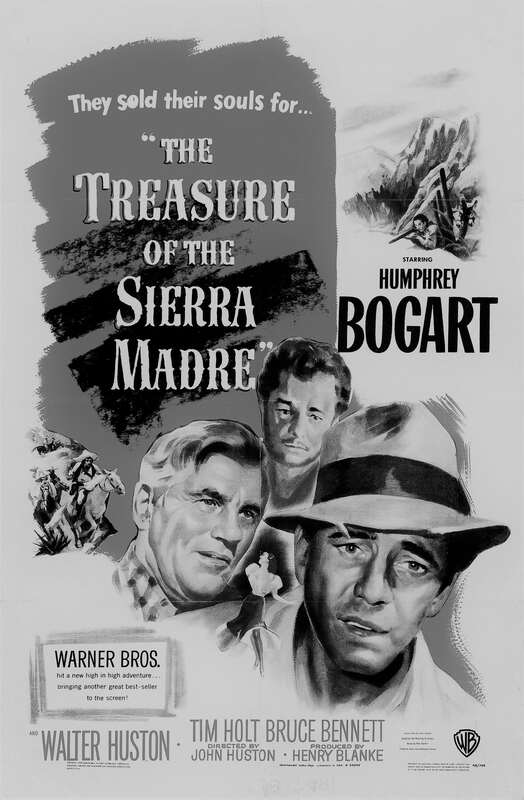 TREASURE OF THE SIERRA MADRE, THE (1948)
TREASURE OF THE SIERRA MADRE, THE (1948) (126 Min.) Genre: 1940 ACTION, Transfer Quality: A
John Huston's 1948 treasure-hunt classic begins as drifter Fred C. Dobbs (Humphrey Bogart), down and out in Tampico, Mexico, impulsively spends his last bit of dough on a lottery ticket. Later on, Dobbs and fellow indigent Curtin (Tim Holt) seek shelter in a cheap flophouse and meet Howard (Walter Huston), a toothless, garrulous old coot who regales them with stories about prospecting for gold. Forcibly collecting their pay from their shifty boss, Dobbs and Curtin combine this money with Dobbs's unexpected windfall from a lottery ticket and, together with Howard, buy the tools for a prospecting expedition. Dobbs has pledged that anything they dig up will be split three ways, but Howard, who's heard that song before, doesn't quite swallow this. As the gold is mined and measured, Dobbs grows increasingly paranoid and distrustful, and the men gradually turn against each other on the way toward a bitterly ironic conclusion. The Treasure of the Sierra Madre is a superior morality play and one of the best movie treatments of the corrosiveness of greed. Huston keeps a typically light and entertaining touch despite the strong theme, for which he won Oscars for both Director and Screenplay, as well as a supporting award for his father Walter, making Walter, John, and Anjelica Huston the only three generations of one family all to win Oscars. — Hal Erickson
Starring: Humphrey Bogart, Walter Huston, Tim Holt, Bruce Bennett, Ann Sheridan | Directed by: John Huston
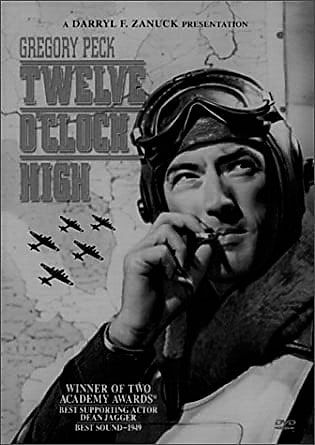 TWELVE O'CLOCK HIGH (1949)
TWELVE O'CLOCK HIGH (1949) (132 Min.) Genre: 1940 ACTION, Transfer Quality: A
How much can a man give? When the U.S. 8th Army Air Force 918th Bombardment group is ordered on their fourth harrowing mission in four hard days, Brigadier General Frank Savage (Gregory Peck) demands "maximum effort." The bombers are forced to fly lower, to fly farther, and to test themselves — overspent and fatigued — right up until death's door. When their dedicated colonel speaks out in their defense, Savage mercilessly takes over command — an officer should not sympathize with his men. The Brigadier General will compel the 918th to stop pitying itself and to hone its morale in the face of danger. Yet, as the men grow colder due to Savage's orders and the missions bring them closer to their crucial German targets, the officer learns the practical impossibility of raising the confidence of young men while also sending them to their deaths. He begins to understand that it is the burden of command that makes even the toughest leader sympathetic. Eventually caring for his men above all else, it is Savage who is forced to carry the hardships of "maximum effort" — asking himself, how much can a man take? — Aubry Anne D'Arminio
Starring: Gregory Peck, Hugh Marlowe, Gary Merrill, Dean Jagger | Directed by: Henry King
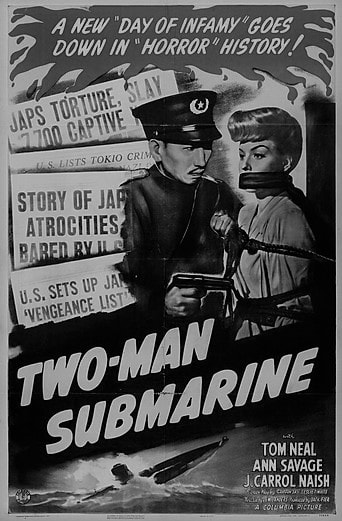 TWO-MAN SUBMARINE (1944)
TWO-MAN SUBMARINE (1944) (62 Min.) Genre: 1940 ACTION, Transfer Quality: B
Columbia's Two-Man Submarine was predicated on a then-new Japanese invention, designed to maneuver in waters where no normal-sized sub could go. Naturally, the Japanese themselves could not be the heroes of this 1944 film, so Tom Neal and Lloyd Bridges play the good guys, while ersatz Nipponese-like Abner Biberman and George Lynn were the villains. The plot concerns Axis efforts to steal the secret of a revolutionary new drug, which is being developed on a remote South Pacific island. The Japanese utilize a two-man sub to infiltrate the island, but the Americans rather unconvincingly turn the tables on them in the last reel. Ann Savage, Tom Neal's future vis-a-vis in Detour, provides the largely unnecessary female interest.
Starring: Tom Neal, Ann Savage, J. Carrol Naish, Abner Biberman | Directed by: Lew Landers
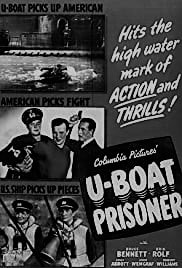 U-BOAT PRISONER (1944)
U-BOAT PRISONER (1944) (65 Min.) Genre: 1940 ACTION, Transfer Quality: C
All-purpose Columbia contractee Bruce Bennett (formerly college athlete Herman Brix) was awarded a leading role in the wartime "B" U-Boat Prisoner. Bennett plays merchant seaman Archie Gibbs, who manages to survive when his ship is torpedoed by a German submarine. Disguising himself in the uniform of a dead Nazi spy, Gibbs is picked up by the Nazi U-boat. He manages to convince the German sailors that he's the spy, and in this guise he tries to rescue a group of captured Allied scientists. Already unbelievable, U-Boat Prisoner journeys into the Twilight Zone during the climax, with Gibbs single-handedly incapacitating the submarine crew and rescuing the prisoners. Incredibly, the film was based on a true story, written by the real-life Archie Gibbs!
Starring: Bruce Bennett, Erik Rolf, John Abbott, John Wengraf | Directed by: Lew Landers
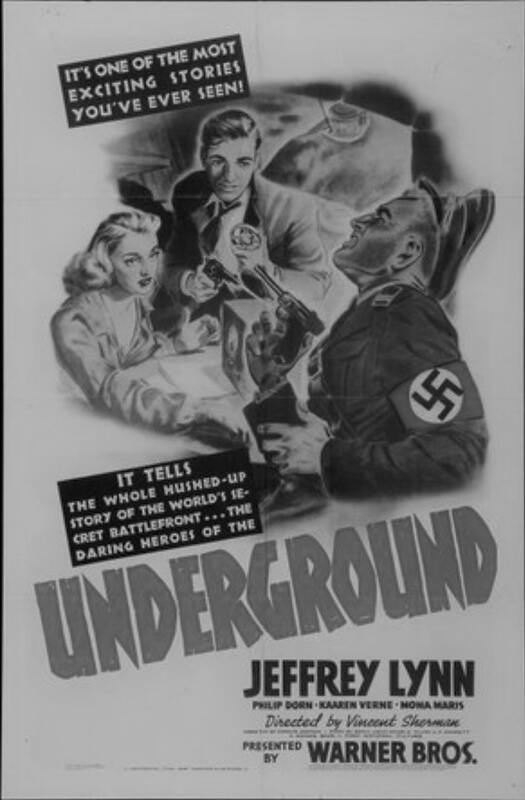 UNDERGROUND (1941)
UNDERGROUND (1941) (95 Min.) Genre: 1940 ACTION, Transfer Quality: A
Underground is an average Warner Bros. suspenser, given a boost by its unrelenting portrayal of Nazis as verminous scum—several months before America's entry into World War II. Jeffrey Lynn plays an impressionable young European who is intoxicated by the "glories" of National Socialism. Lynn's brother, Philip Dorn, is on the opposite side of the fence as an announcer for an underground Resistance radio station. At first scornful of his brother's activities, Lynn soon learns that Hitler isn't the saint he believed him to be—especially after several of his friends are liquidated by the Gestapo. Lynn belatedly joins his brother's cause and, at the cost of his own life, helps the Resistance thwart a band of fifth columnists. Underground is a solid piece of film craftsmanship, lacking only the big star names that would have made it a box-office hit.
Starring: Jeffrey Lynn, Philip Dorn, Kaaren Verne, Mona Maris | Directed by: Vincent Sherman
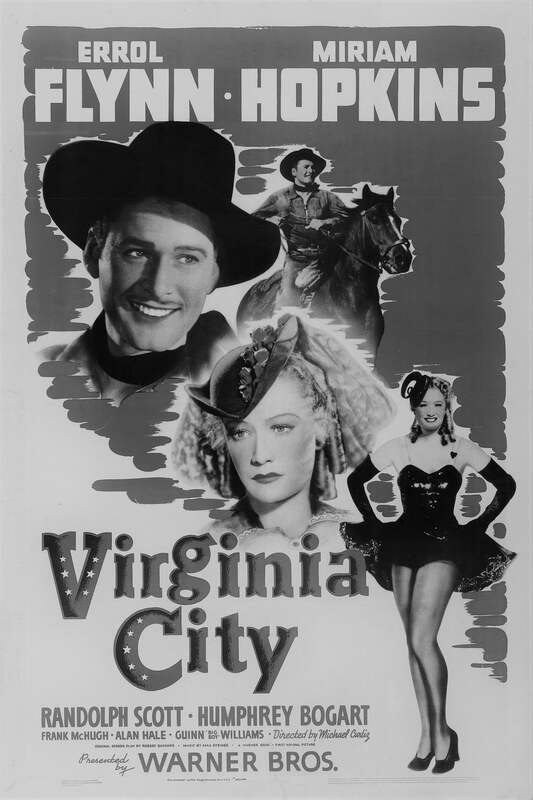 VIRGINIA CITY (1940)
VIRGINIA CITY (1940) (121 Min.) Genre: 1940 ACTION, Transfer Quality: A
Promoted as a follow-up to the popular 1939 western Dodge City (which, indeed, was left wide open for a sequel in its closing scenes), Virginia City bears only surface resemblance to the earlier film. Indeed, the only discerning links between the two pictures are the western setting and the presence in the cast of Errol Flynn, Frank McHugh, Alan Hale and Guinn "Big Boy" Williams. After escaping from a Confederate prison during the Civil War, Union officer Flynn vows to stop a $5,000,000 gold shipment from reaching the South. He is challenged by Southern sympathizer Randolph Scott, whose interest in the gold is patriotic, and by outlaw Humphrey Bogart (complete with a Mexican accent that wouldn't convince a cow), whose interests are purely mercenary. Adding spice to the proceedings is Miriam Hopkins as a dance hall chanteusse-cum-Confederate spy. Better in individual components than sum total, Virginia City pleased the crowds in 1940, assuring that the Tasmanian-born Errol Flynn would continue appearing in westerns in the future
Starring: Errol Flynn, Miriam Hopkins, Randolph Scott, Humphrey Bogart, Frank McHugh, Alan Hale | Directed by: Michael Curtiz
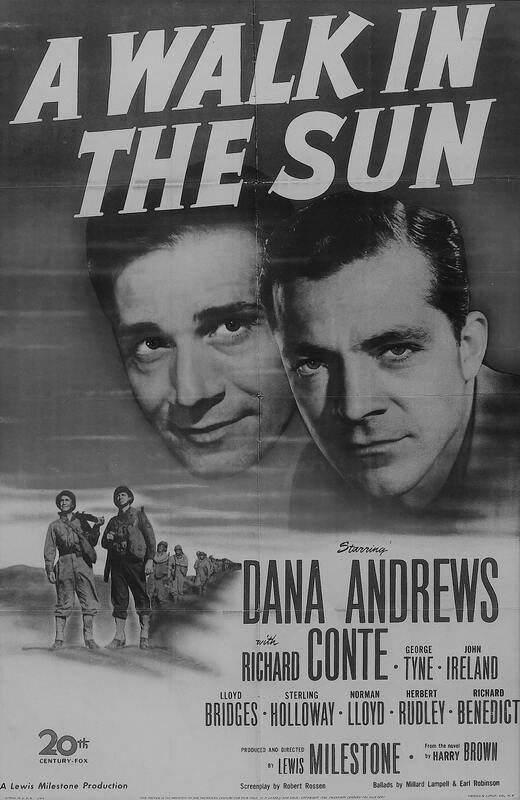 WALK IN THE SUN, A (1946)
WALK IN THE SUN, A (1946) (117 Min.) Genre: 1940 ACTION, Transfer Quality: A
Harry Brown's honest, unsentimental WW2 novel A Walk in the Sun has been effectively adapted for the screen by Robert Rossen. Dana Andrews stars as Sgt. Tyne, a platoon squad leader in Italy who ends up assuming command of his platoon after a series of deaths. As they prepare to attack an isolated Nazi-held farmhouse, each of the infantymen reveals his true character as he dwells upon his background and contemplates the job at hand. The film's effectiveness lies in the non-cliched characterizations by a carefully chosen all-male cast. Huntz Hall of "East Side Kids" fame is particularly good in a scene wherein he argues over whether the human body or the leaf is the most complicated natural structure. Director Lewis Milestone's use of a ballad to link the action predates High Noon by some seven years. — Hal Erickson
Starring: Dana Andrews, Richard Conte, John Ireland, George Tyne, Norman Lloyd | Directed by: Lewis Milestone
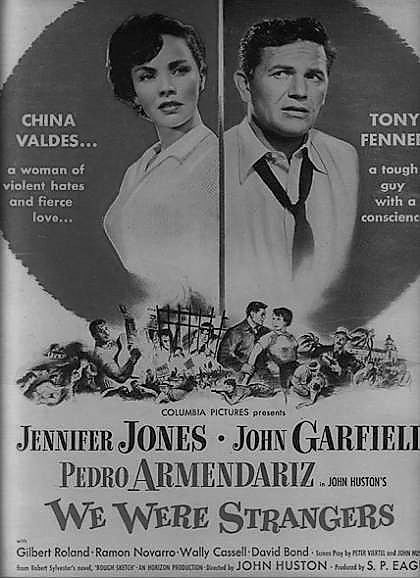 WE WERE STRANGERS (1949)
WE WERE STRANGERS (1949) (106 Min.) Genre: 1940 ACTION, Transfer Quality: B
Set in the Cuba of 1933, We Were Strangers stars John Garfield as revolutionary-minded Tony Fenner. A member of an underground movement dedicated to toppling the despotic Machado regime, Tony supervises the booby-trapping of a cemetery where several top Cuban officials are planning to converge for a state funeral. Also involved in the assassination scheme is China Valdes (Jennifer Jones), whose brother had been executed by the government. As often happens in a John Huston film, the best-laid schemes of the protagonists go tragically awry. Based on a portion of Robert Sylvester's novel Rough Sketch, We Were Strangers was scripted by frequent Huston collaborator Peter Viertel. The film has the curious distinction of being lambasted by both the left-wing and right-wing critics in the U.S. Audiences were likewise underwhelmed, compelling Columbia Pictures to withdraw the film from distribution early on.
Starring: Jennifer Jones, John Garfield, Pedro Armendáriz, Gilbert Roland | Directed by: John Huston
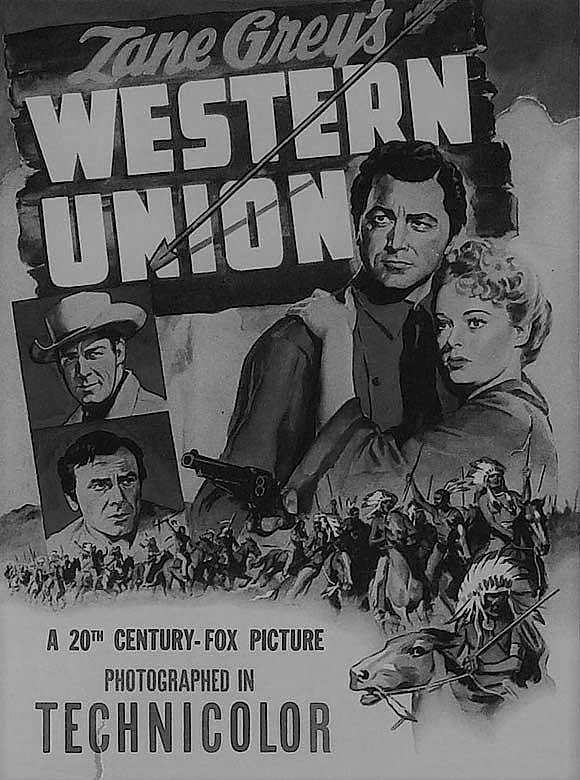 WESTERN UNION (1941)
WESTERN UNION (1941) (95 Min.) Genre: 1940 ACTION, Transfer Quality: A
20th Century-Fox's Western Union was loosely based on a story by Zane Grey. The basic historical facts behind the connecting of telegraph wires between Omaha and Salt Lake City serve as a backdrop for a fictional story straight out of Manhattan Melodrama. Randolph Scott and Barton MacLane are cast as brothers who pursue wildly divergent paths in adulthood: Scott, an ex-outlaw, goes to work for Western Union, while MacLane remains a criminal, leading a concerted effort to sabotage the telegraph company. The Indians, too often merely villains in films of this nature, are treated with relative sympathy. When they do attack the whites, it is principally because they have been falsely accused of crimes committed by MacLane and his bunch. Western Union was the second Technicolor western effort from director Fritz Lang; the first was the equally popular Jesse James. — Hal Erickson
Starring: Robert Young, Randolph Scott, Dean Jagger, Virginia Gilmore, Barton MacLane | Directed by: Fritz Lang
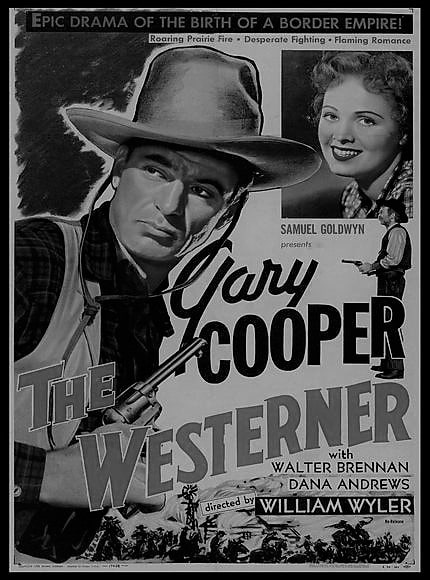 WESTERNER, THE (1940)
WESTERNER, THE (1940) (100 Min.) Genre: 1940 ACTION, Transfer Quality: A
The town of Vinegaroon, TX, is the home to Judge Roy Bean (Walter Brennan), who calls himself "The Only Law West of the Pecos." Bean keeps a saloon, where he also conducts trials, using his office to get fat on fines and the seizure of property, and hanging most of those who get in his way, sometimes more than one a day. Cole Hardin (Gary Cooper) is a saddle-tramp brought in on a charge of stealing a horse belonging to Bean's chief stooge, Chickenfoot (Paul Hurst). Hardin's conviction by a jury made up of Bean's hangers-on (with the undertaker, played with low-key comic zeal by Charles Halton, waiting eagerly for the verdict and the hanging) seems certain, despite his contention that he bought the horse from another man, until Hardin recognizes the judge's obsession with the English actress Lily Langtry. Hardin feigns having seen, met, and known Miss Langtry intimately, and he cons the judge into delaying the death sentence until Hardin can send for a lock of the actress' hair that he supposedly has in El Paso - that's long enough for the real horse thief (Tom Tyler) to show up and get killed. By the time the dust settles, the judge, for all of his warped sense of justice and corrupt nature, finds himself genuinely liking Hardin as something of a kindred spirit, as bold and daring as he was in his youth, and feeling something like friendship for him. But Bean also tries to shoot Hardin when he decides to cast his lot with the homesteaders, led by Jane-Ellen Mathews (Doris Davenport) and her father, Caliphet (Fred Stone), who have been fighting for survival against Bean and his cattle-rancher allies every step of the way. Hardin tries to appeal to the better nature within the judge, and also saves him from an attempted lynching, but when that fails, and a corn crop is burned and Mr. Mathews killed, he sees no choice but to take action. He gets an arrest warrant sworn out and is deputized by the county sheriff. Taking Bean in his saloon or anywhere in his town (renamed Langtry by the judge, in honor of the actress) is impossible, but then it's announced that Lily Langtry will be appearing in Texas, a long day's ride away from Bean's stronghold. The judge, dressed in his full Civil War regalia and with his men in tow, rides to see the performance while Hardin gets ready to try and arrest him. The kind of climactic shoot-out that follows has been done to death in the decades since, but it was something new and revelatory in a Western in 1940, and still plays beautifully on a dramatic level, capturing in full the complexity of the relationship between these two antagonists. - Bruce Eder
Starring: Gary Cooper, Walter Brennan, Forrest Tucker,Doris Davenport | Directed by: William Wyler
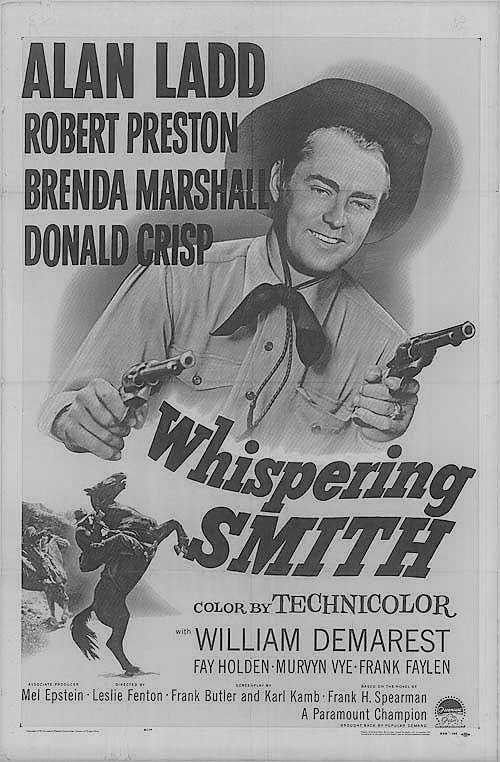 WHISPERING SMITH (1948)
WHISPERING SMITH (1948) (88 Min.) Genre: 1940 ACTION, Transfer Quality: A
This fact -based western follows a soft-spoken railroad detective (Alan Ladd) as he brings a murderous ring of robbers to justice and rekindles an old flame. — Sandra Brennan
Starring: Alan Ladd, Robert Preston, Brenda Marshall, Donald Crisp | Directed by: Leslie Fenton, Mel Epstein
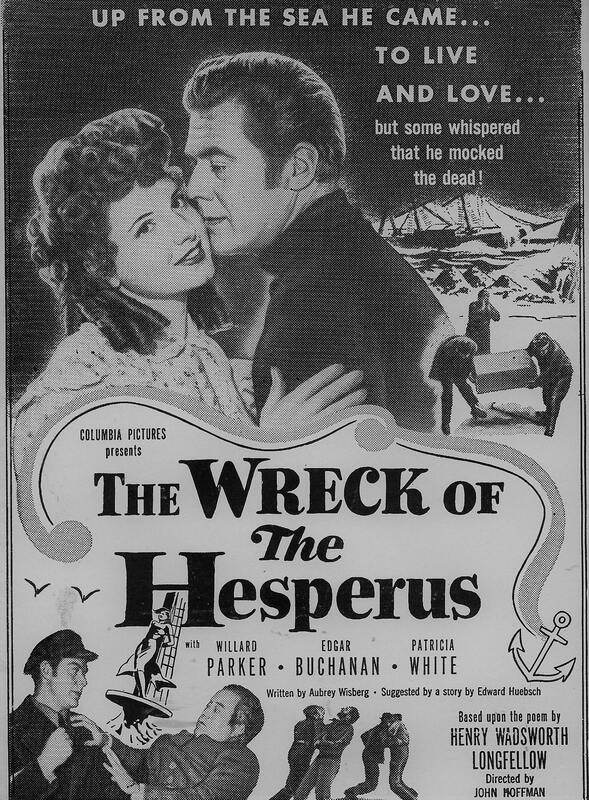 WRECK OF THE HESPERUS (1948)
WRECK OF THE HESPERUS (1948) (70 Min.) Genre: 1940 ACTION, Transfer Quality: B
Suggested by a story by Edward Huebsch and "based upon the poem by Henry W. Longfellow," screenplay-writer Aubrey Wisberg came up with close to what is the only western set in 1830's New England, including a contrived jail break; law-abiding citizens fighting the forces of evil (vigilantes); gang fights and, even, a cross-country chase on horseback of a stagecoach. Utilizing Huebsch's suggestion and Longfellow's basis and more than an uncredited little-bit from "Reap the Wild Wind," Wisberg has a seafaring captain, who has been beached for losing his ship, Willard Parker, going into the salvage-from-wrecked-vessels business with lovable old Edgar Buchanan---keep an eye on him---and leading the fight against the erection of a lighthouse that would tend to slow down the salvage business more than somewhat. Parker's brother dies in a shipwreck, and he begins to suspect that his lovable old partner may be causing the ship wrecks by misdirecting the vessels. (Not unlike unlovable Raymond Massey in "Reap the Wild Wind.") Tain't long ere Parker and Buchanan are on opposite sides.
Starring: Edgar Buchanan, Paul E. Burns, Paul Campbell, Jeff Corey | Directed by: John Hoffman
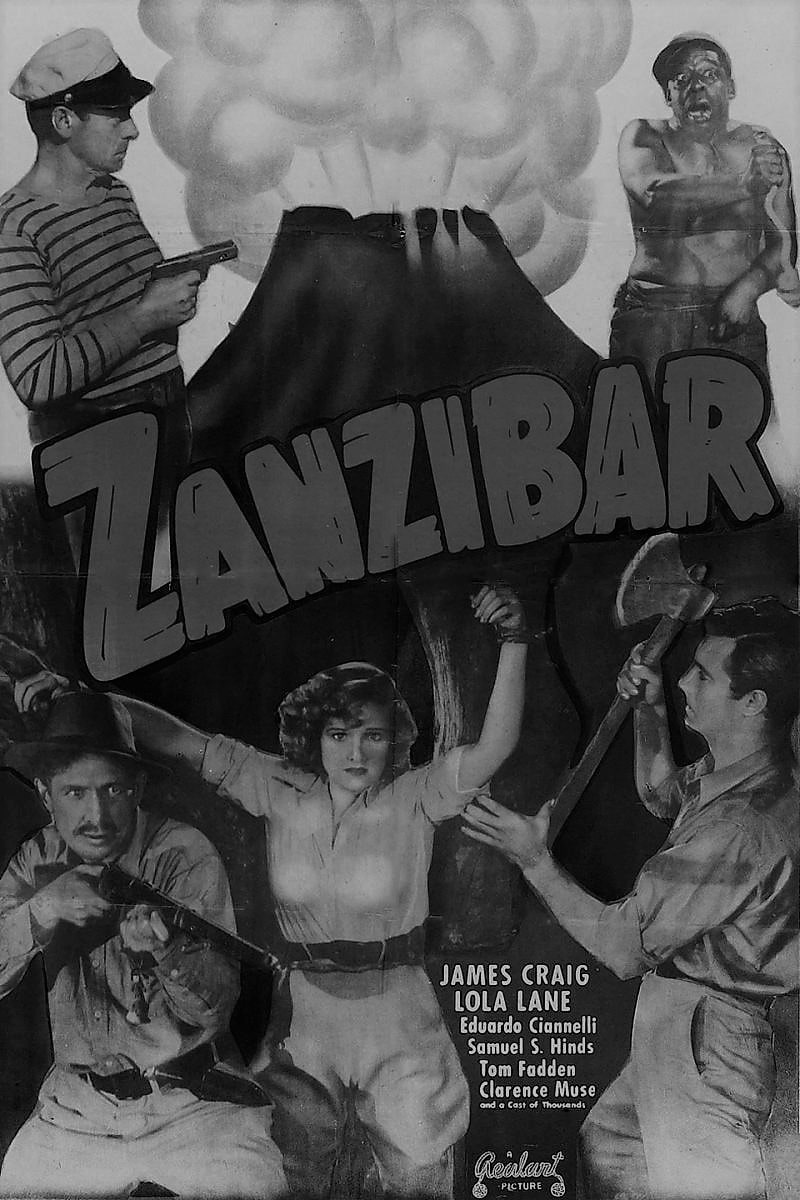 ZANZIBAR (1940)
ZANZIBAR (1940) (70 Min.) Genre: 1940 ACTION, Transfer Quality: B
Lola Lane and James Craig play explorers working on behalf of the British government. Lane and Craig have been assigned to venture deep into the wilds of Africa to retrieve the sacred skull of a long-deceased Sultan. Whoever possesses the skull will have total control over the native population—which is why several sinister gentlemen with Teutonic accents (America wasn't in the war yet, so no nationalities, please) also covet the skull. A reactivated volcano provides a rip-roaring climax for this Universal second feature. Zanzibar was based on a pair of short stories written by Maurice Tombragel and Maurice Wright, who collaborated on the screenplay.
Starring: Lola Lane, James Craig, Eduardo Ciannelli, Tom Fadden | Directed by: Harold D. Schuster

